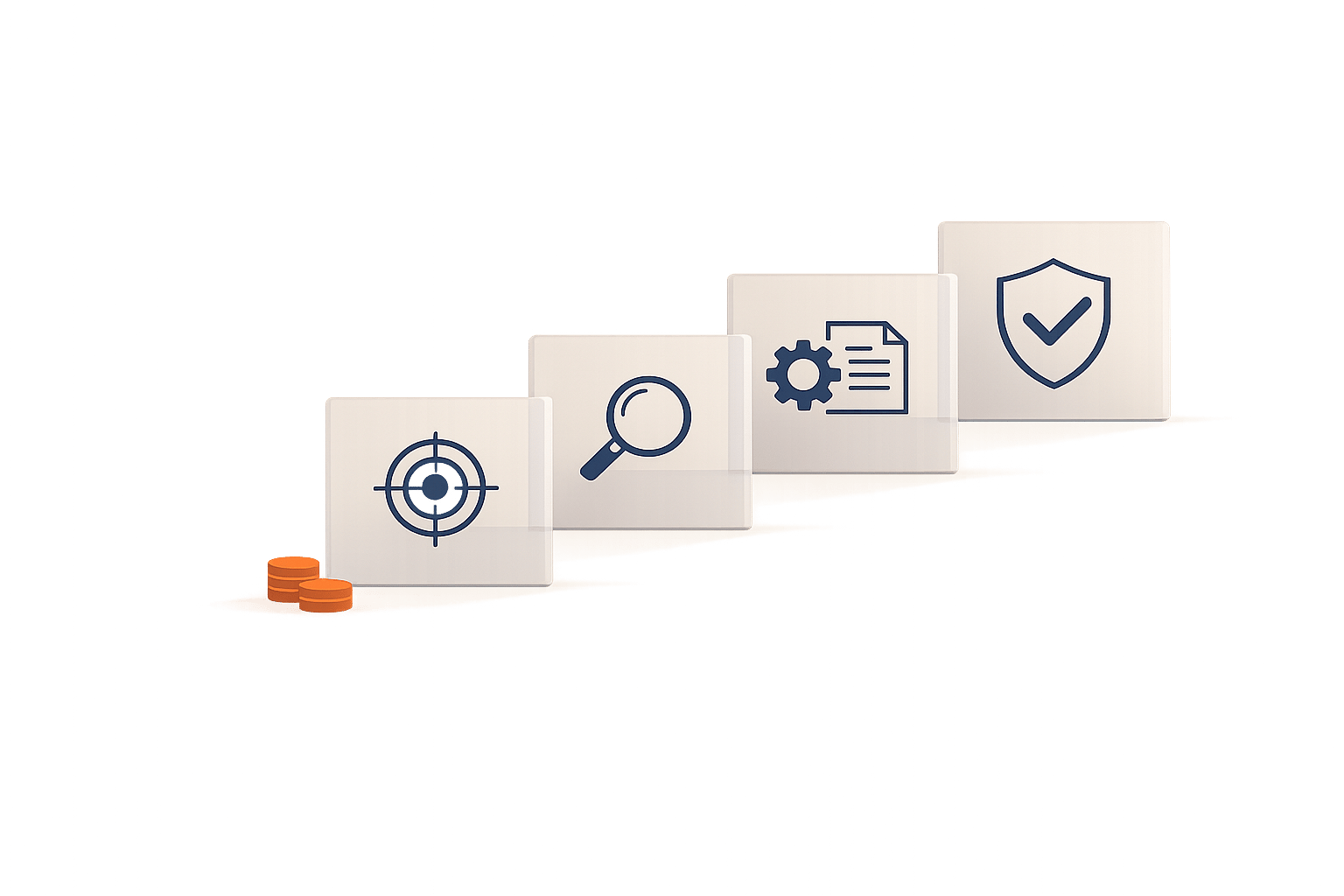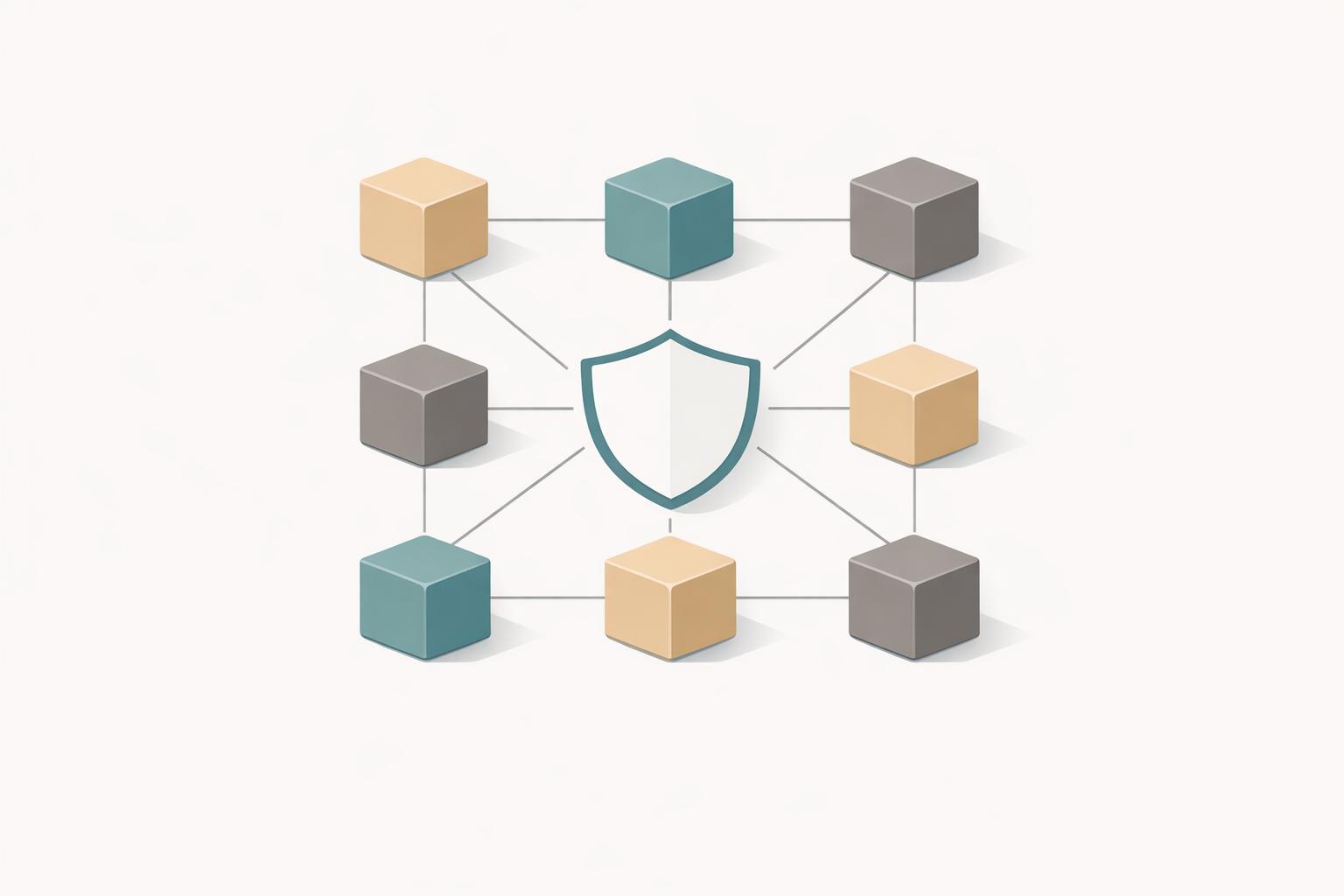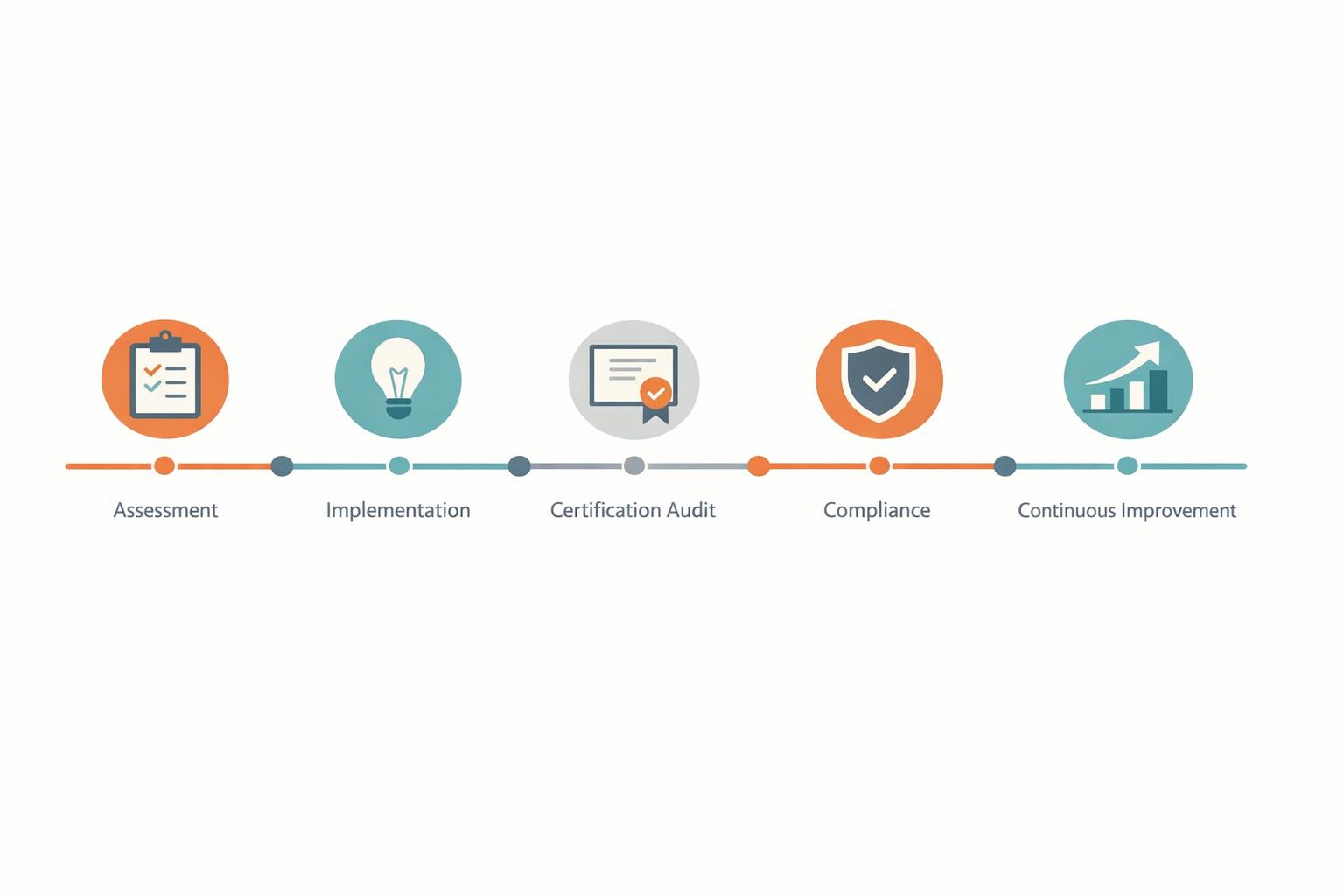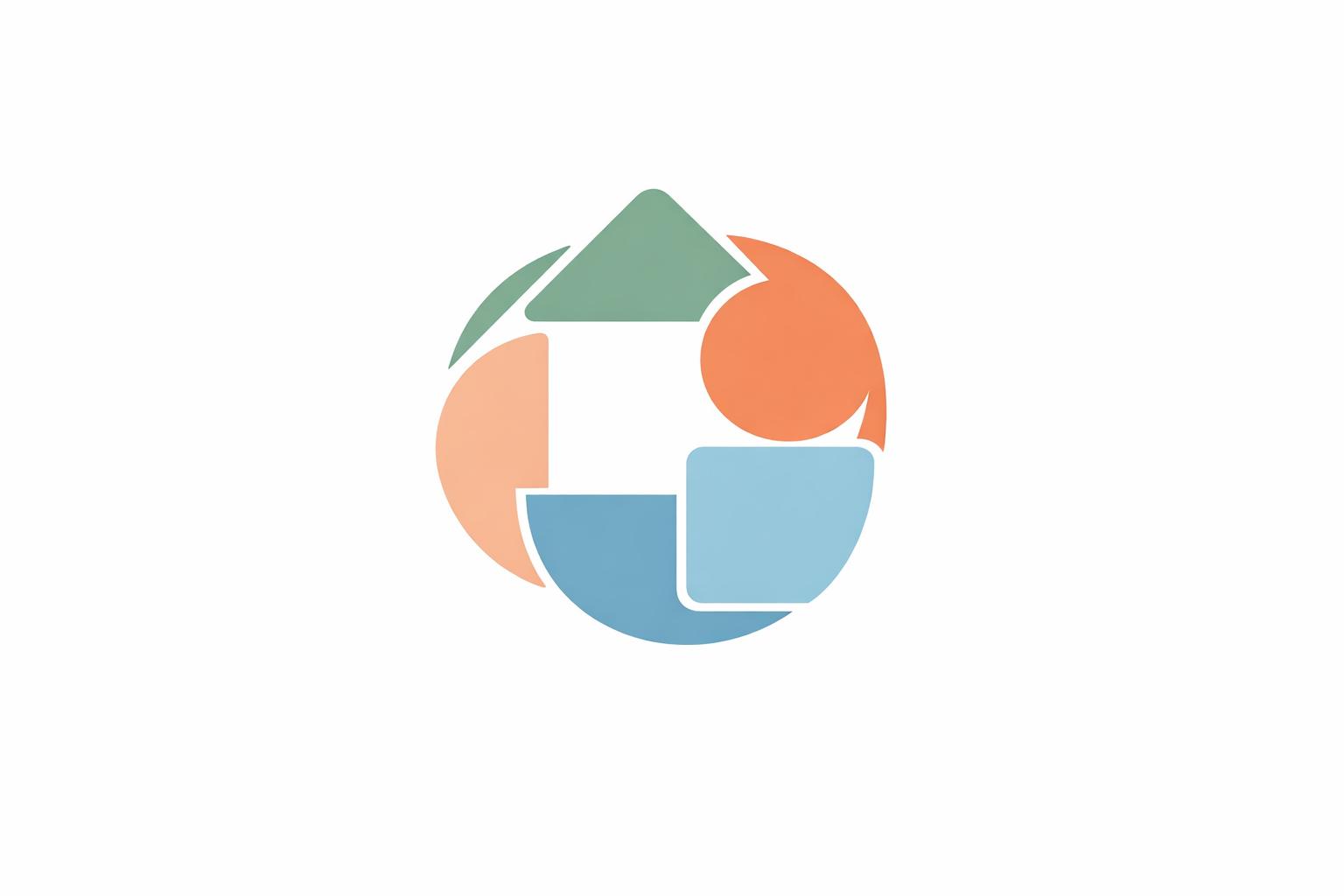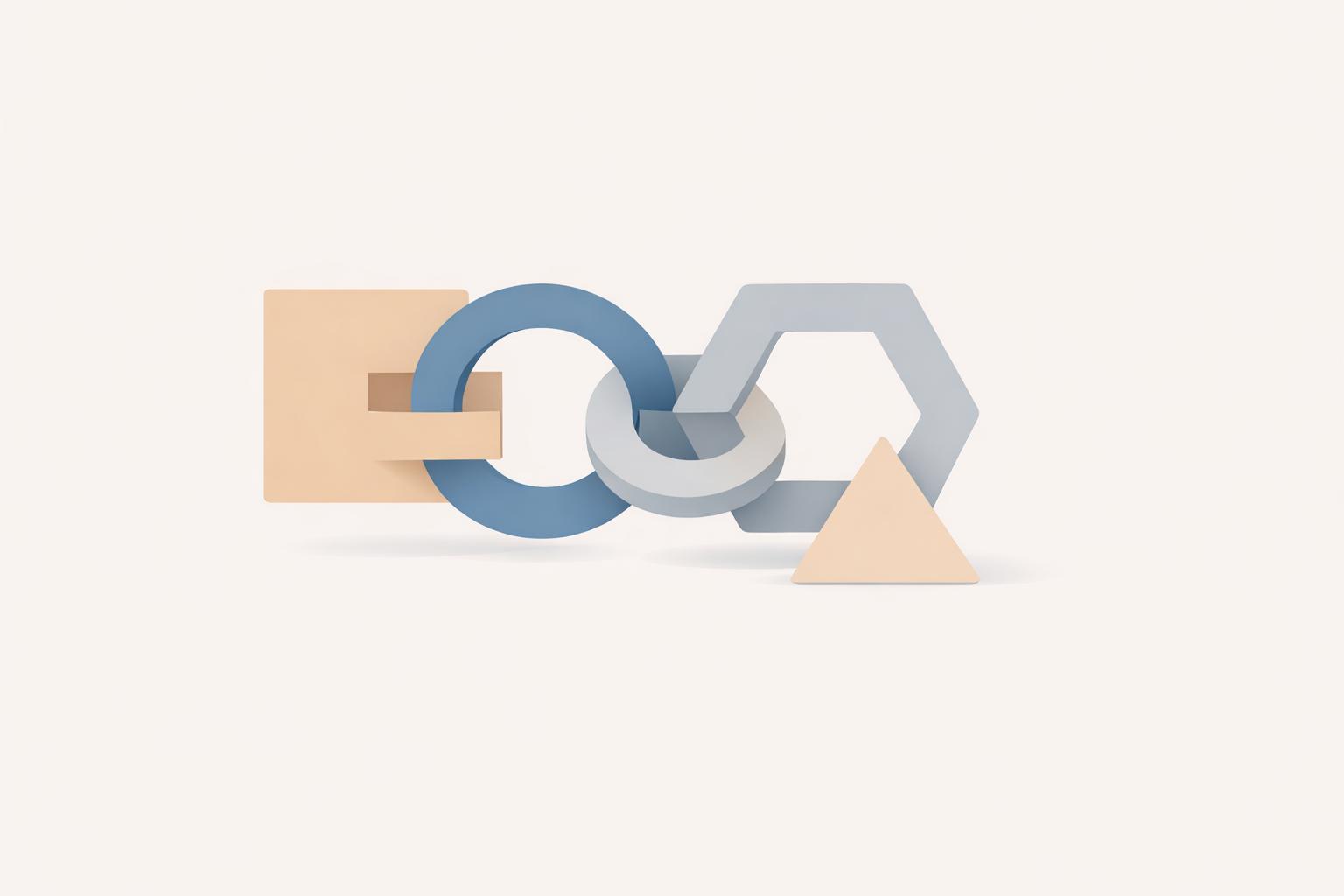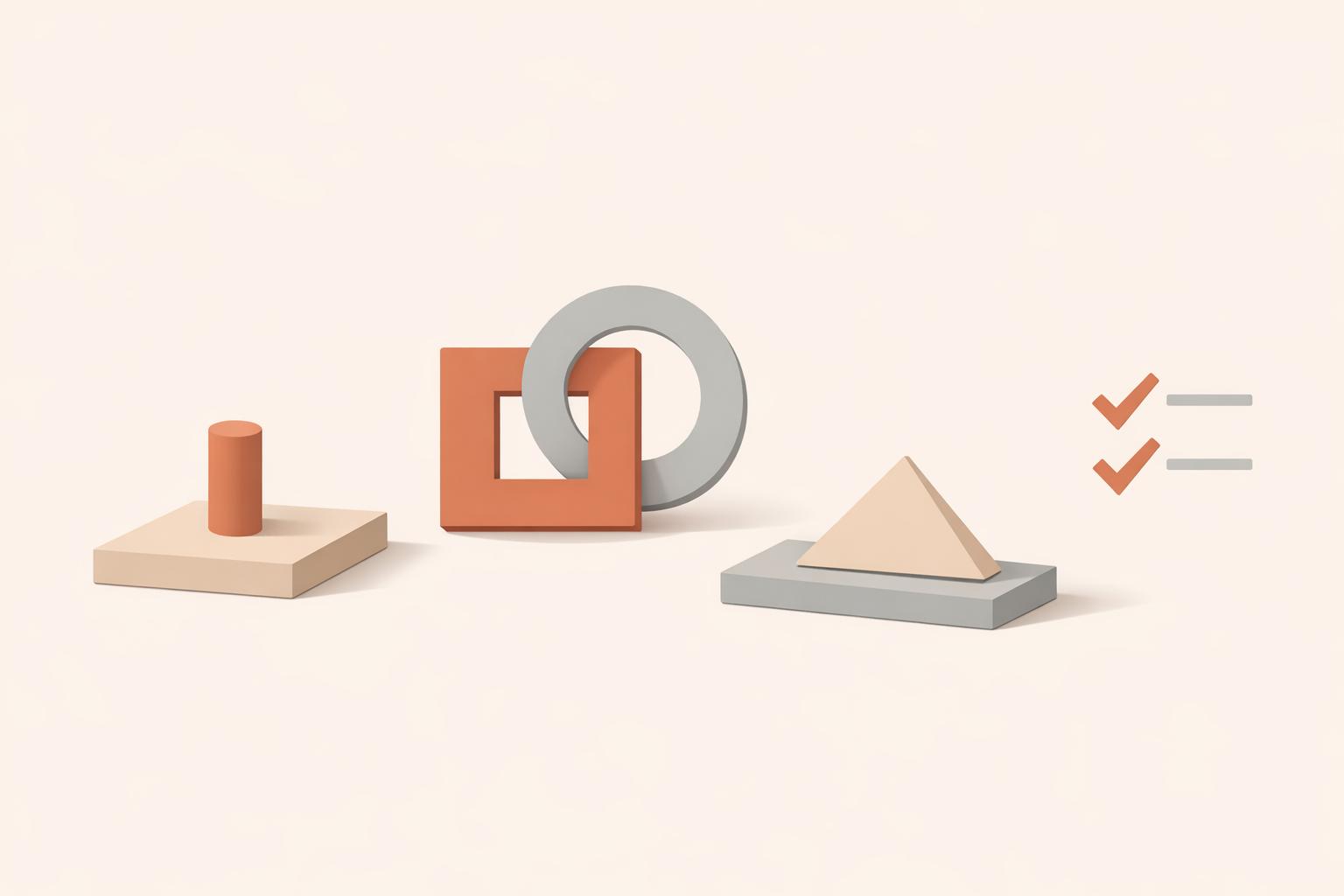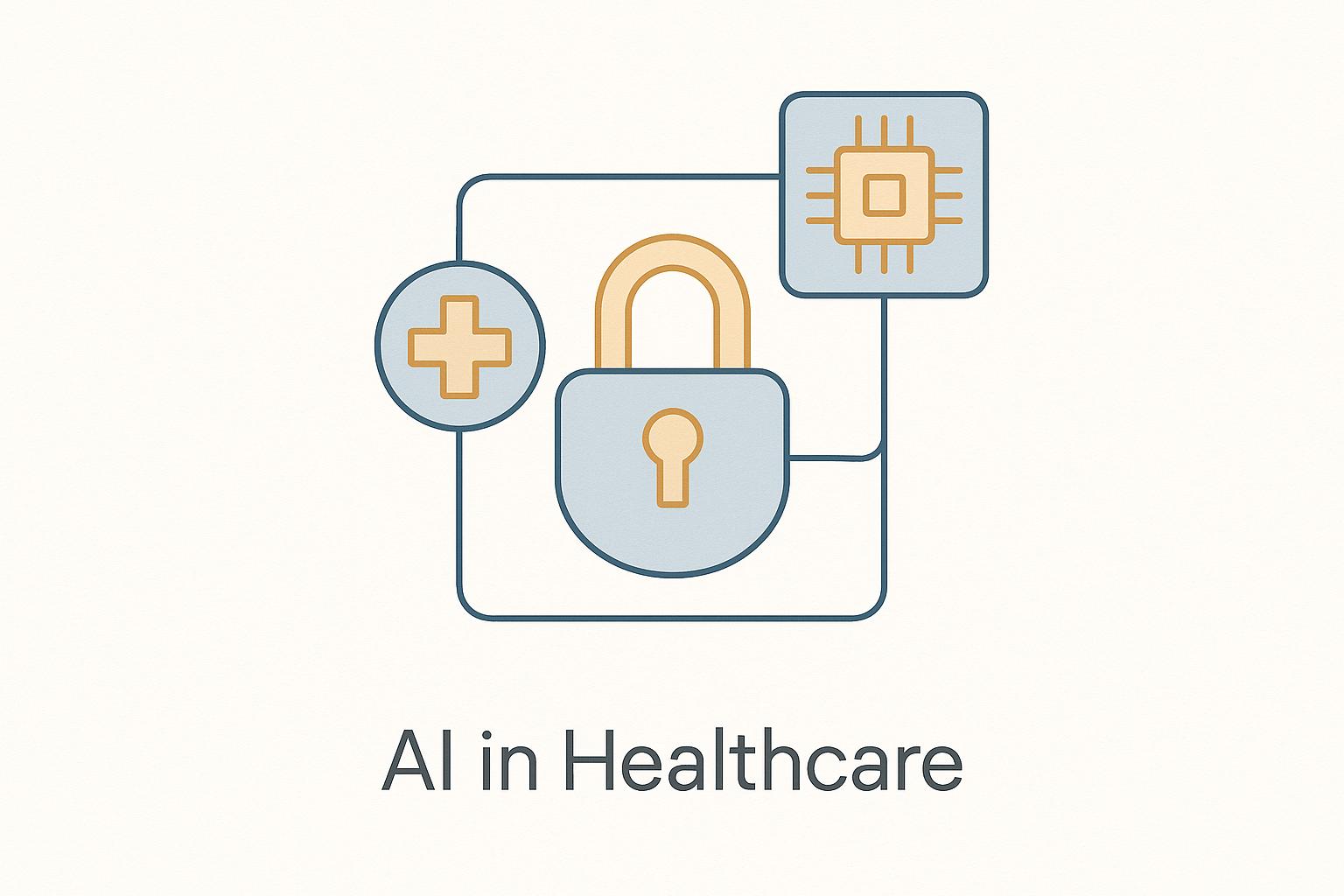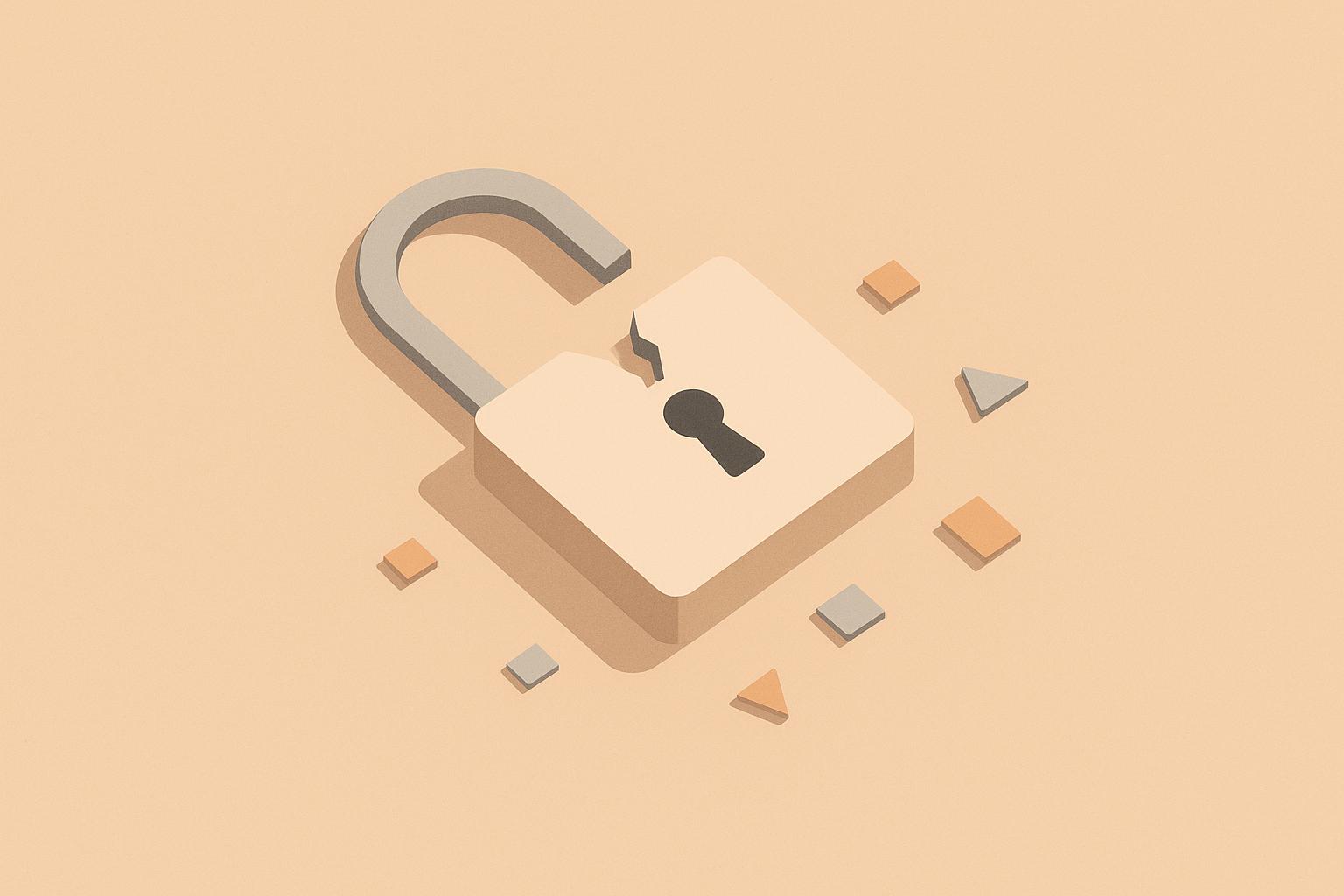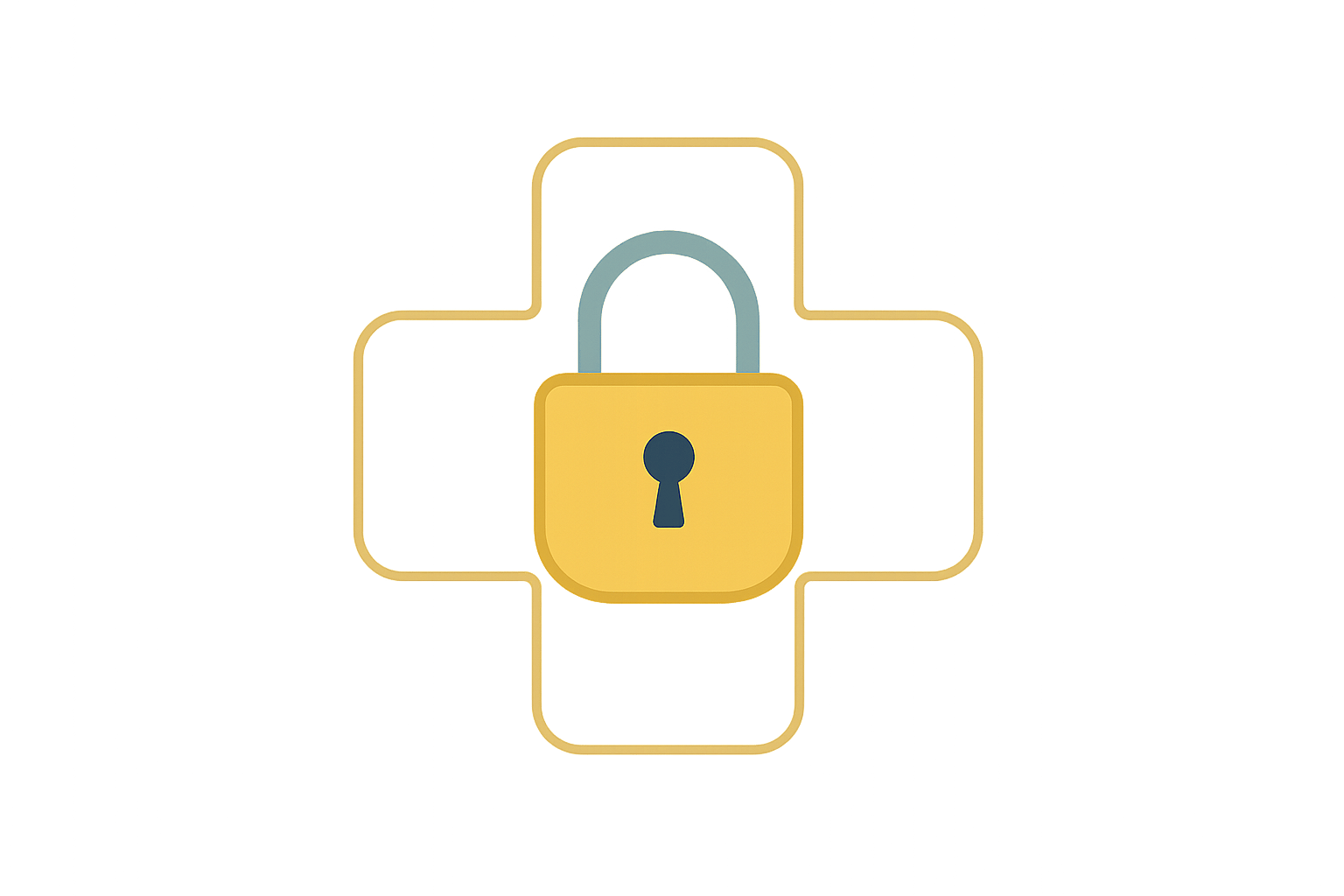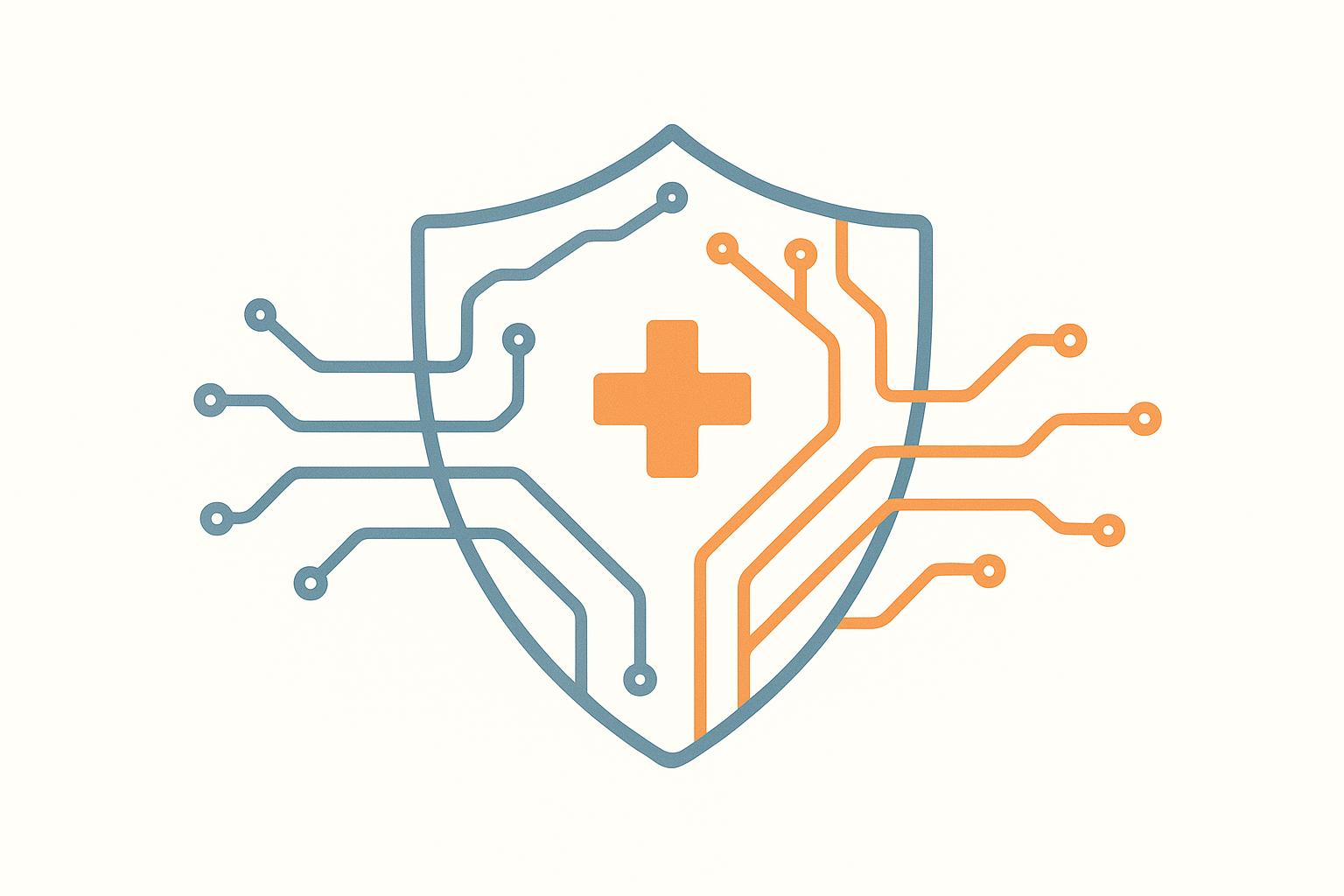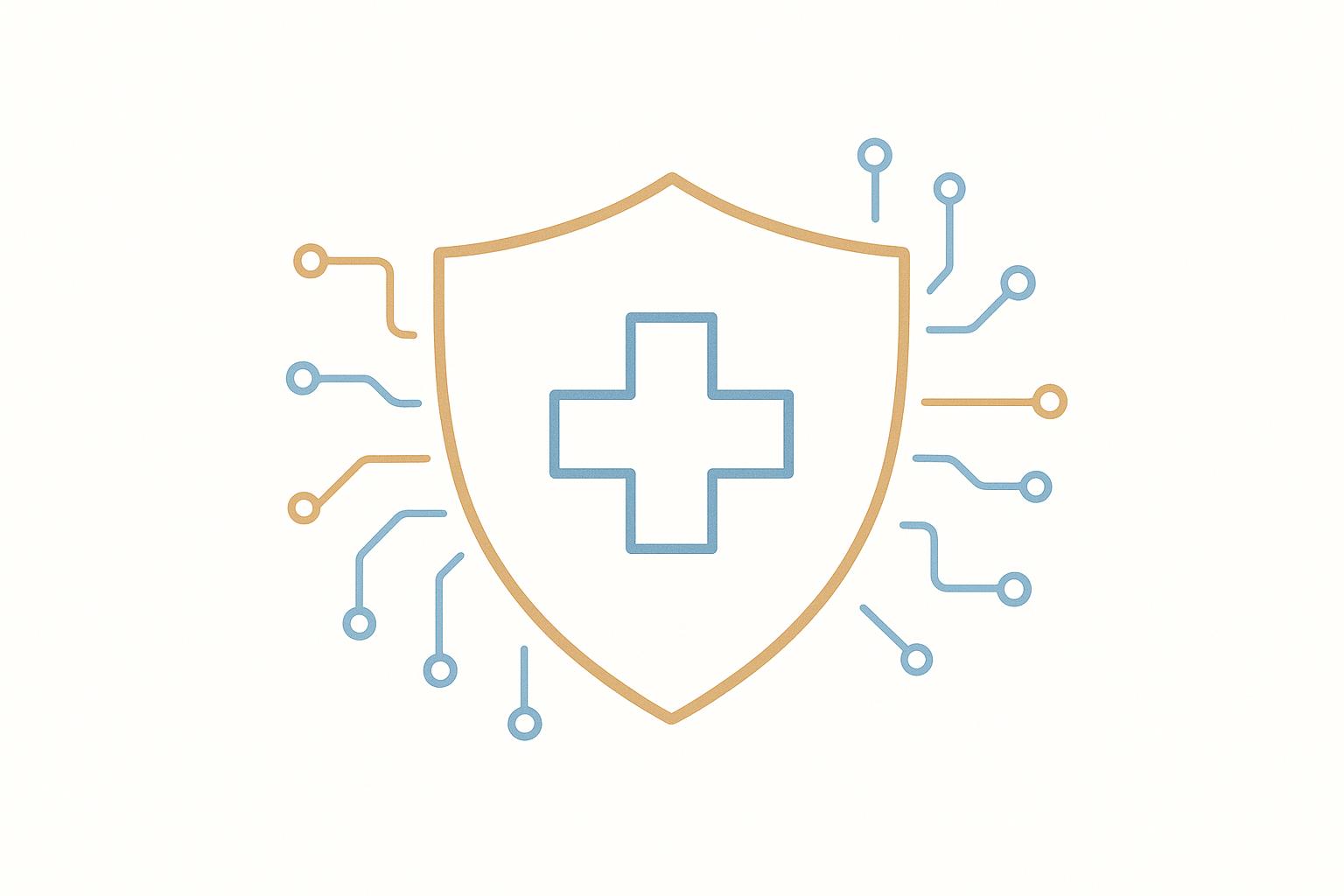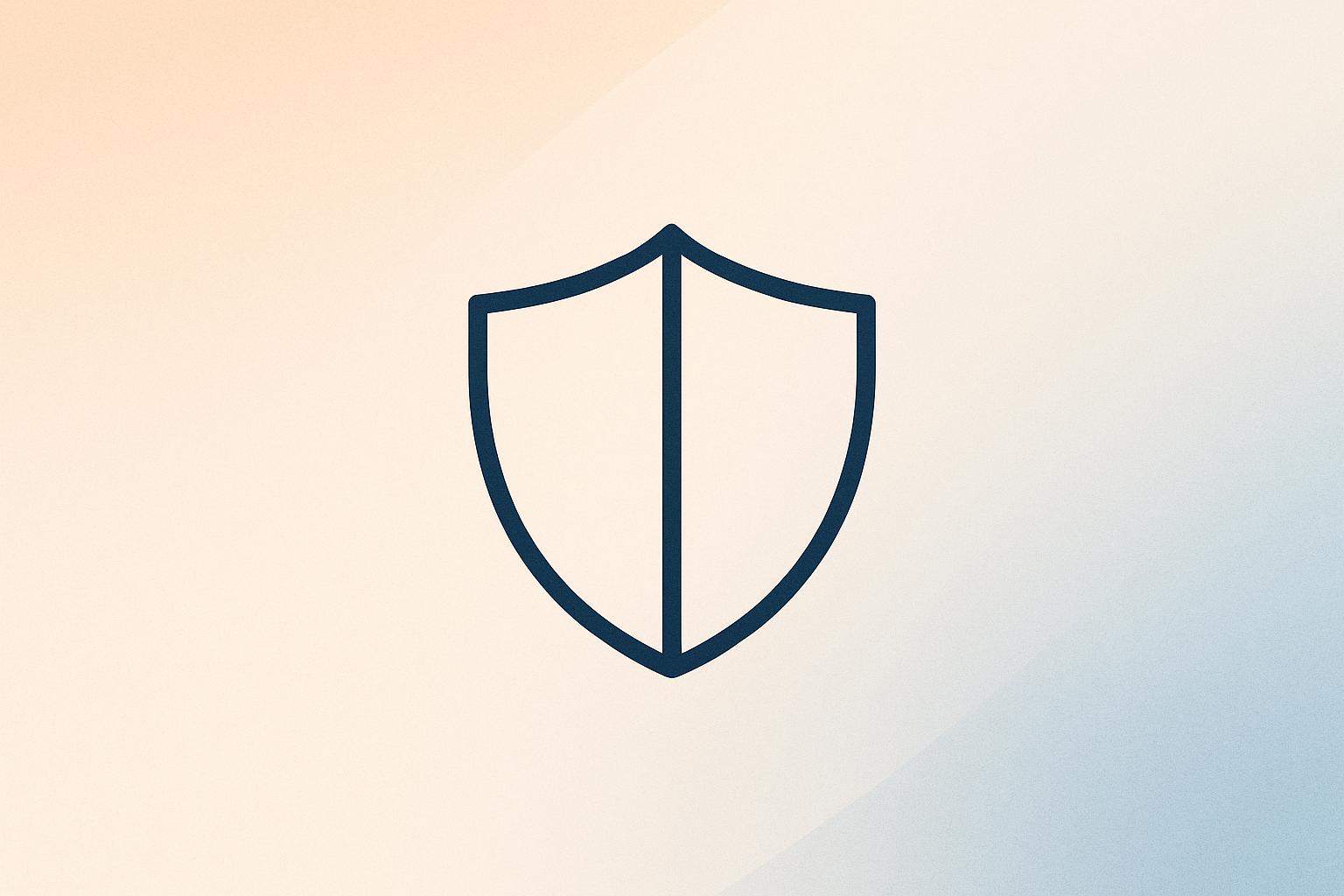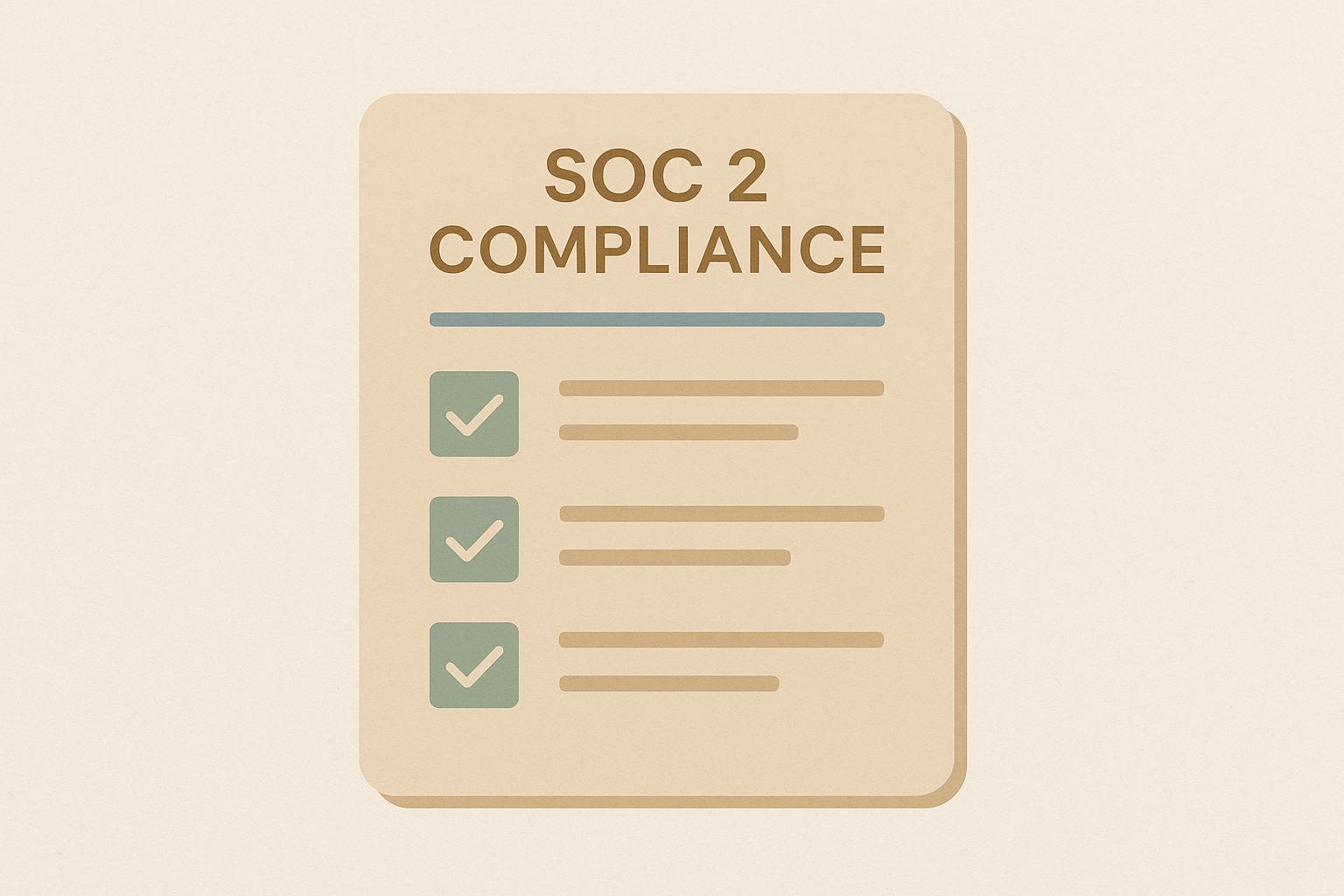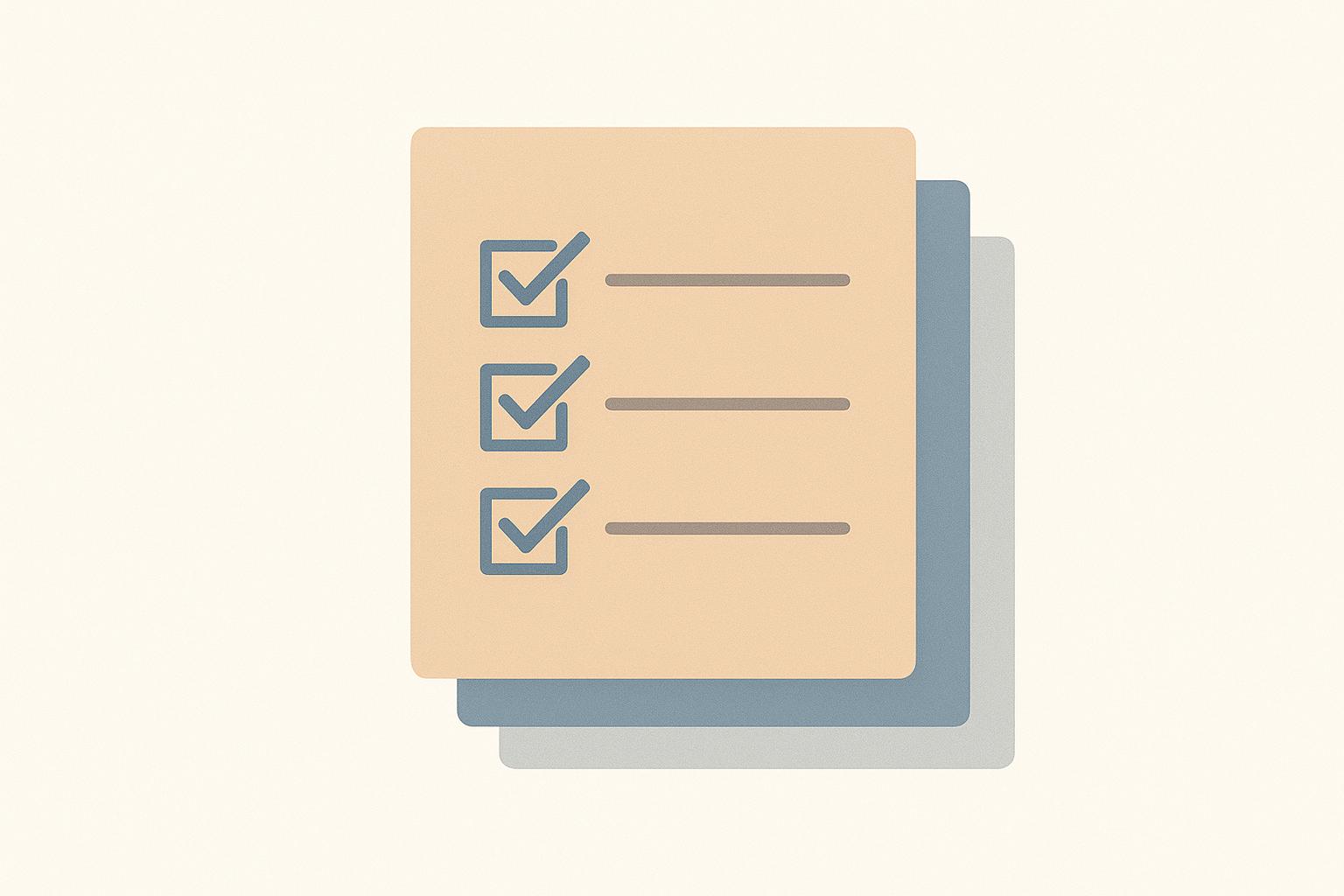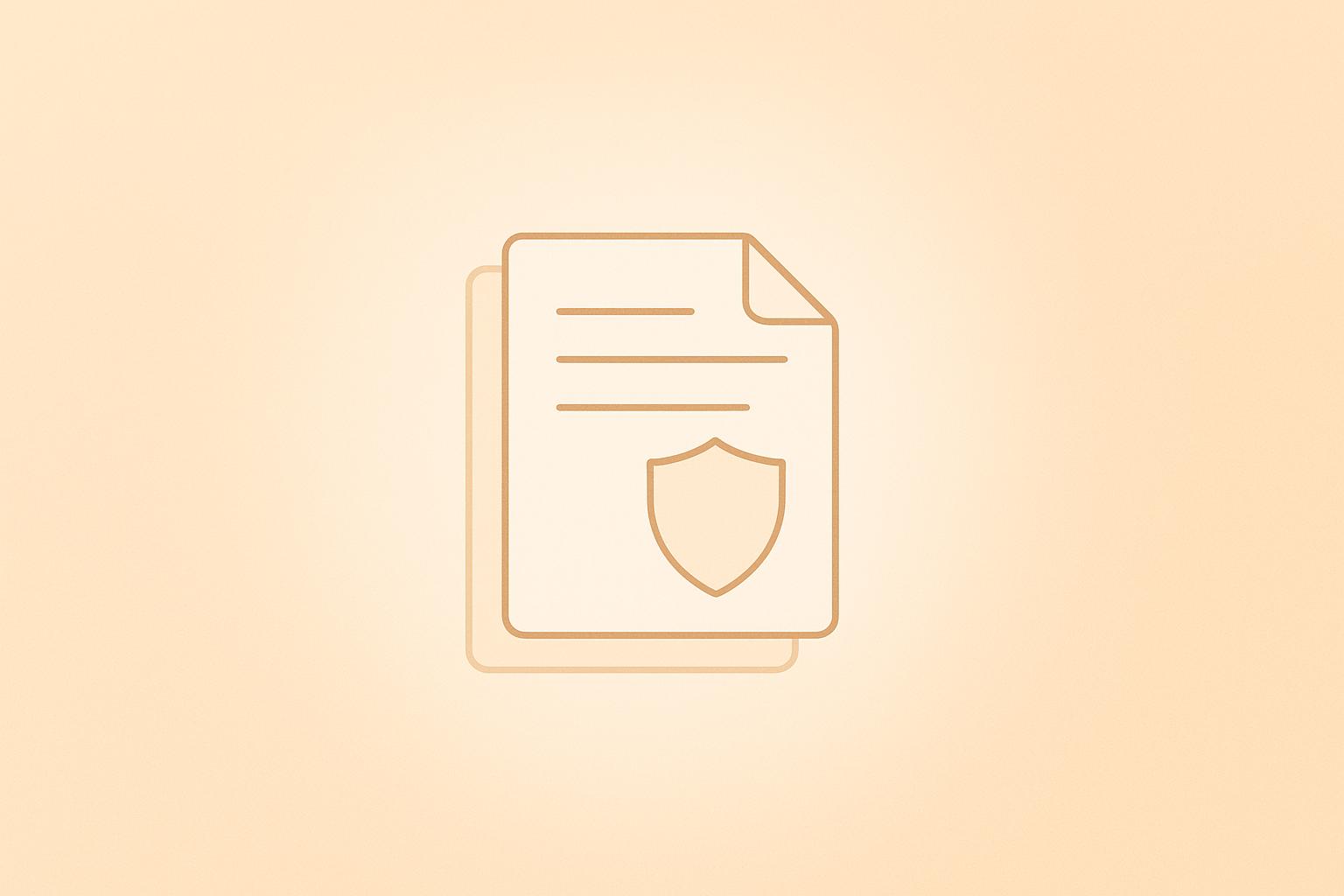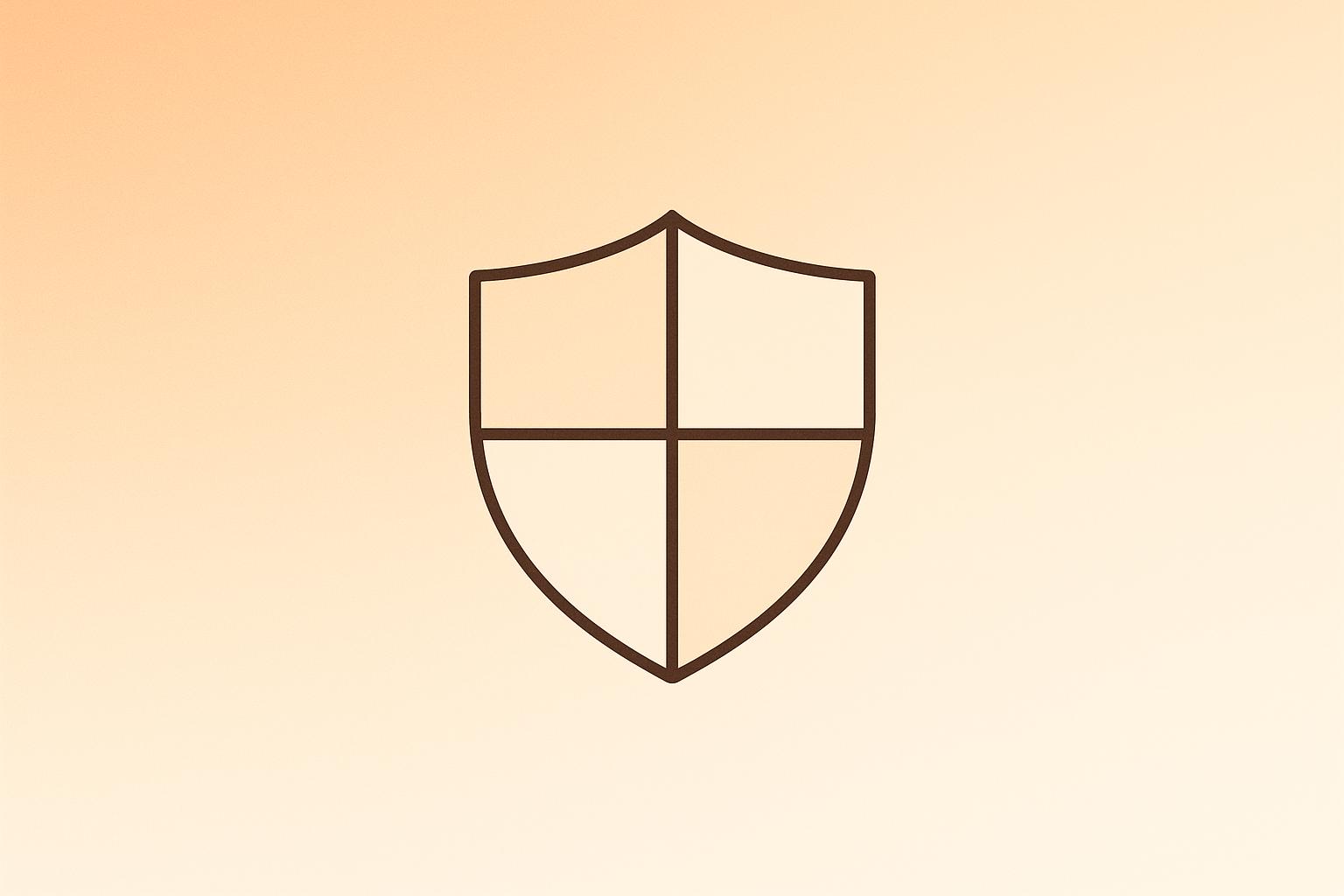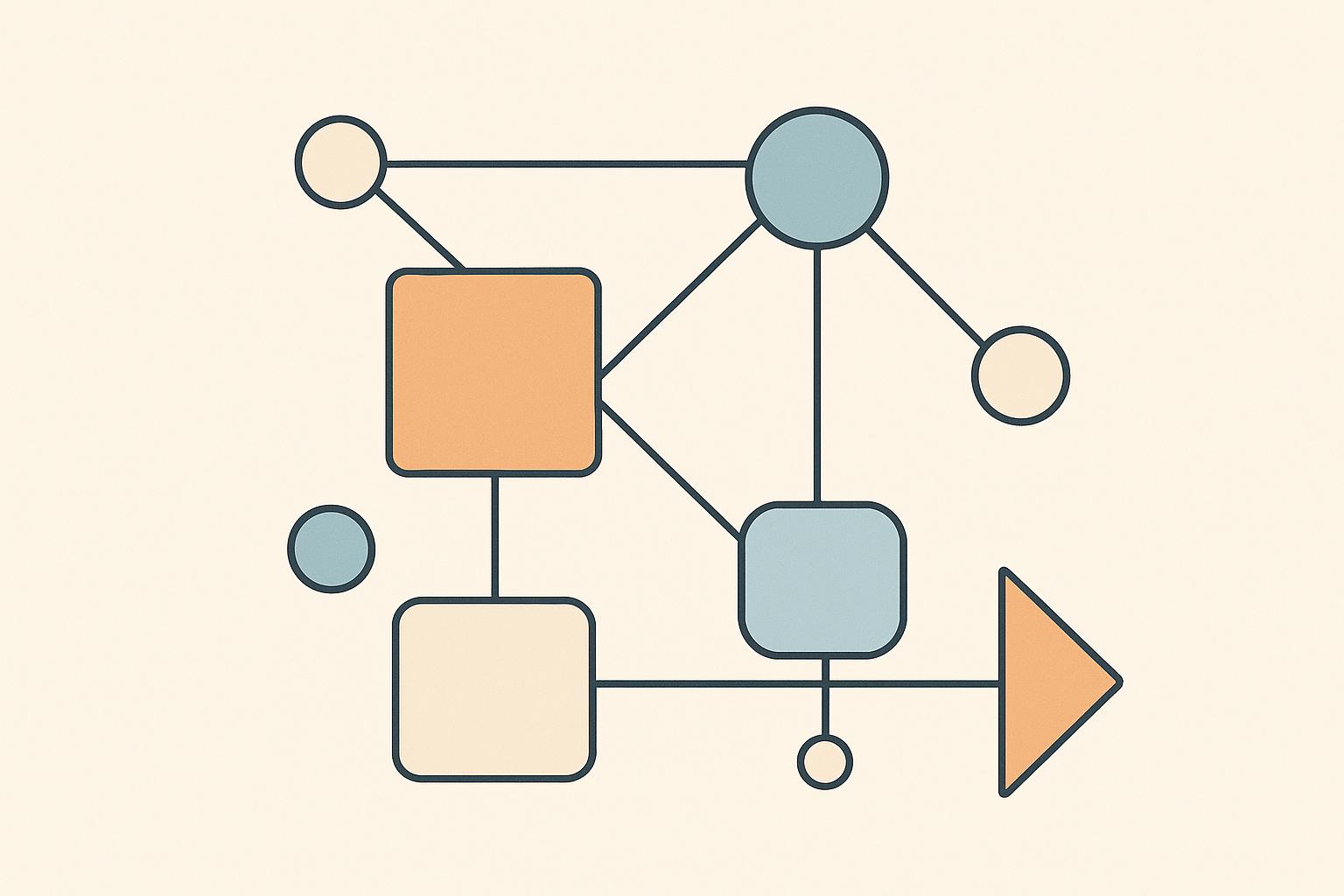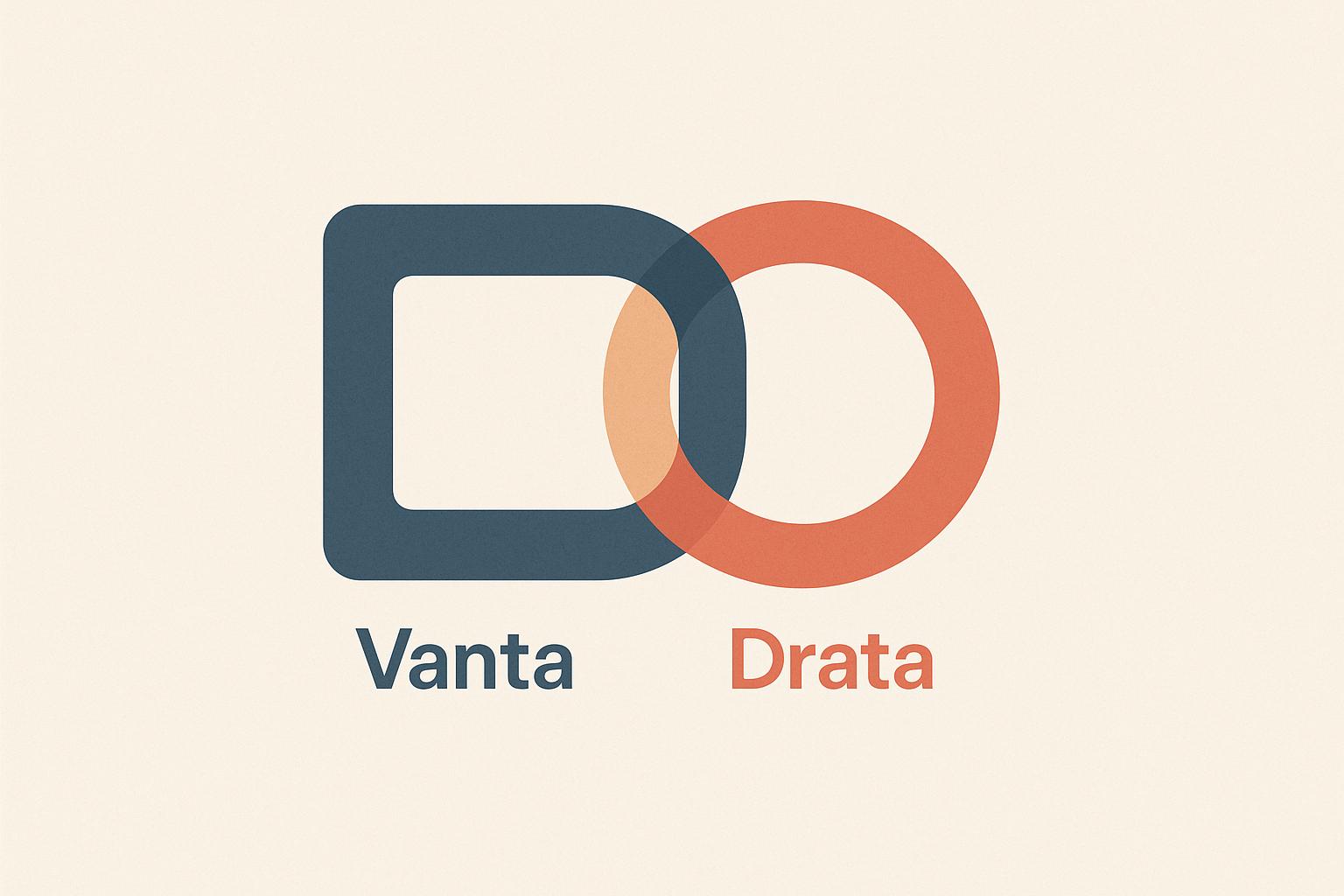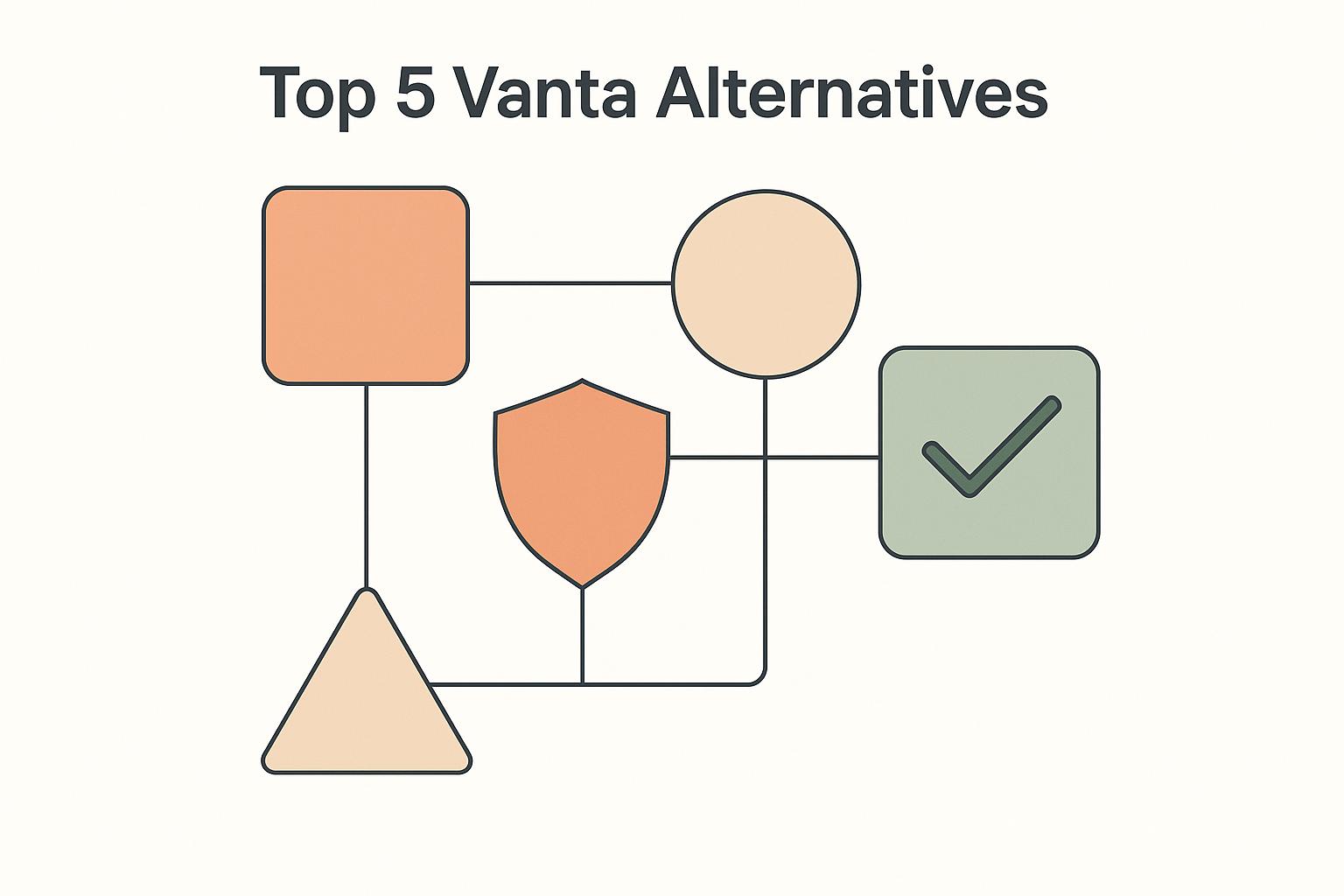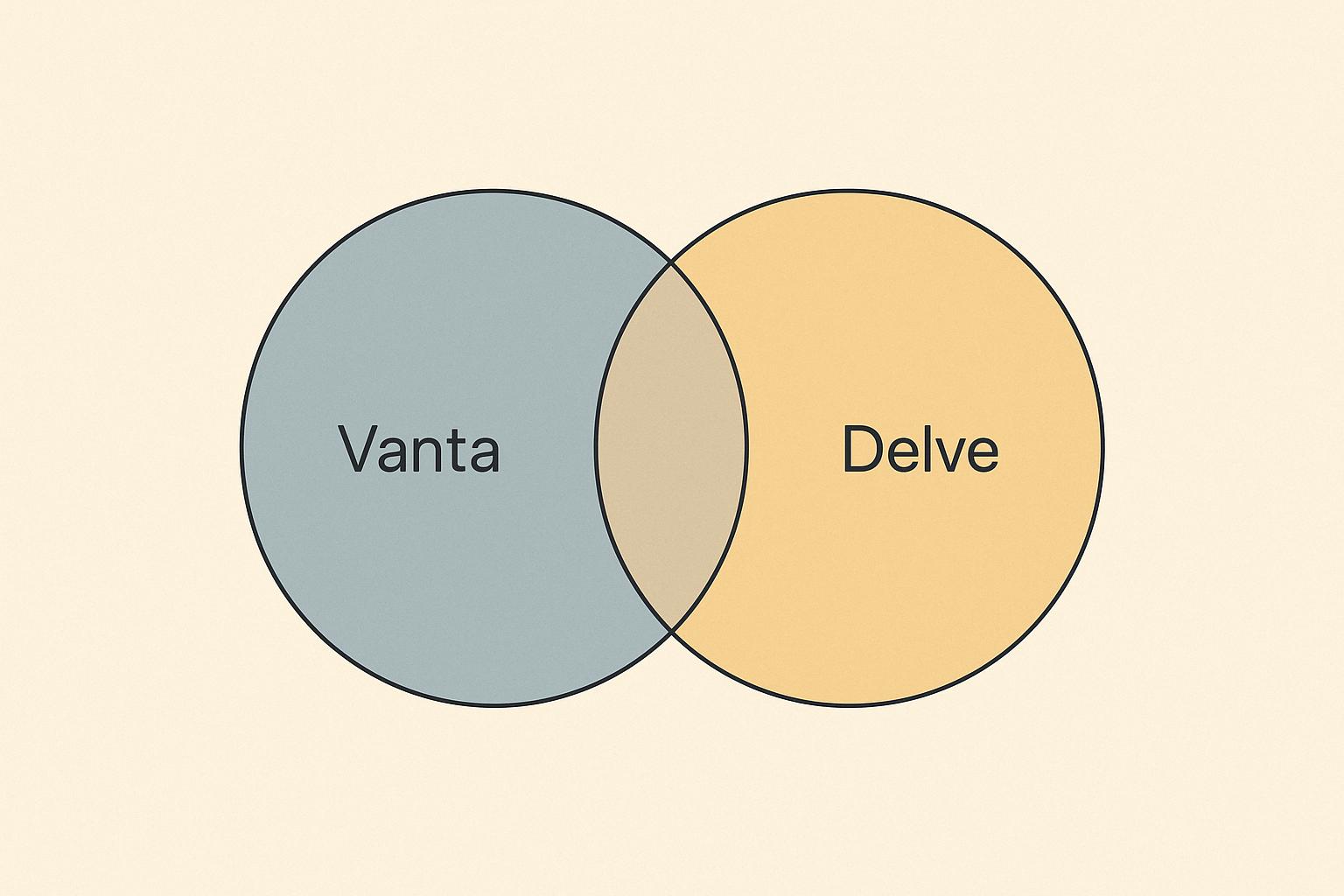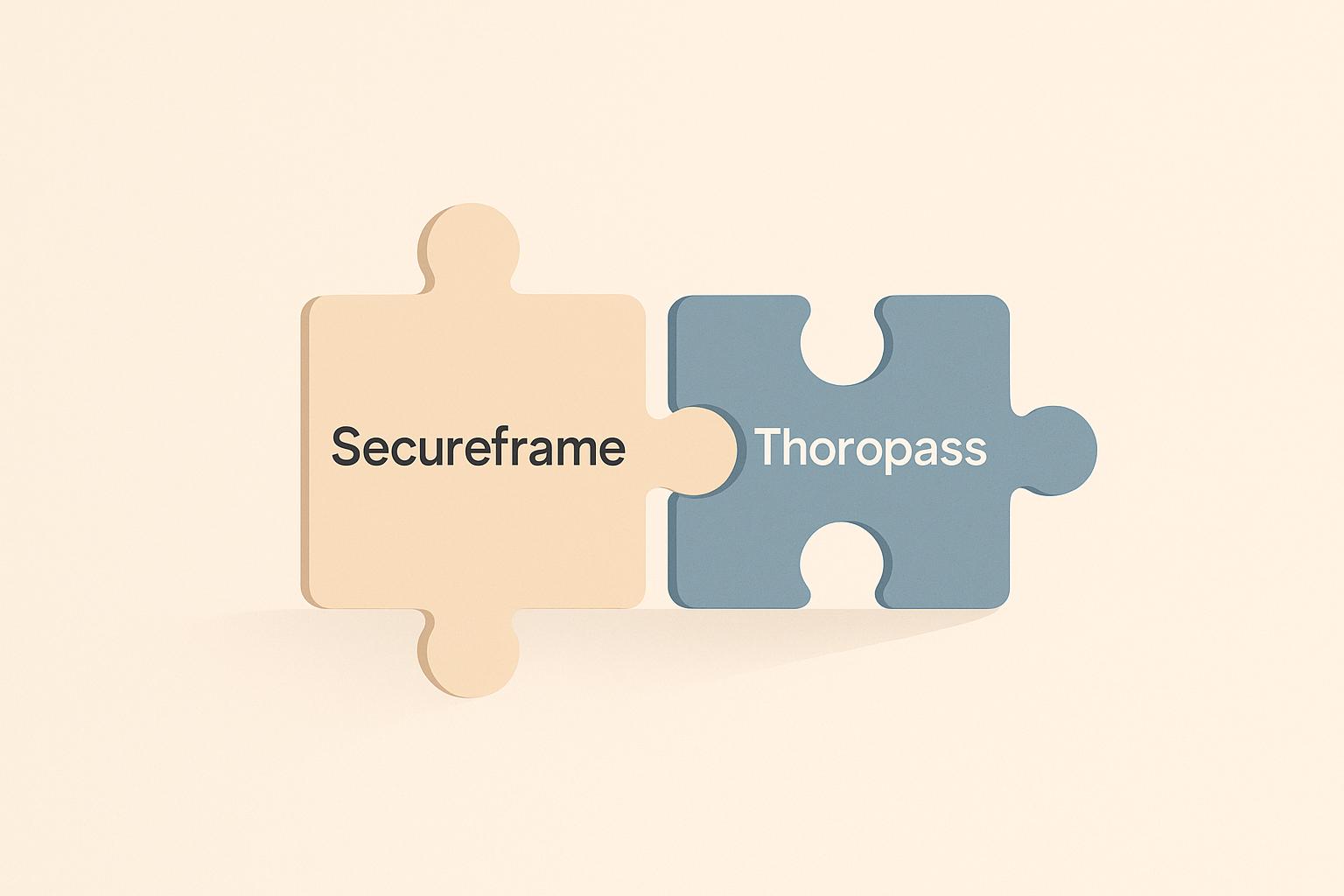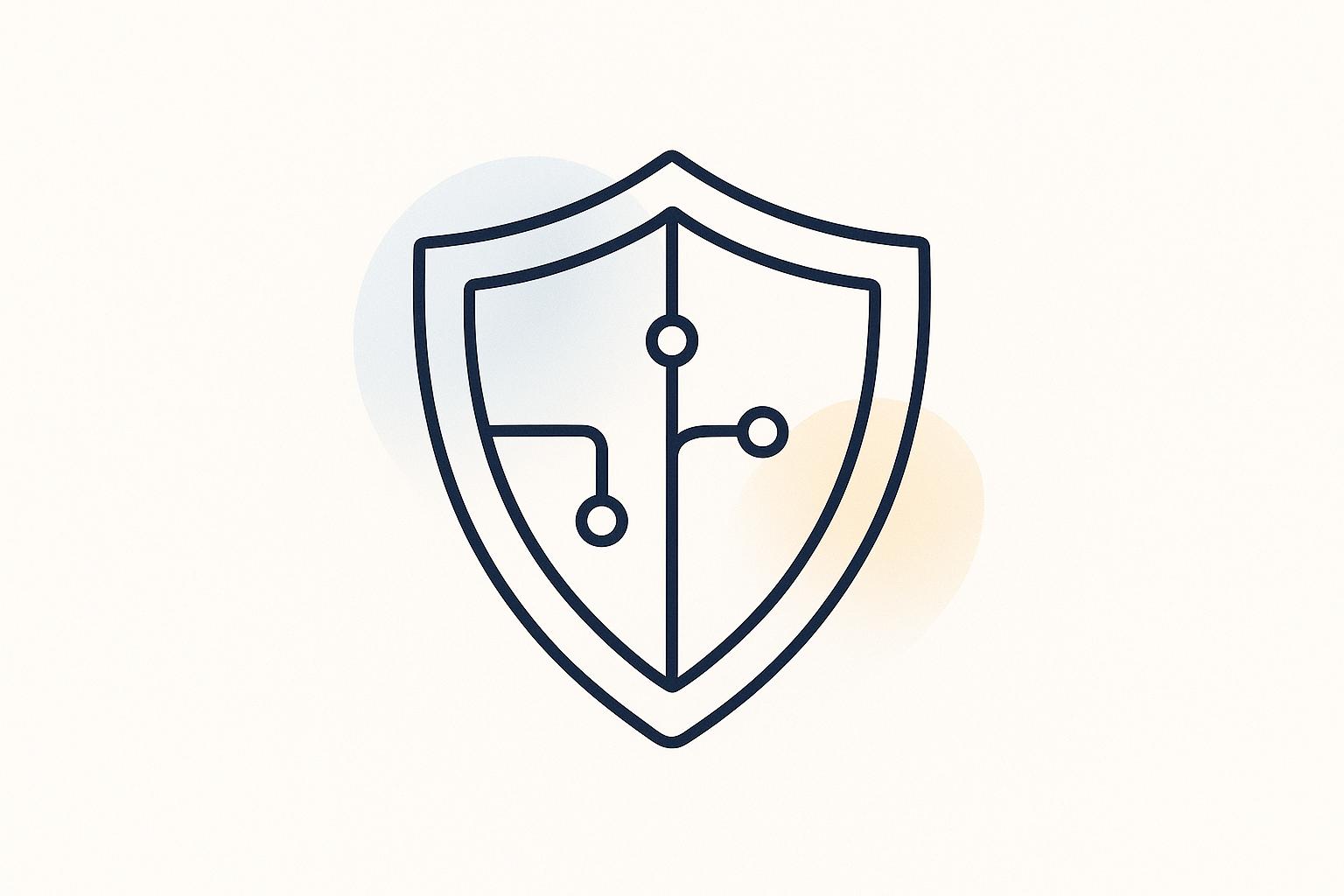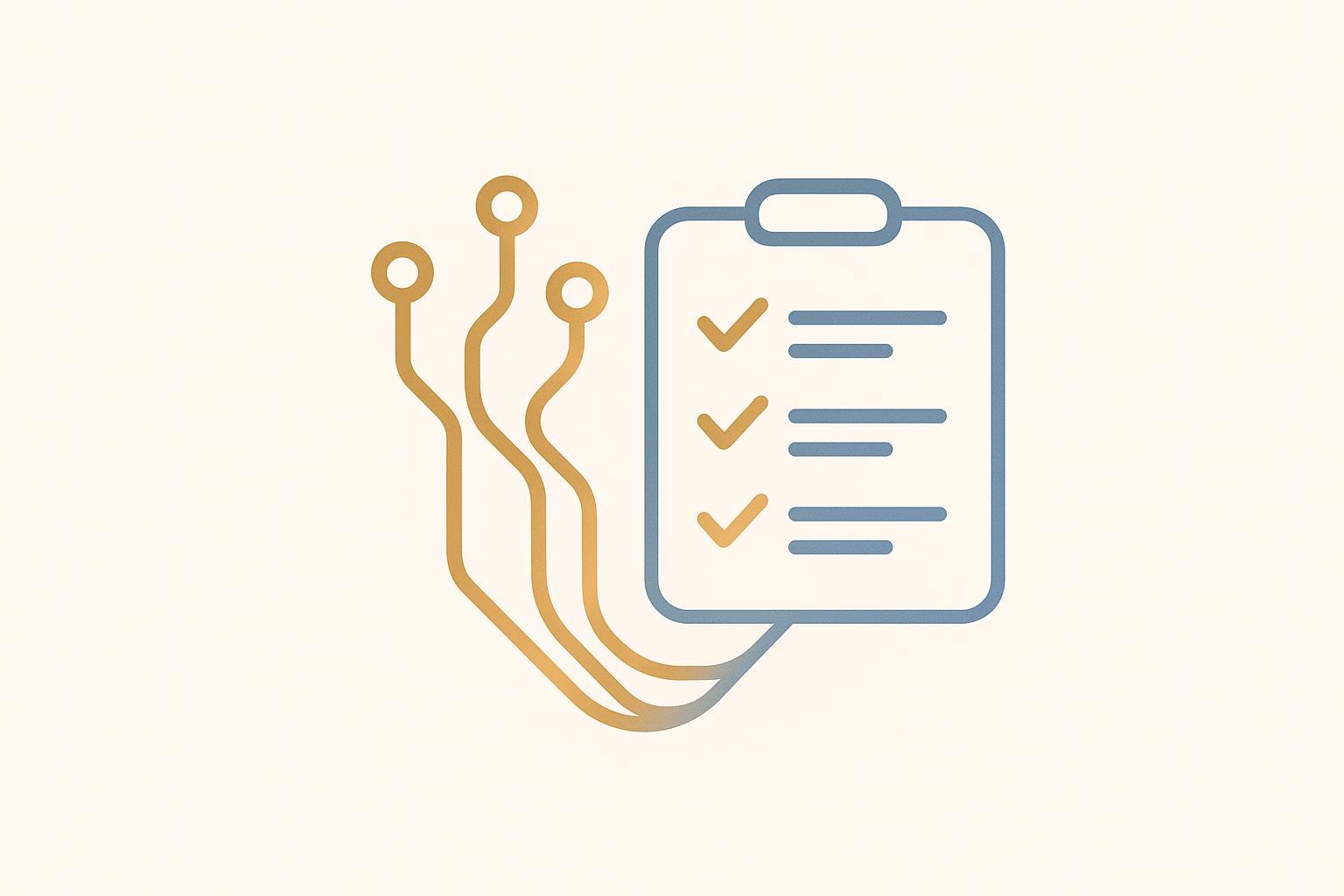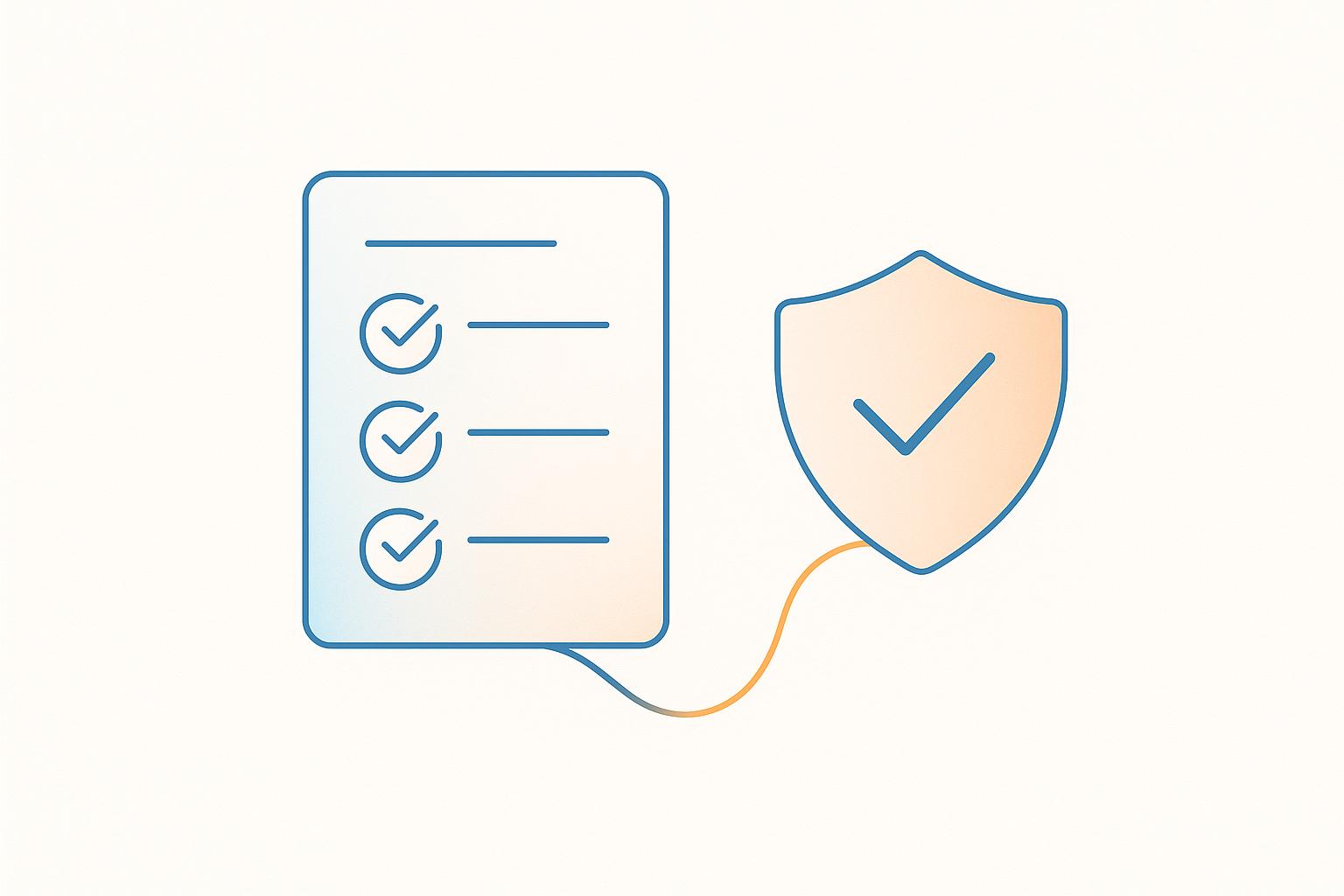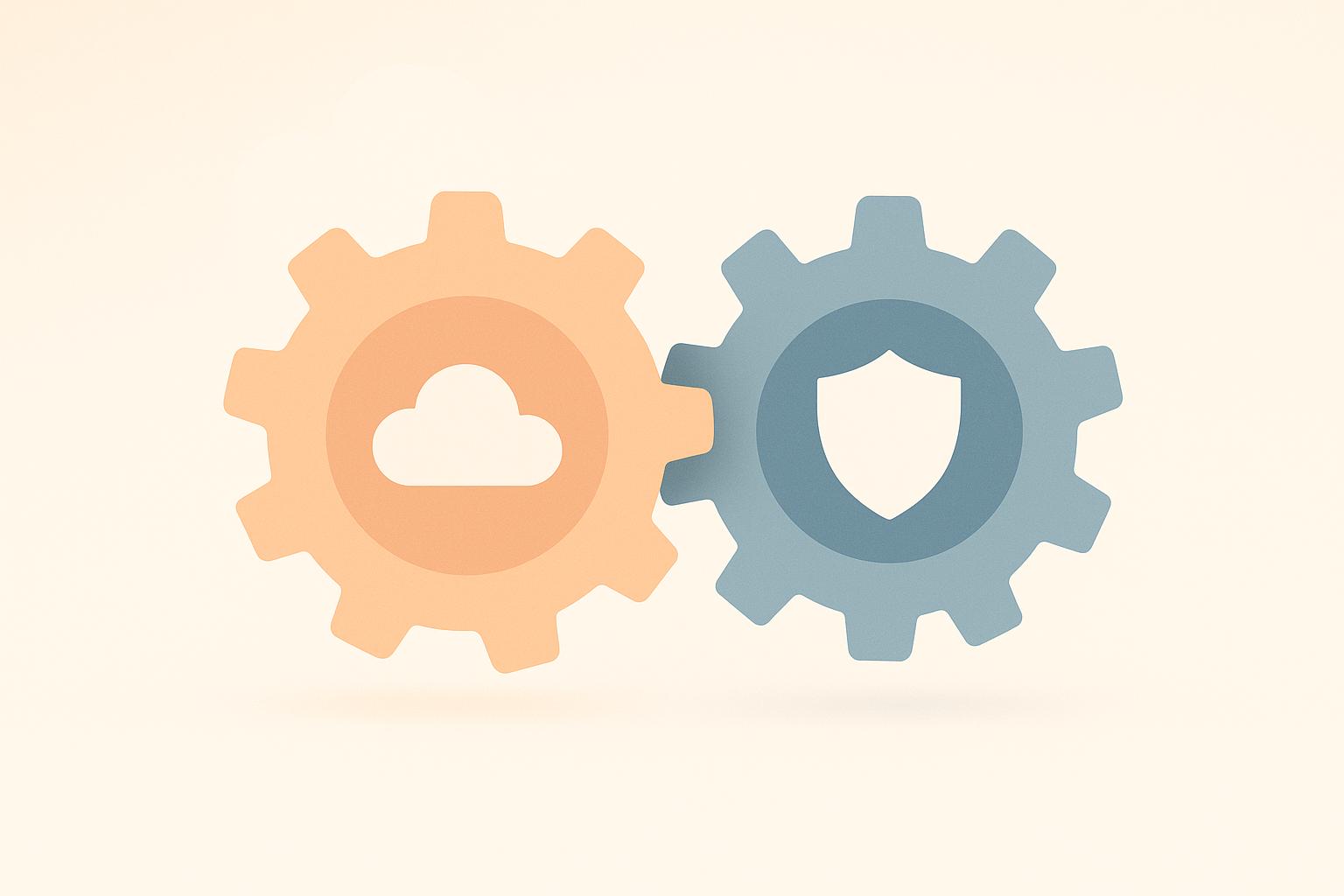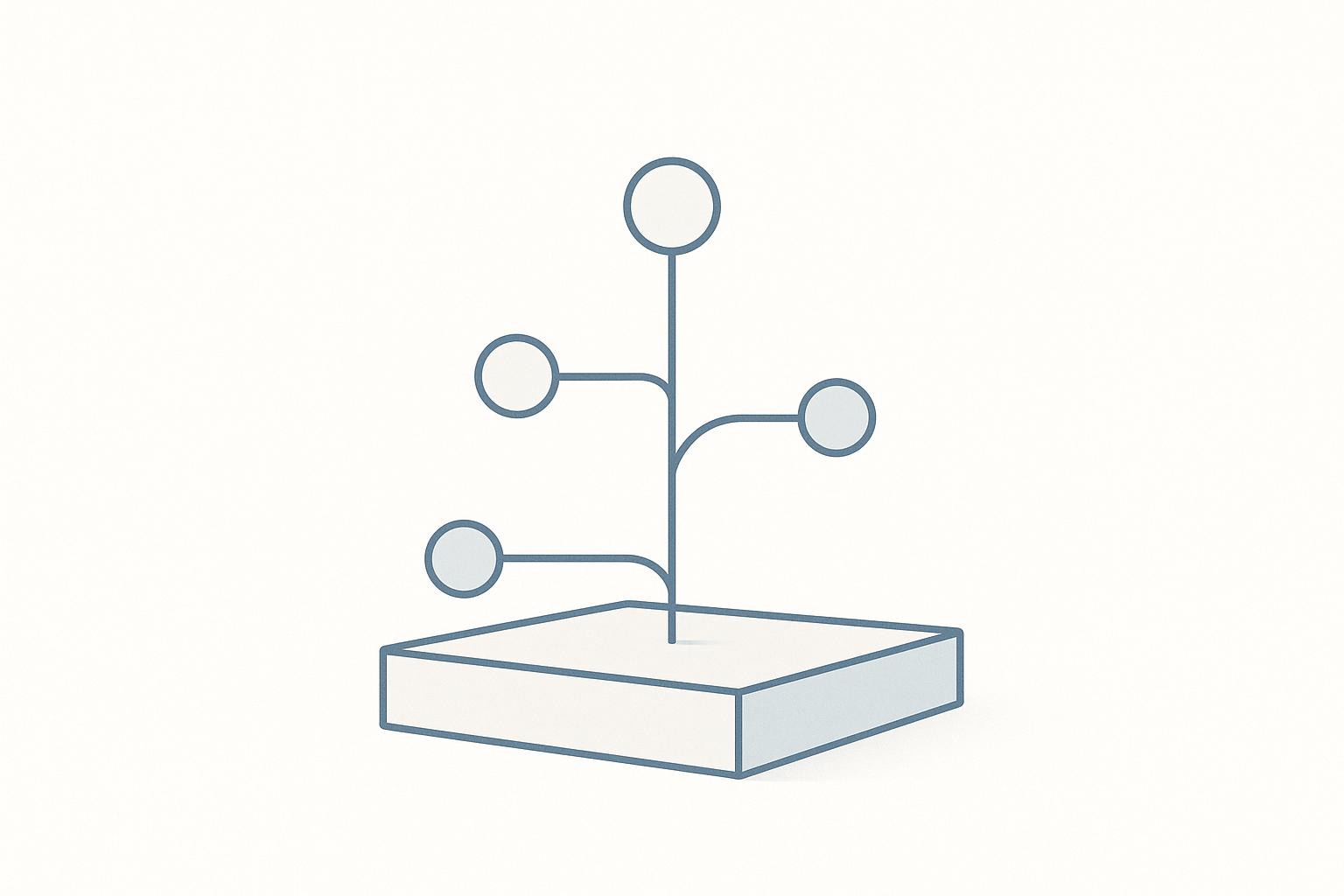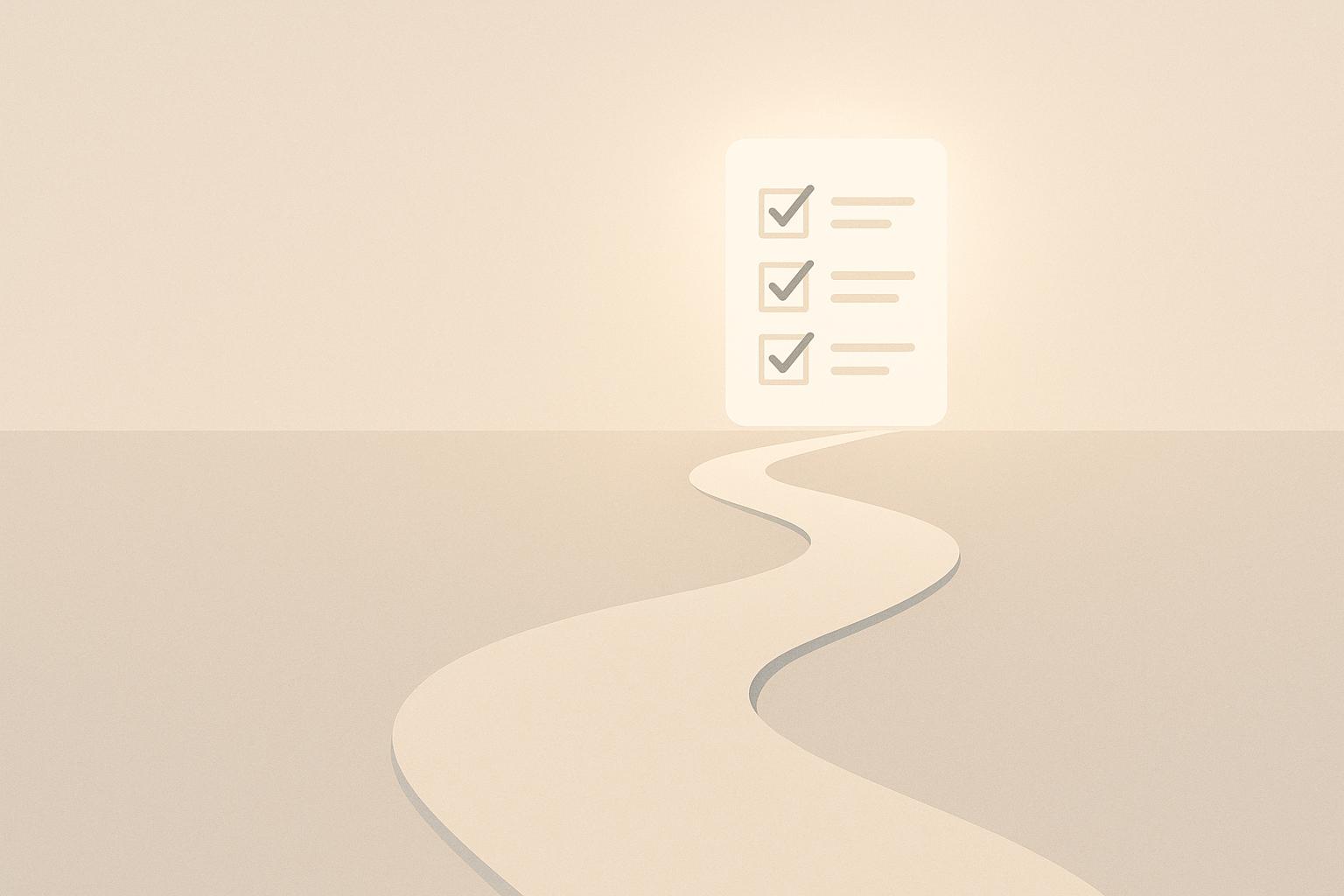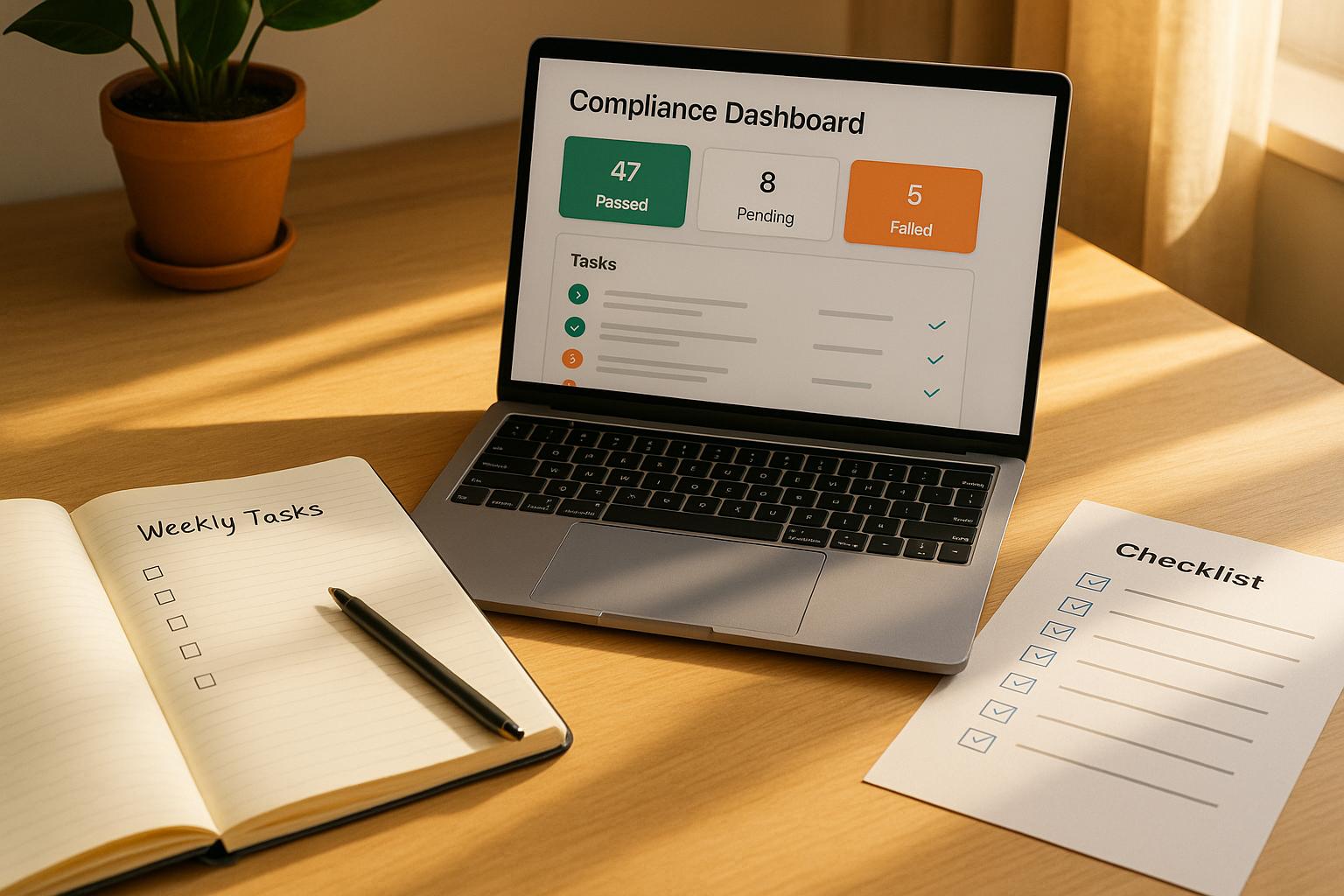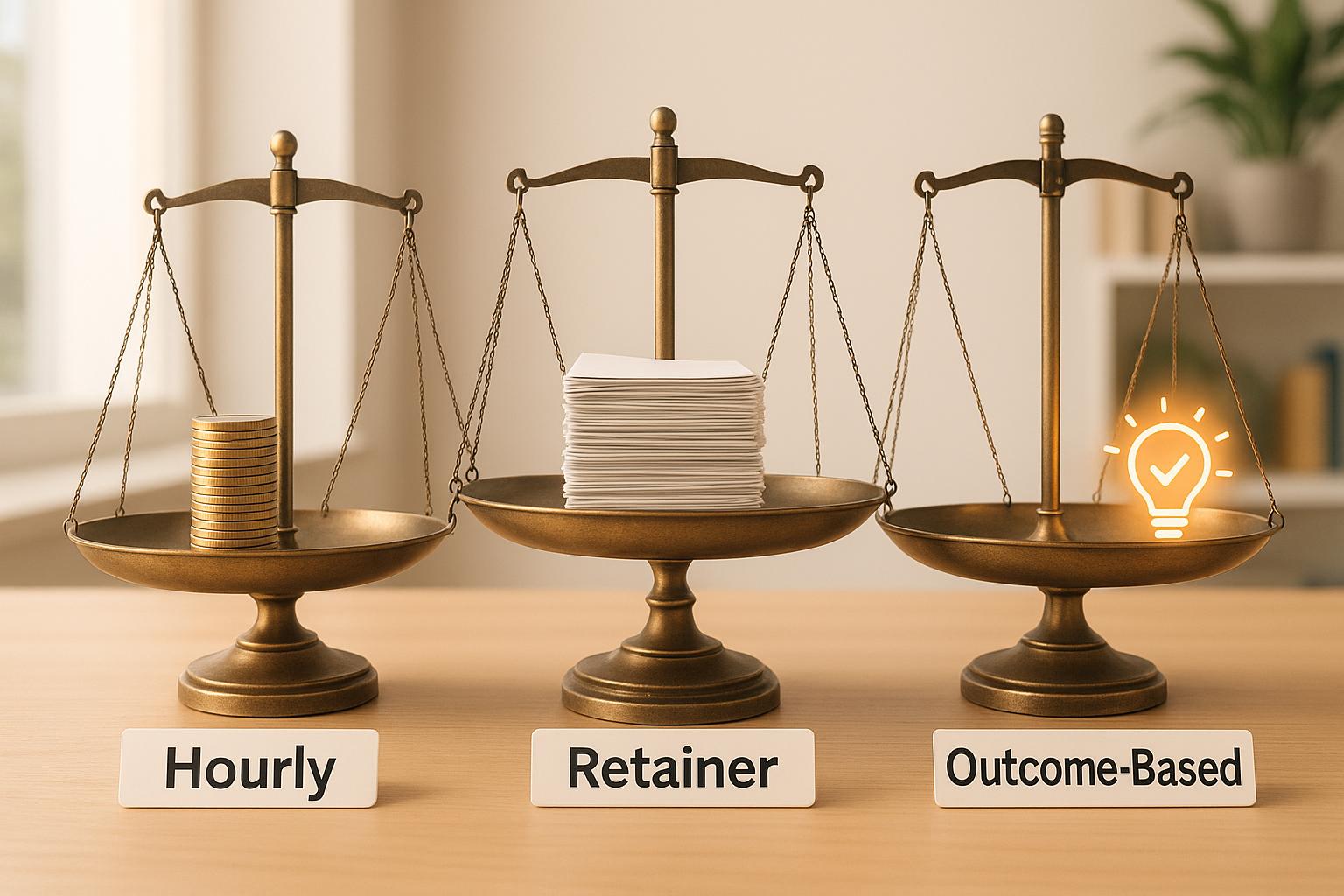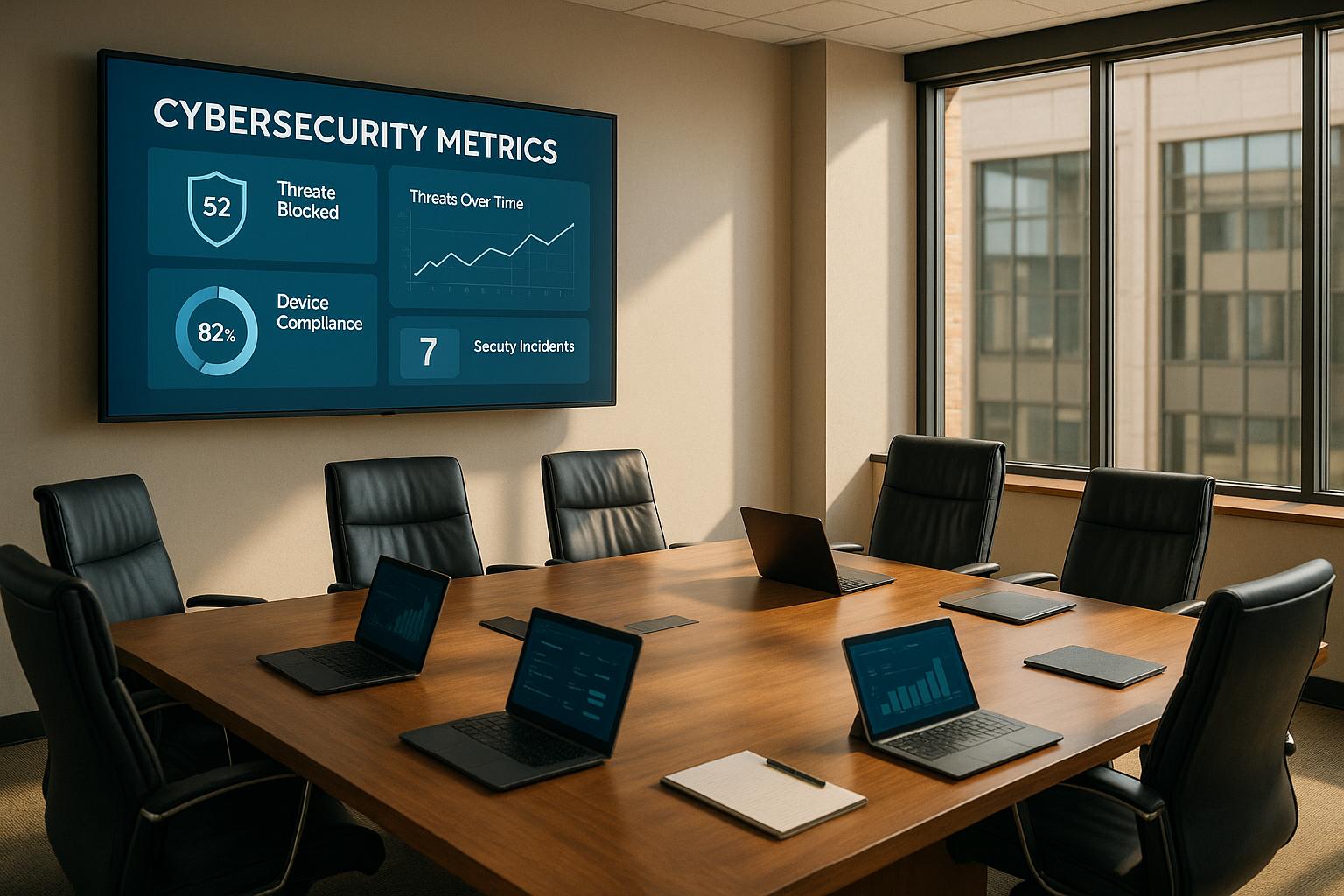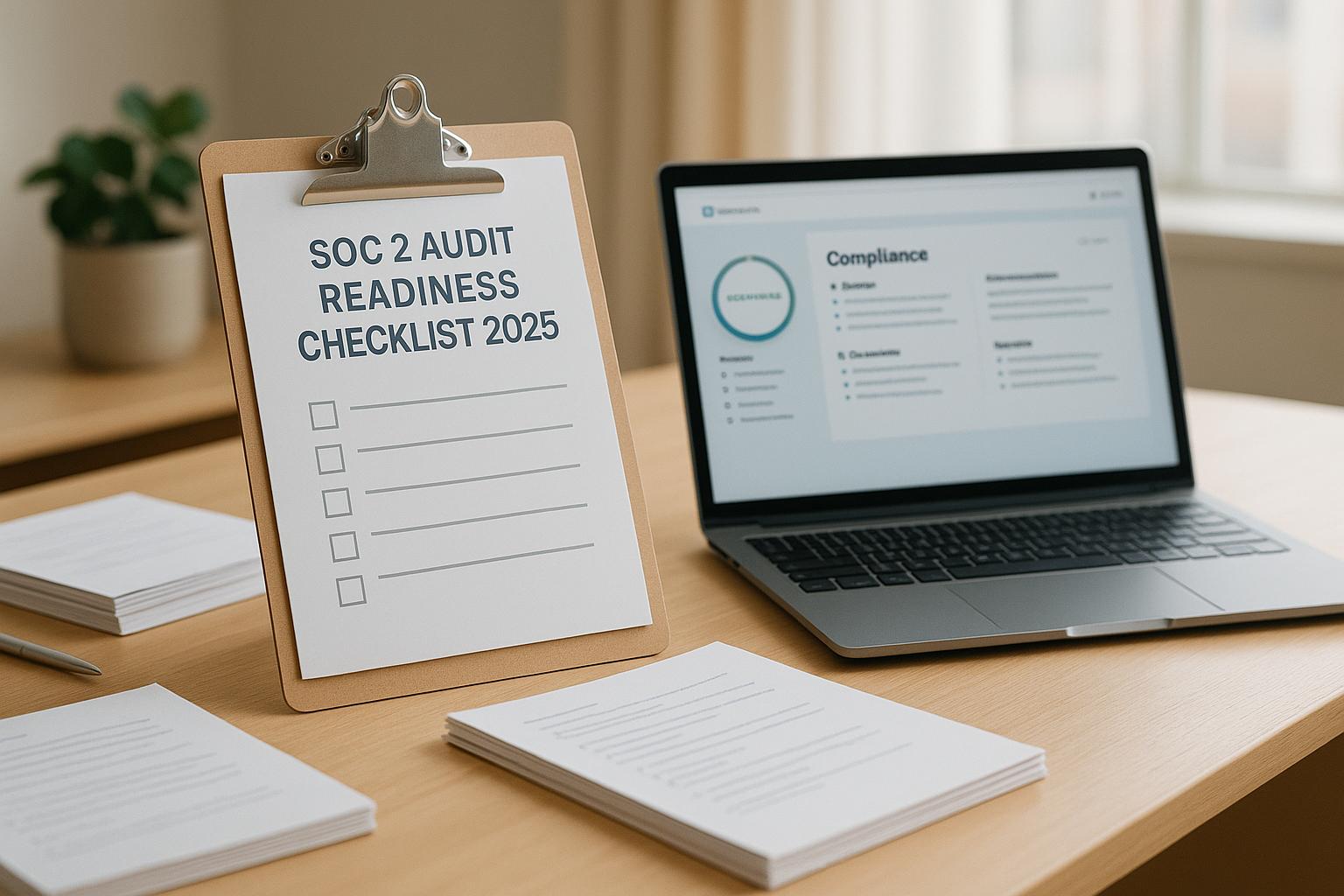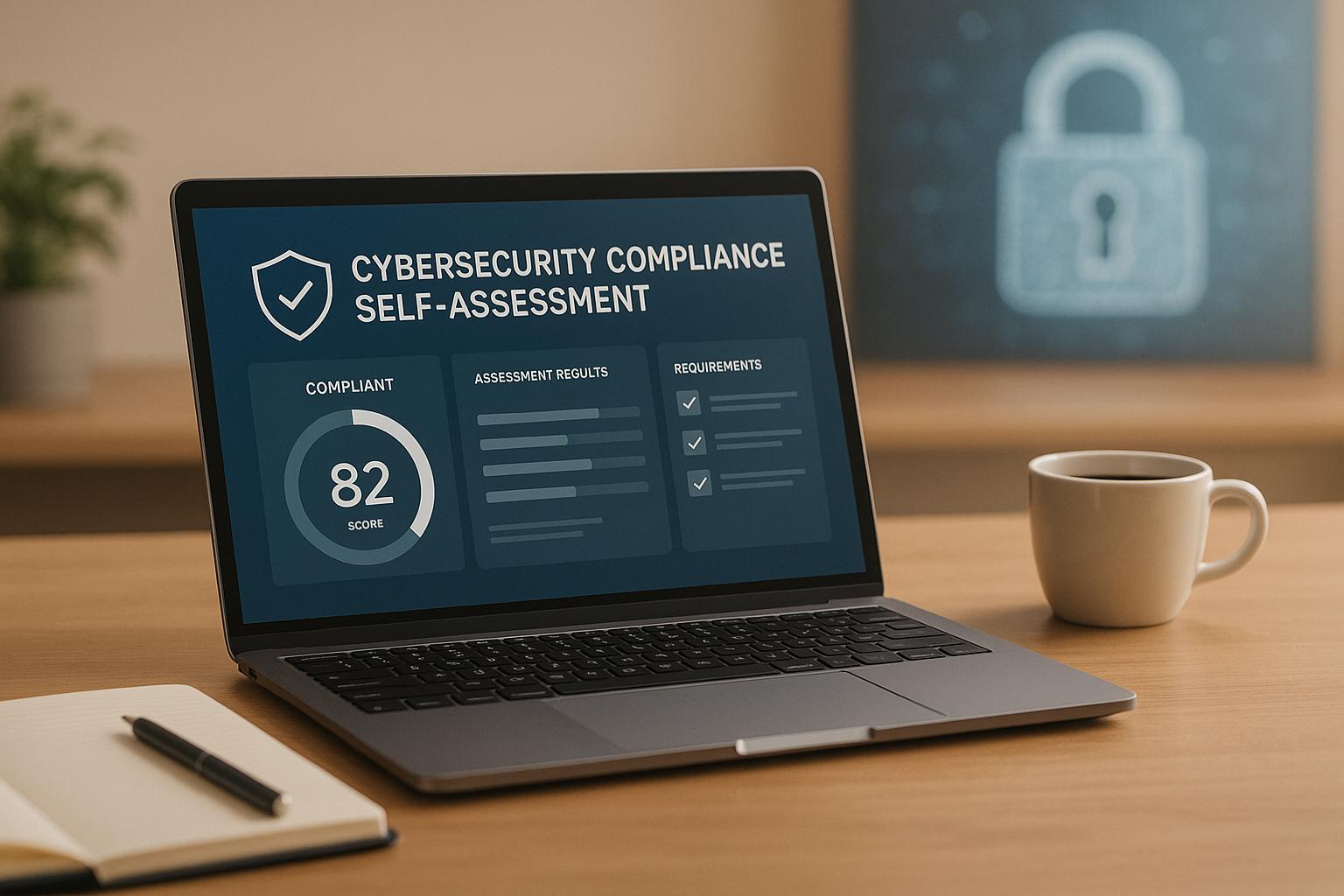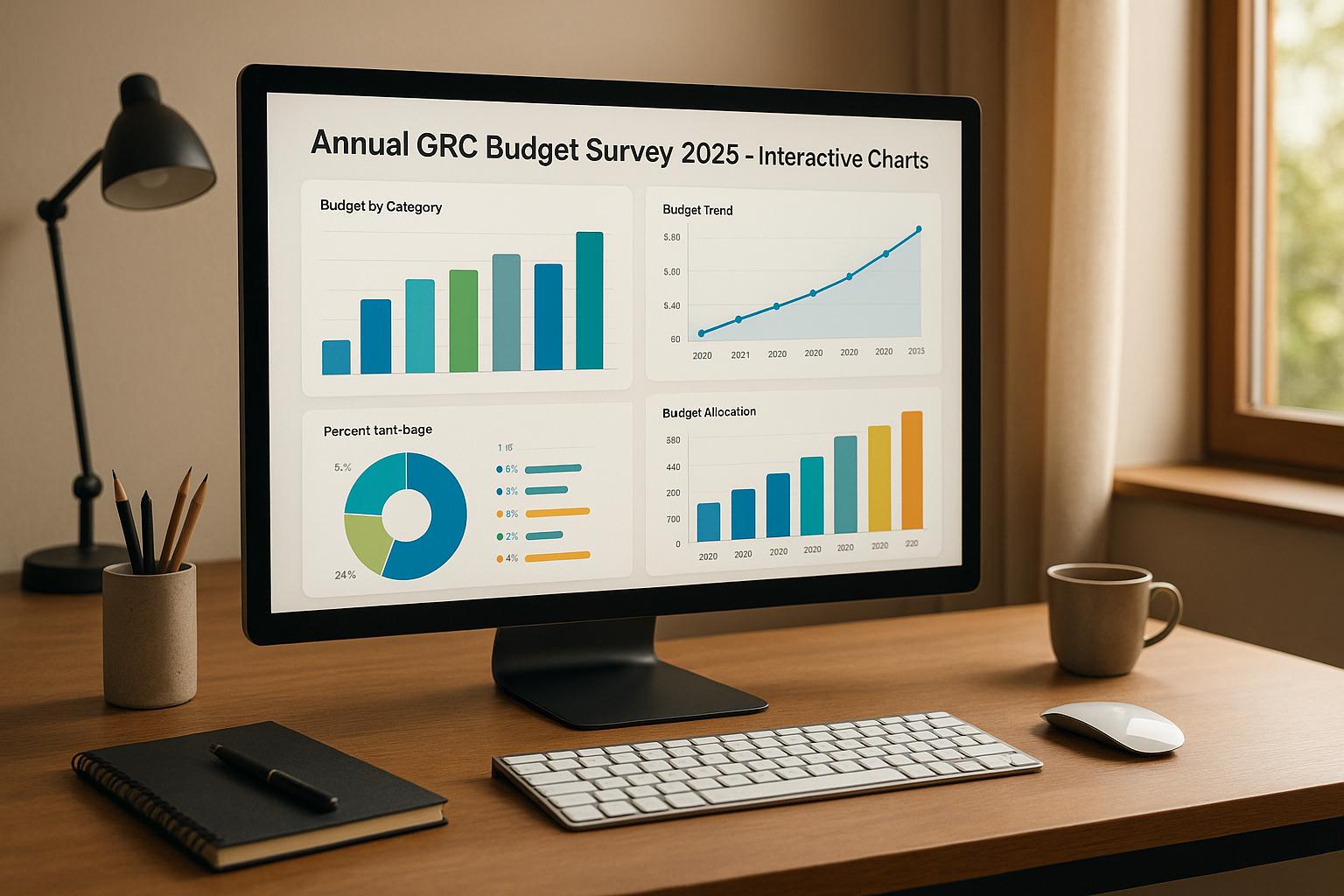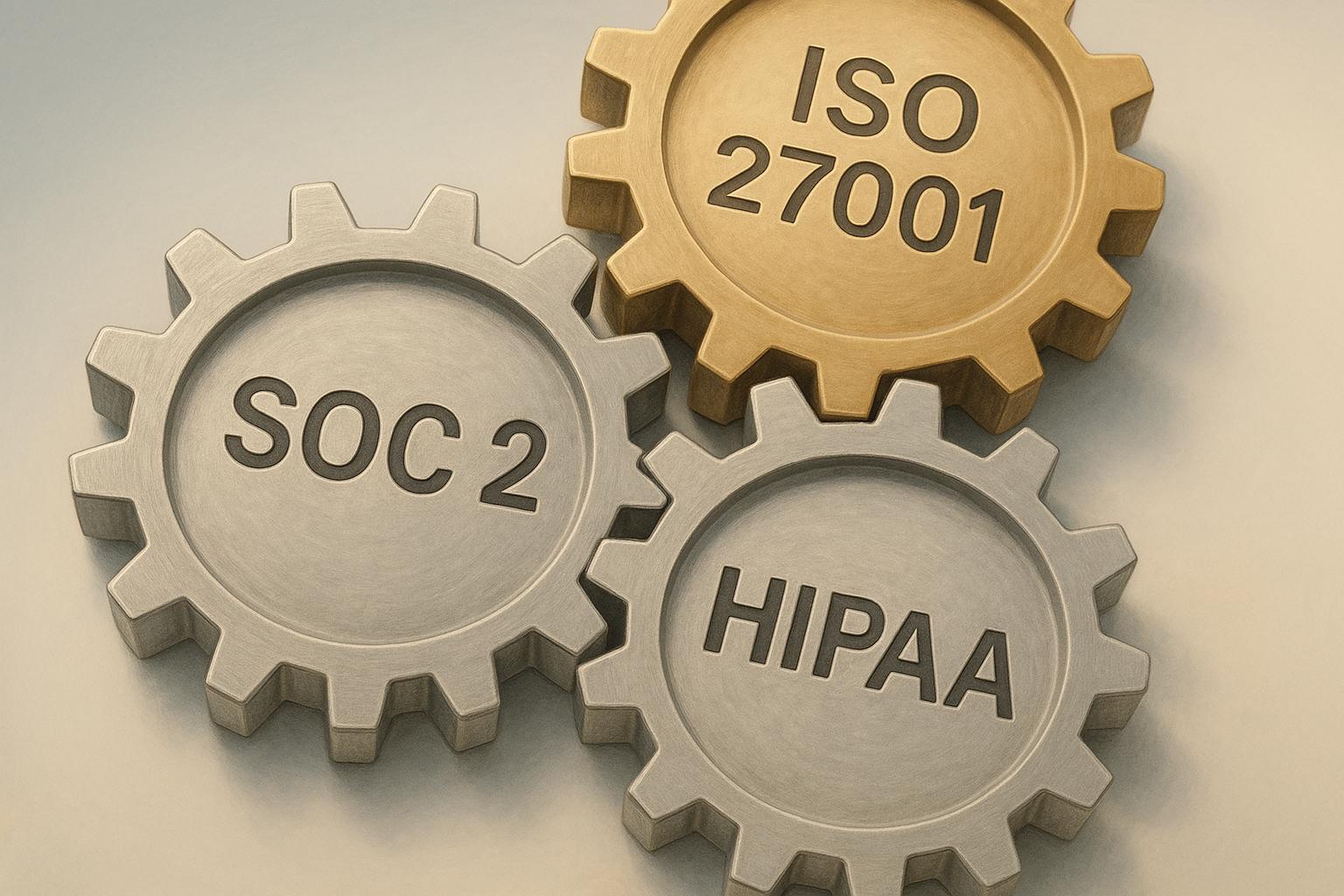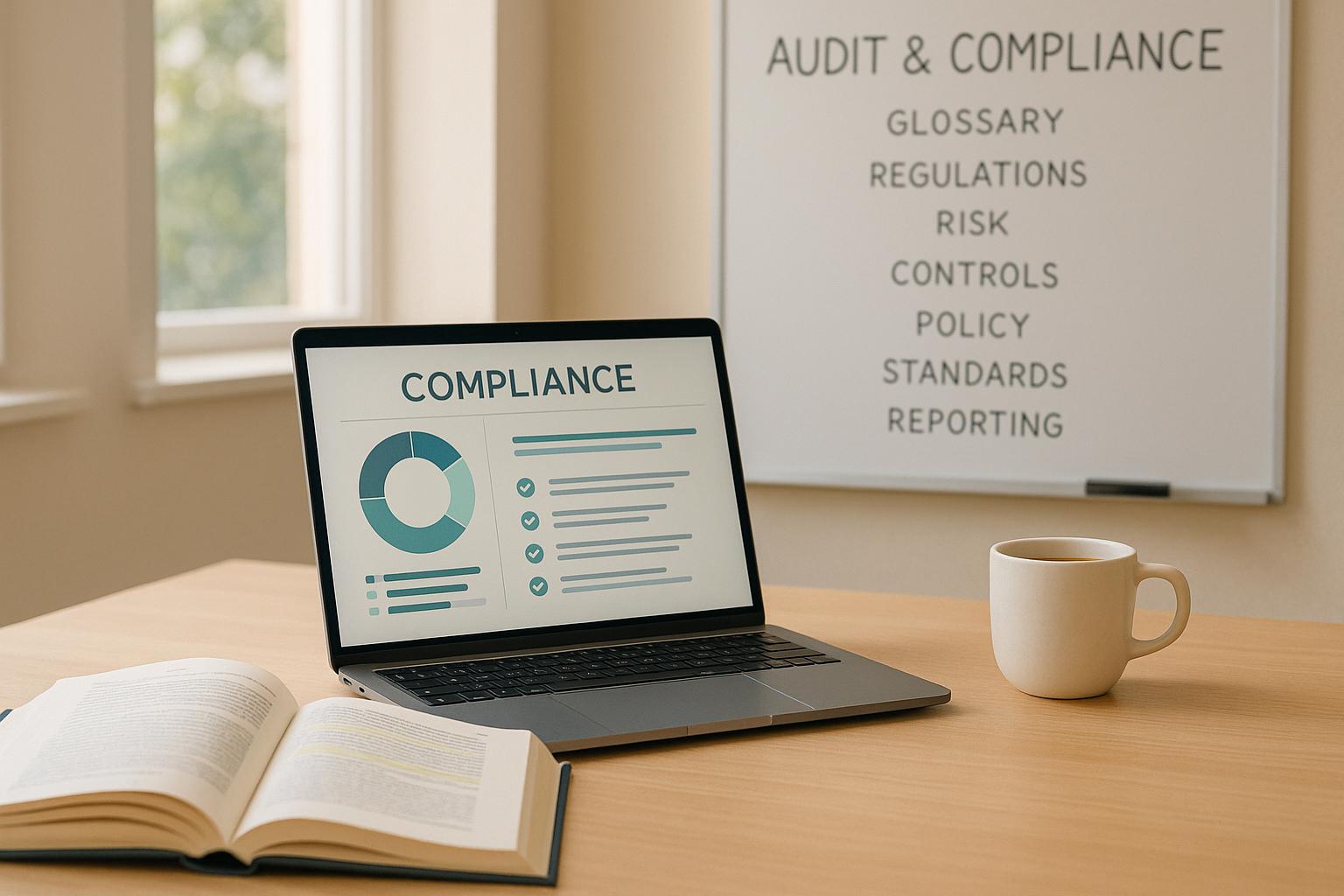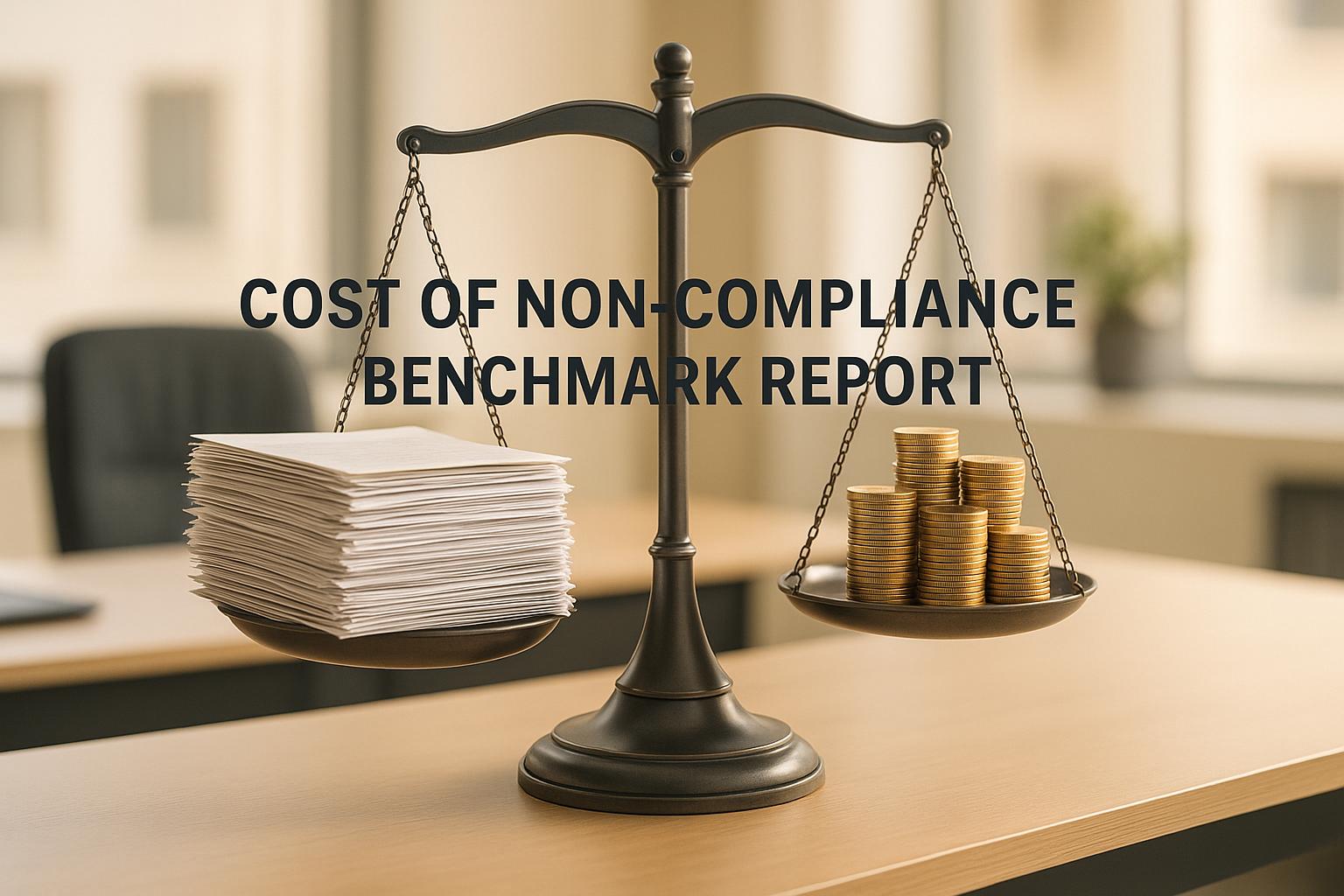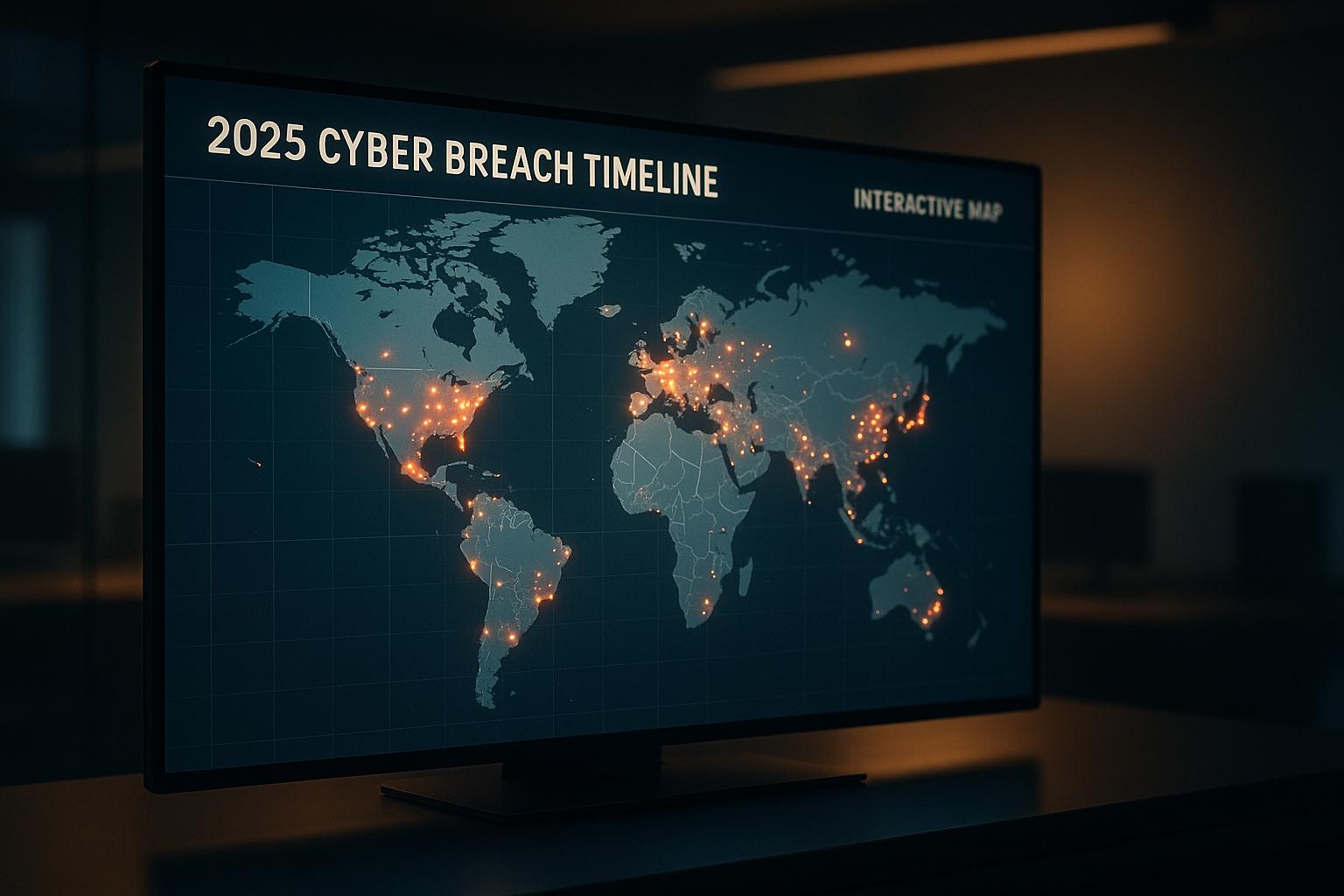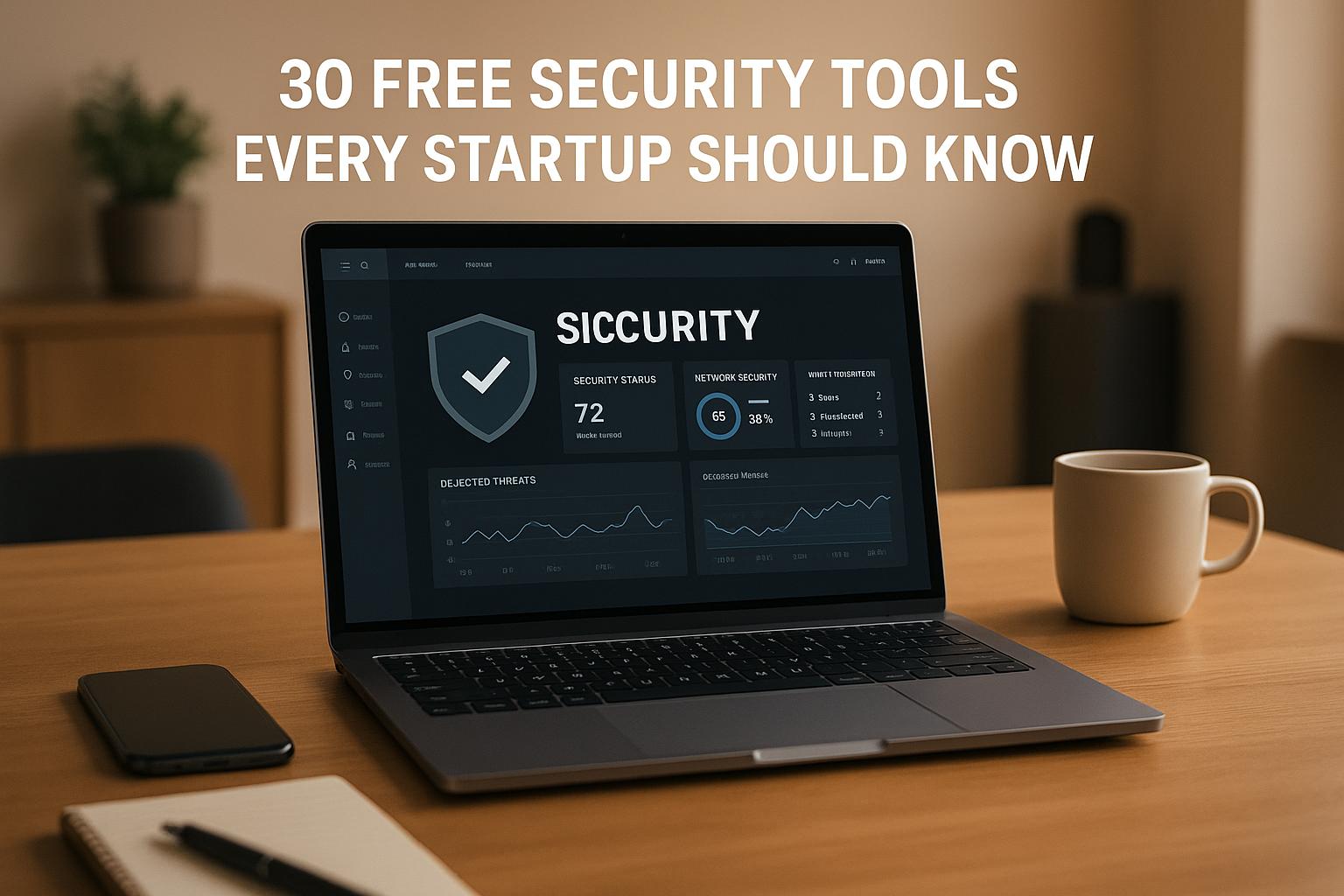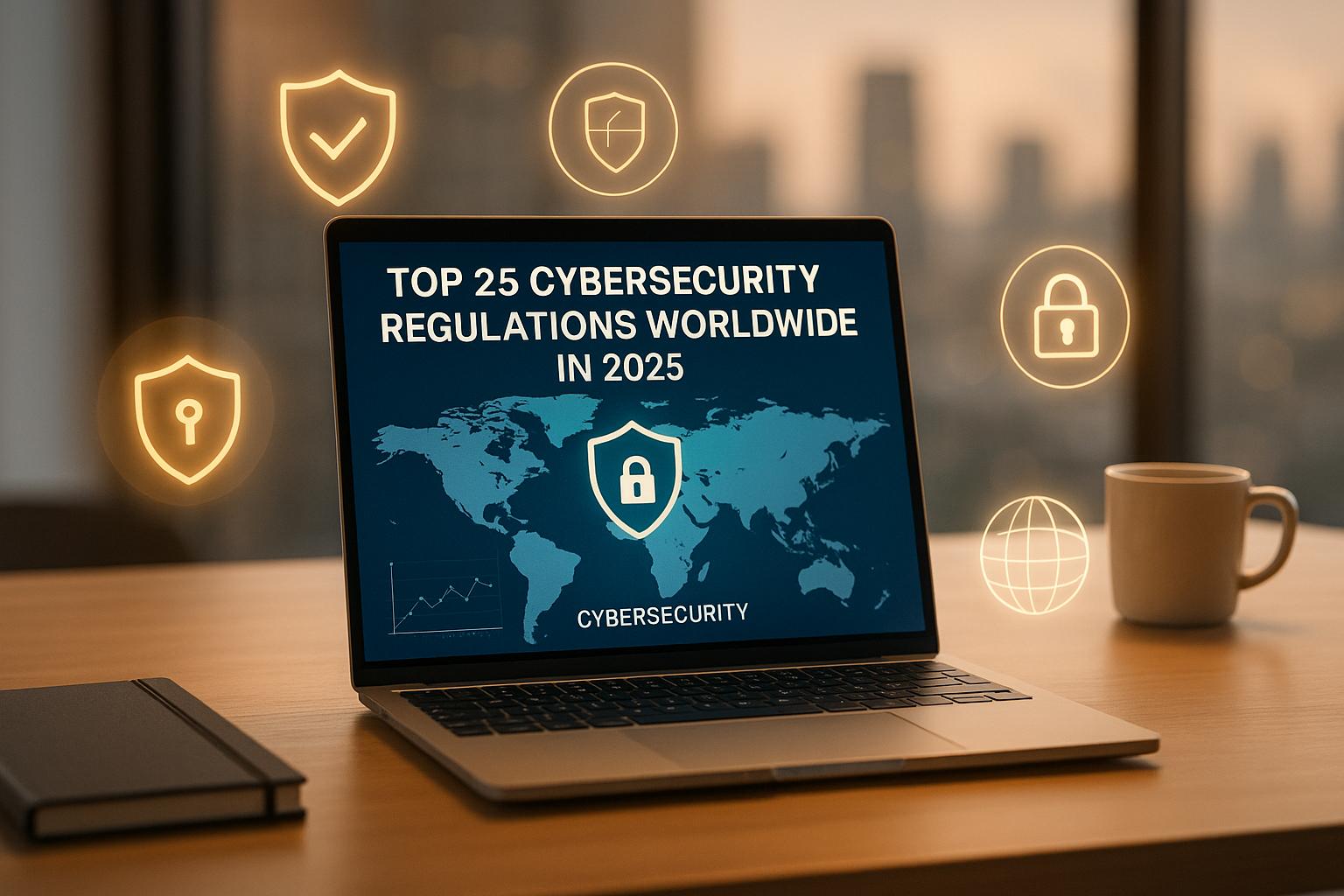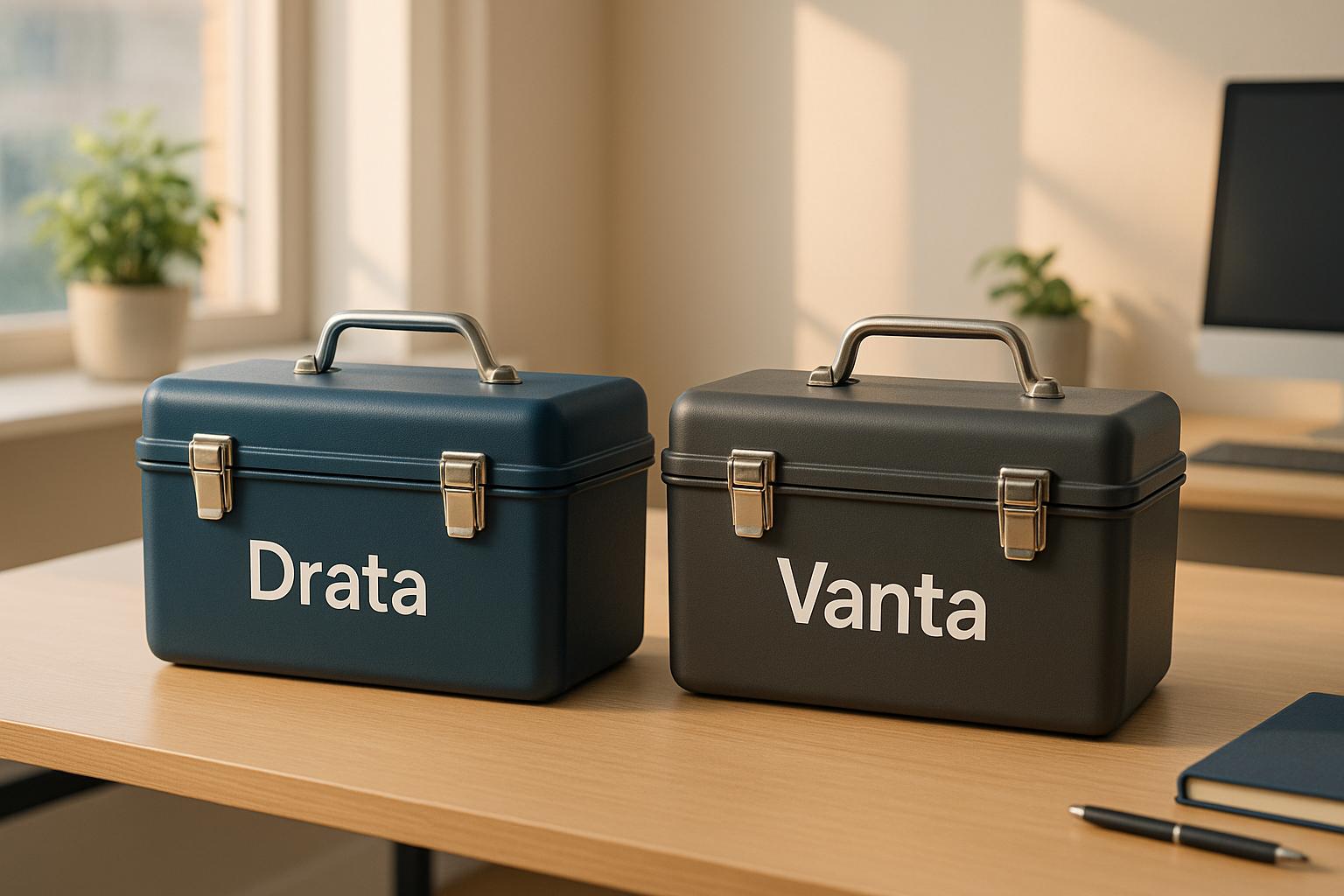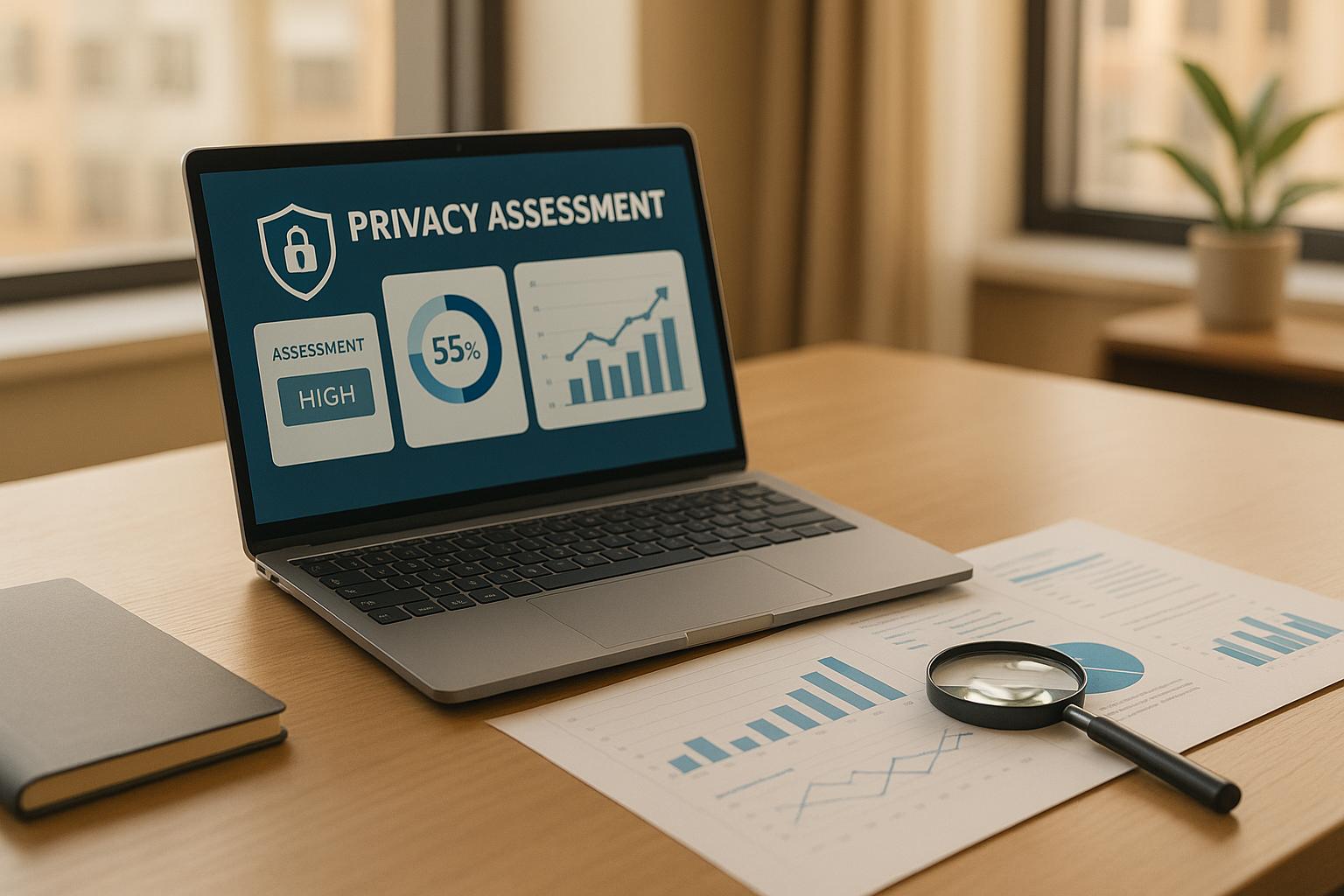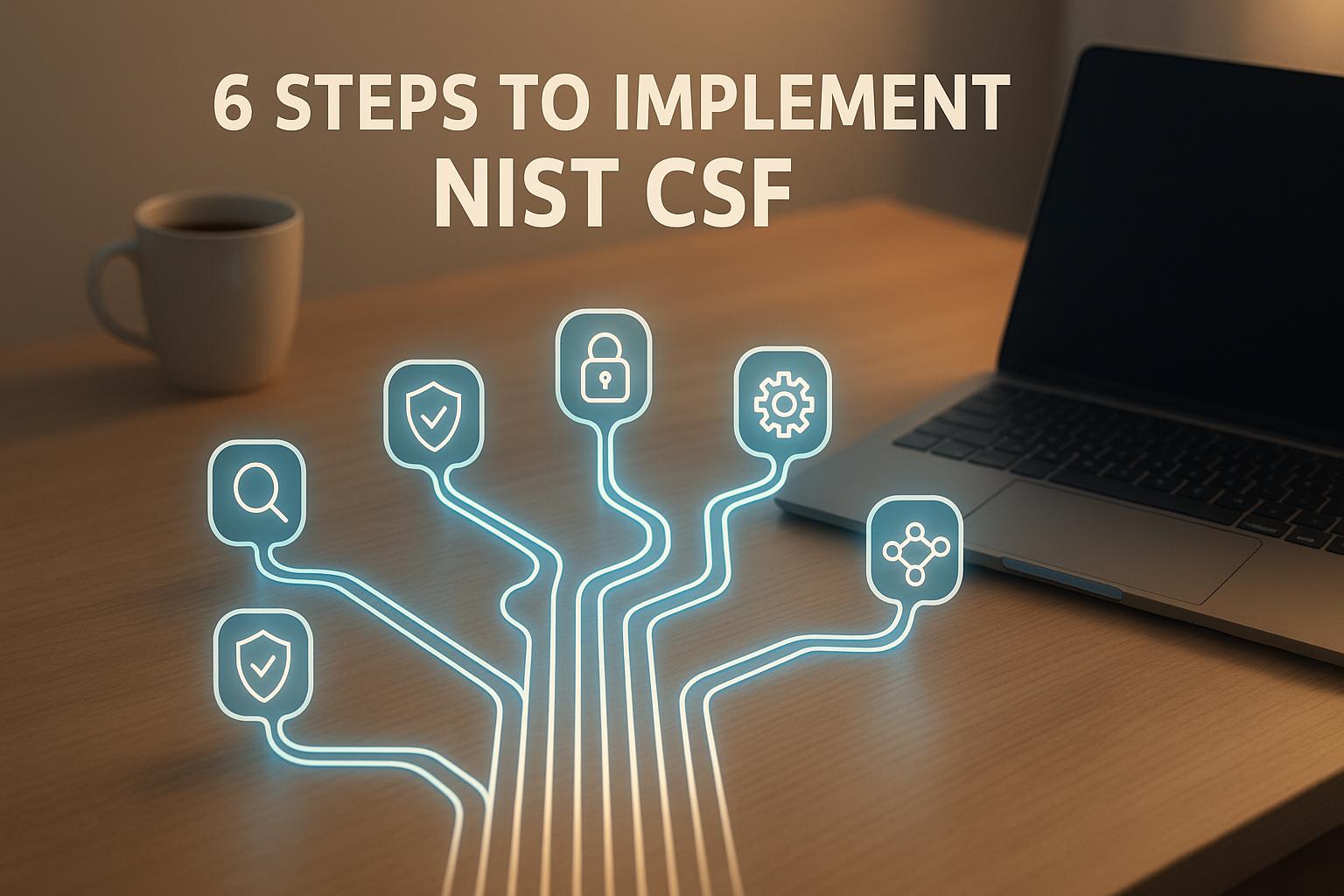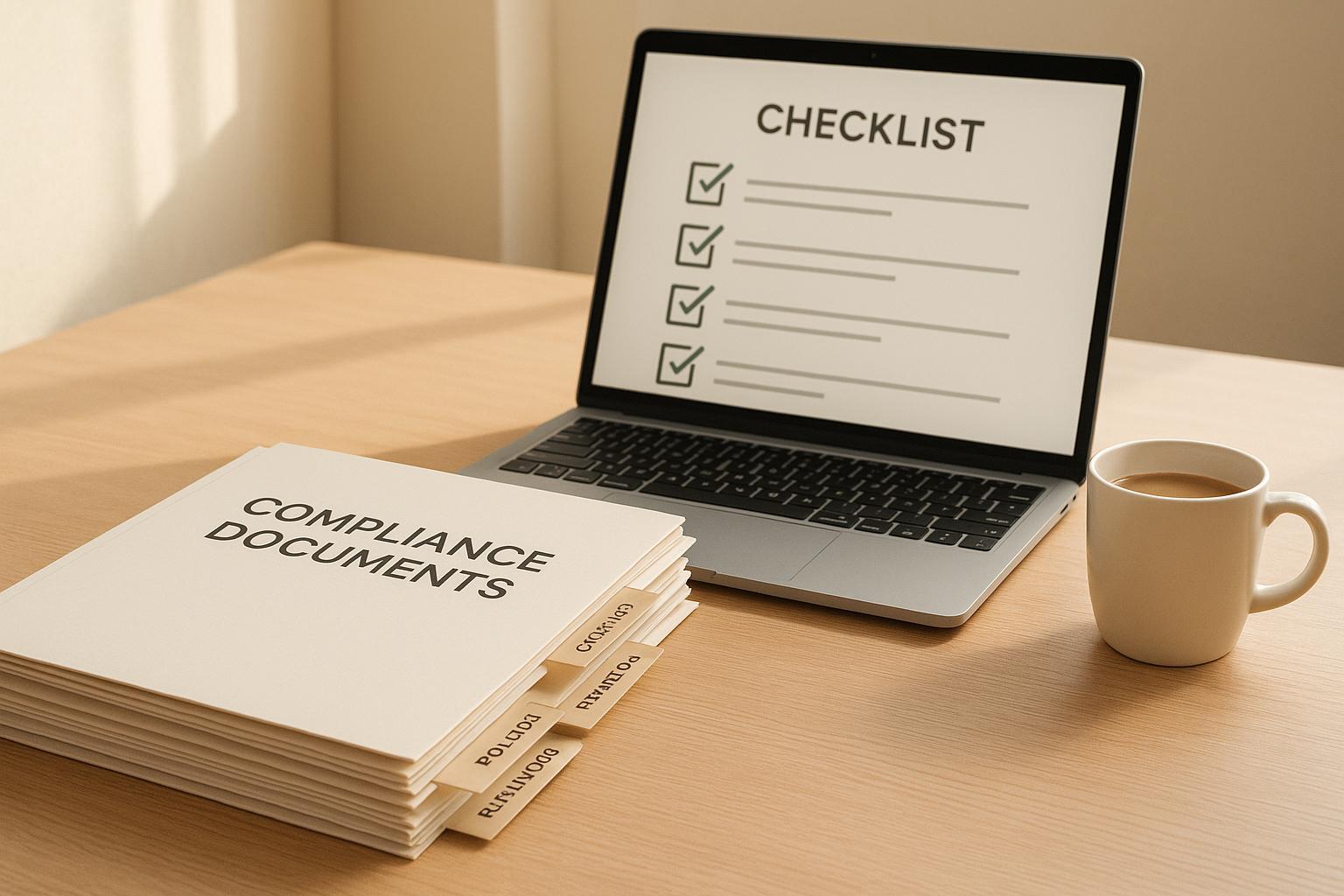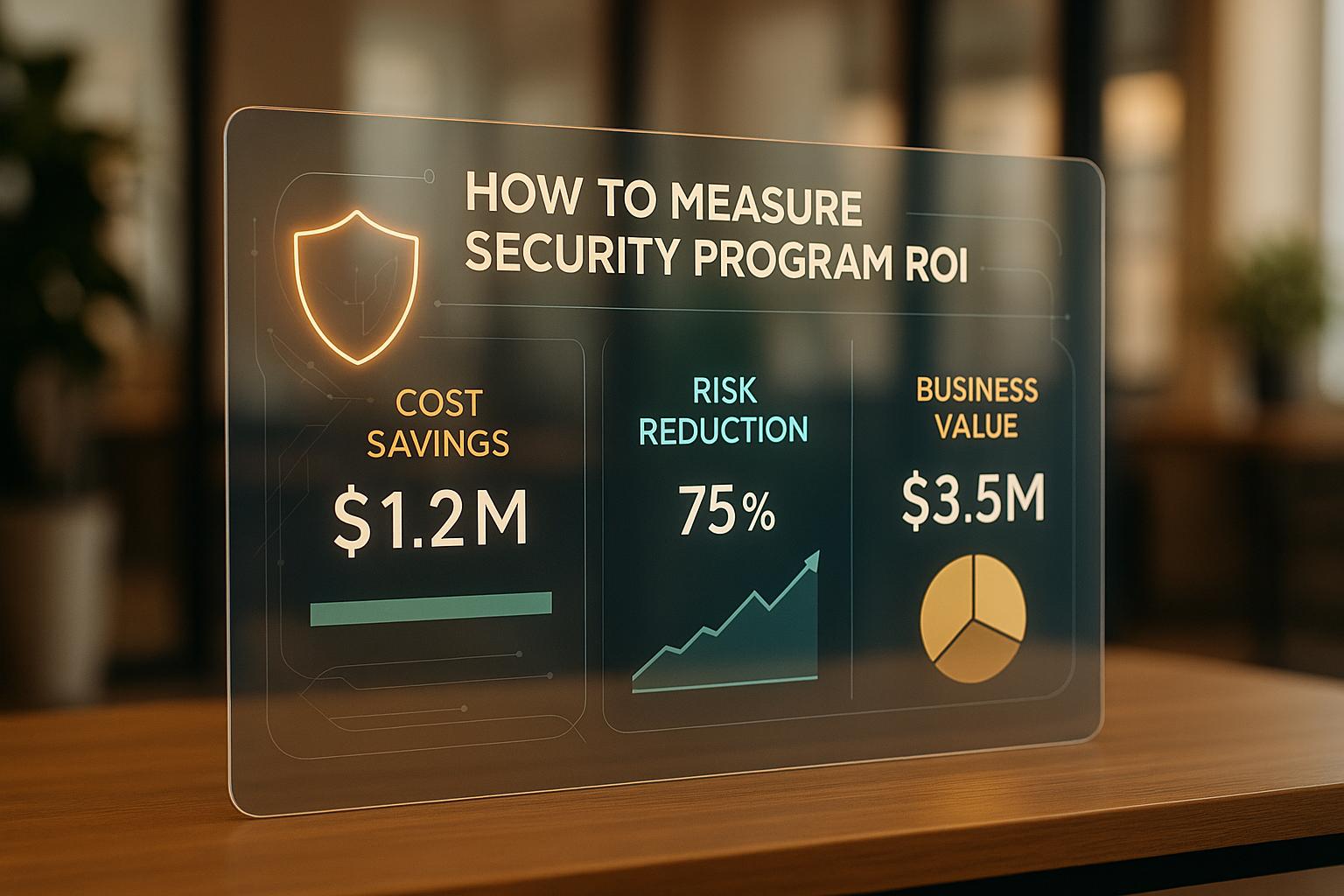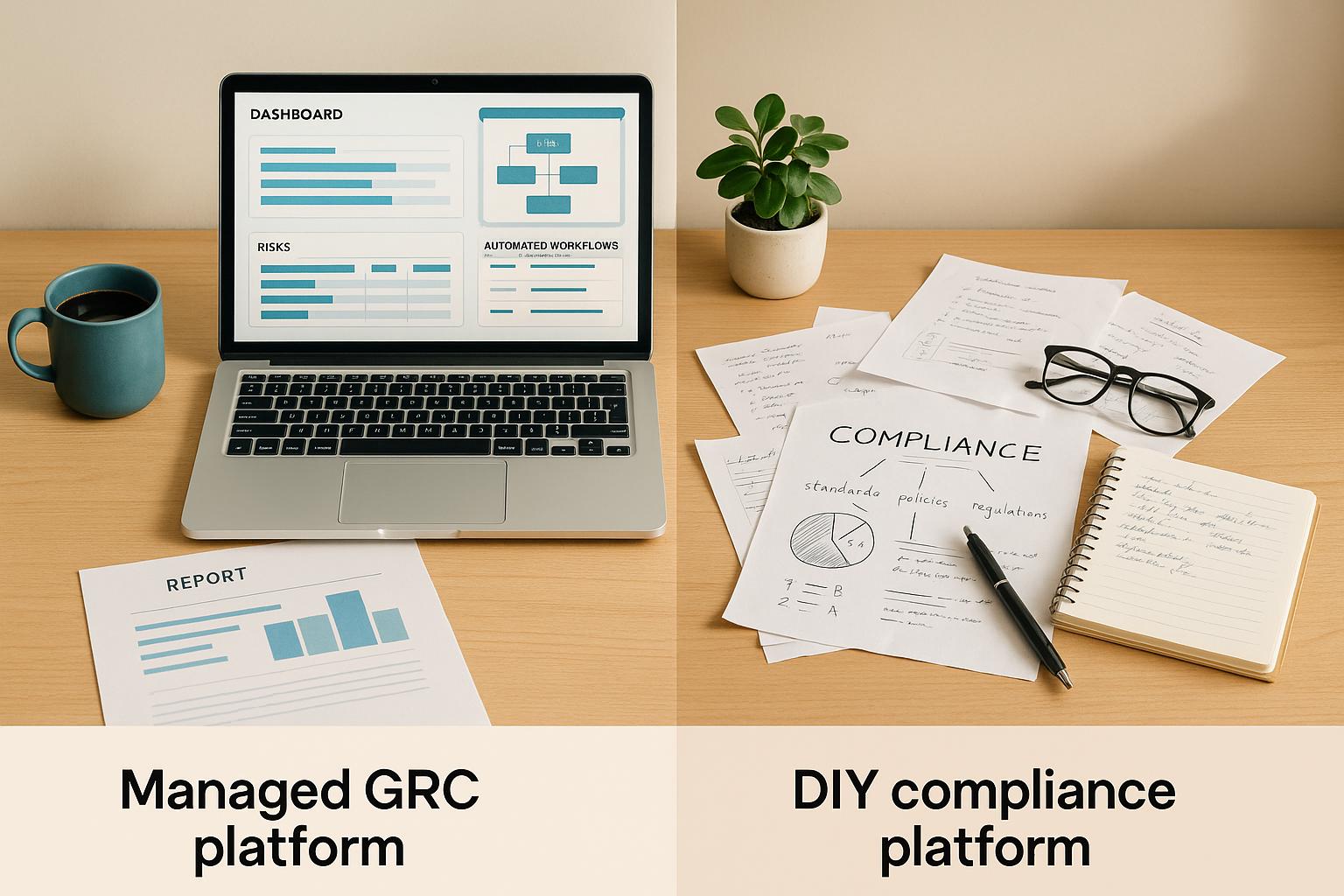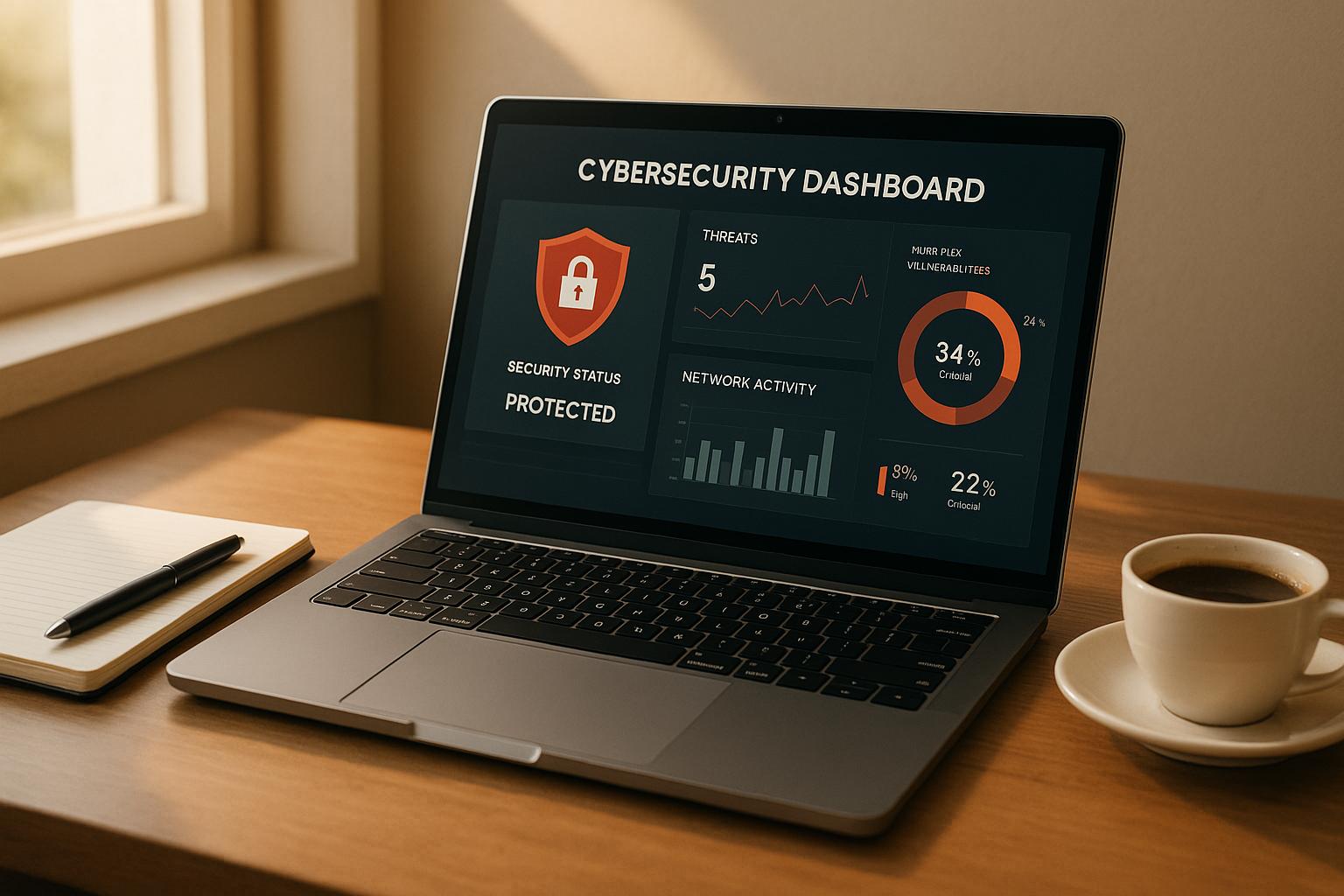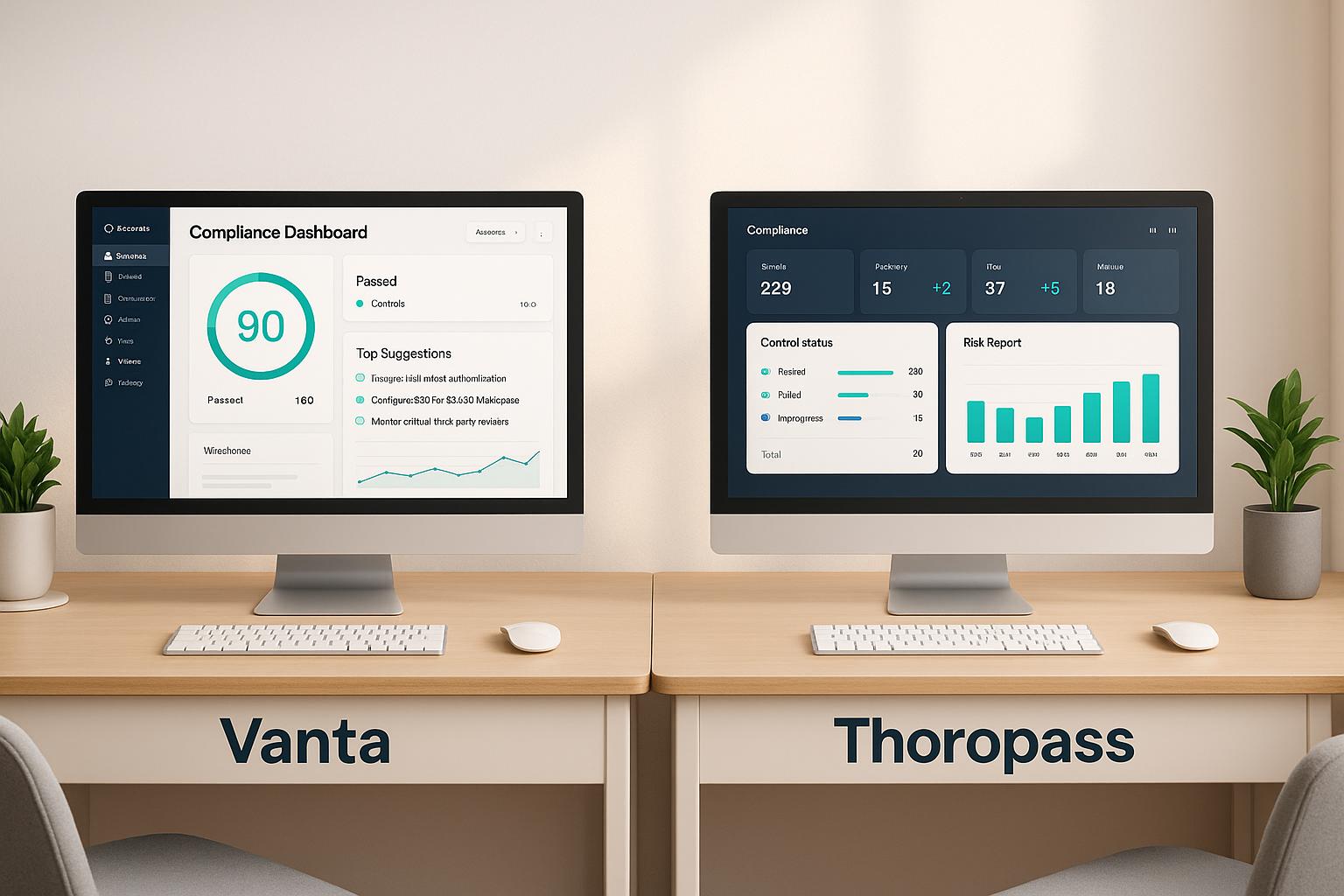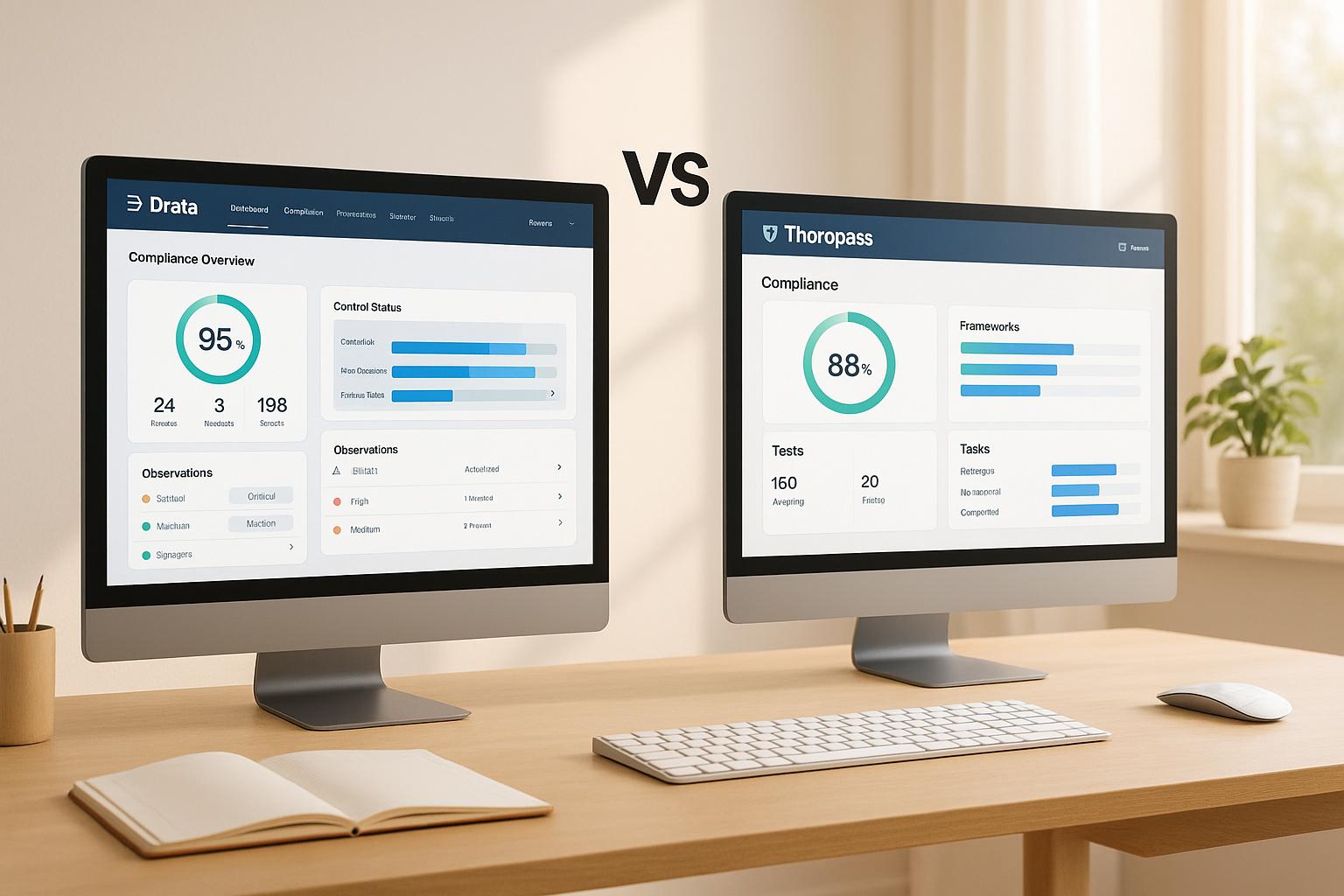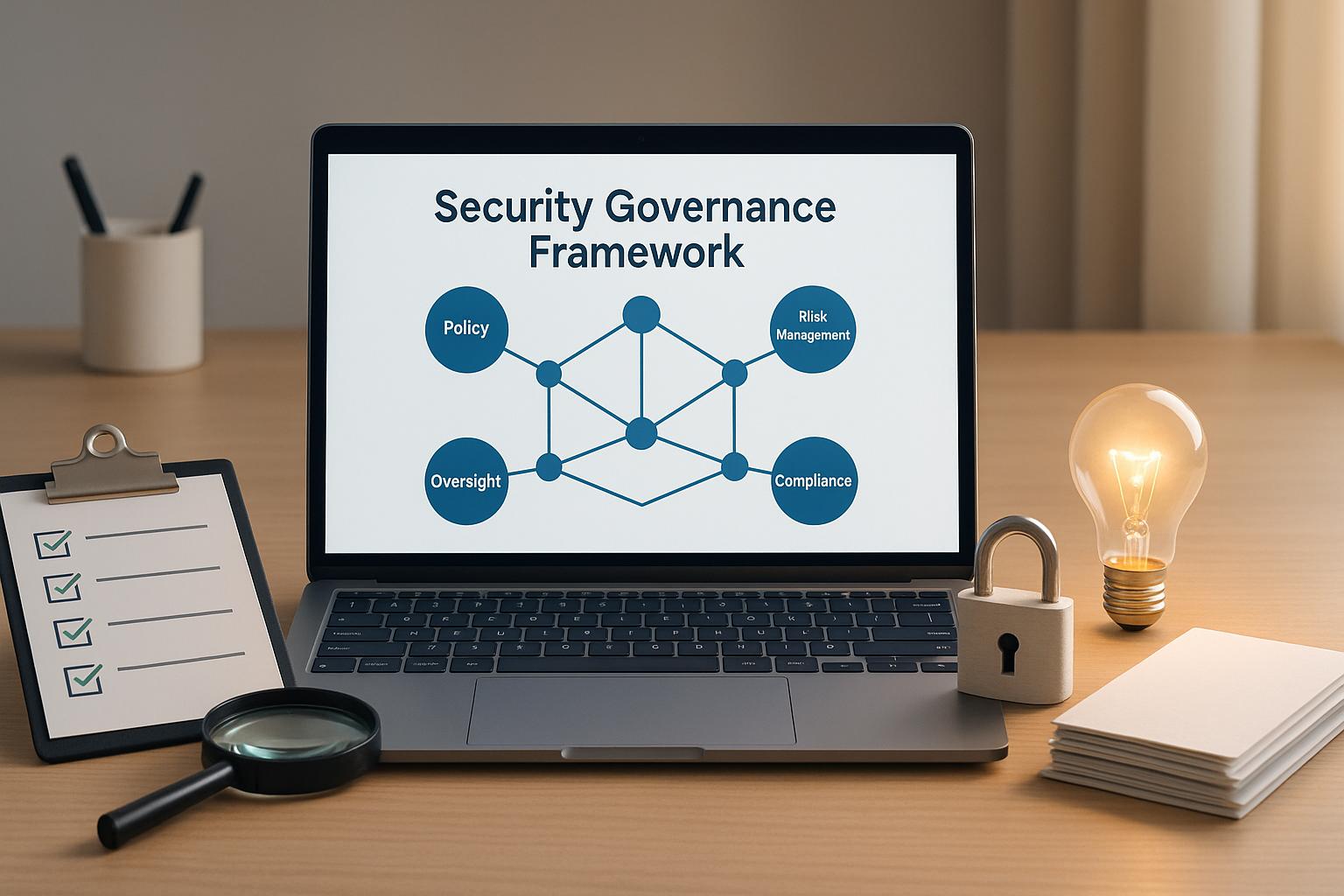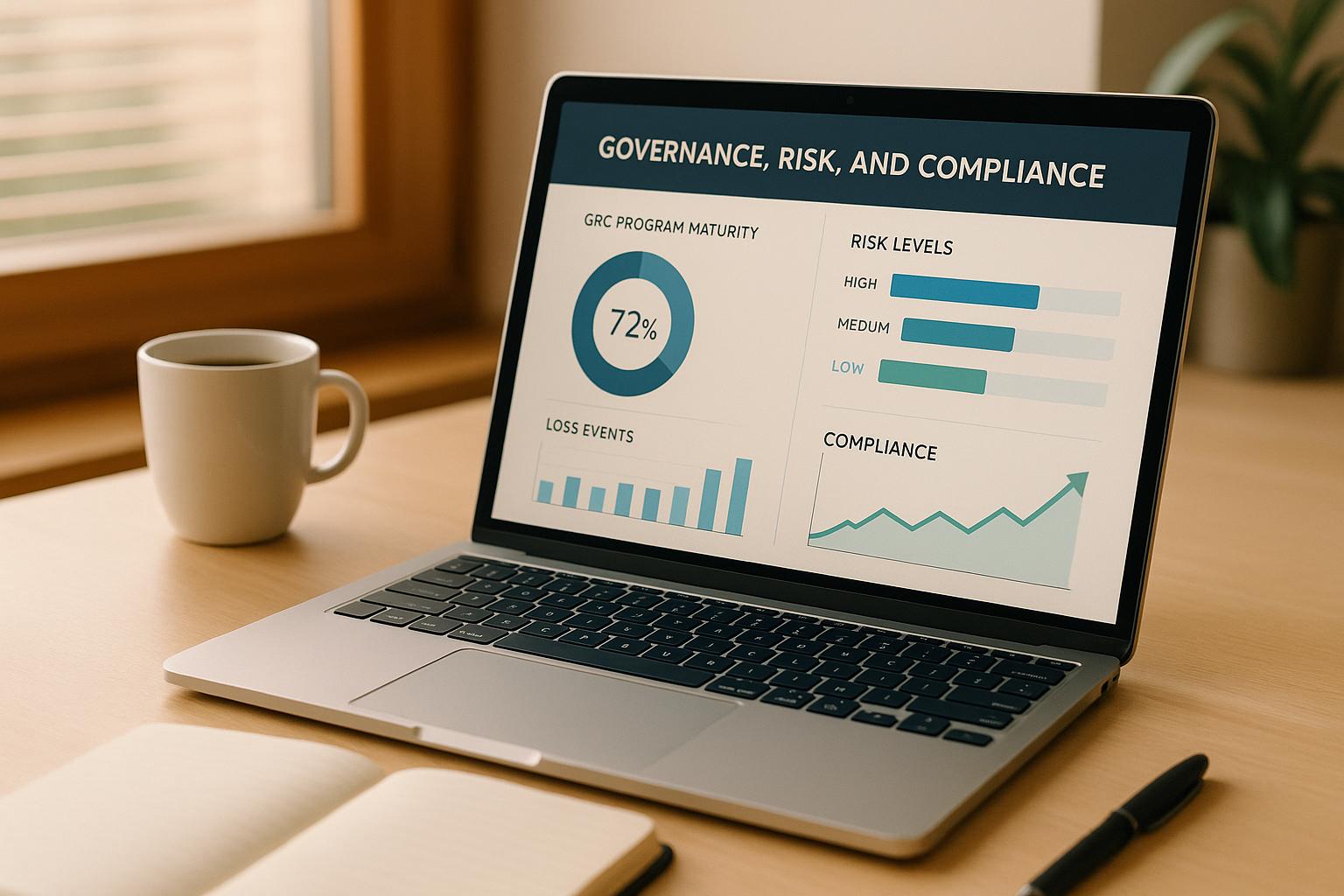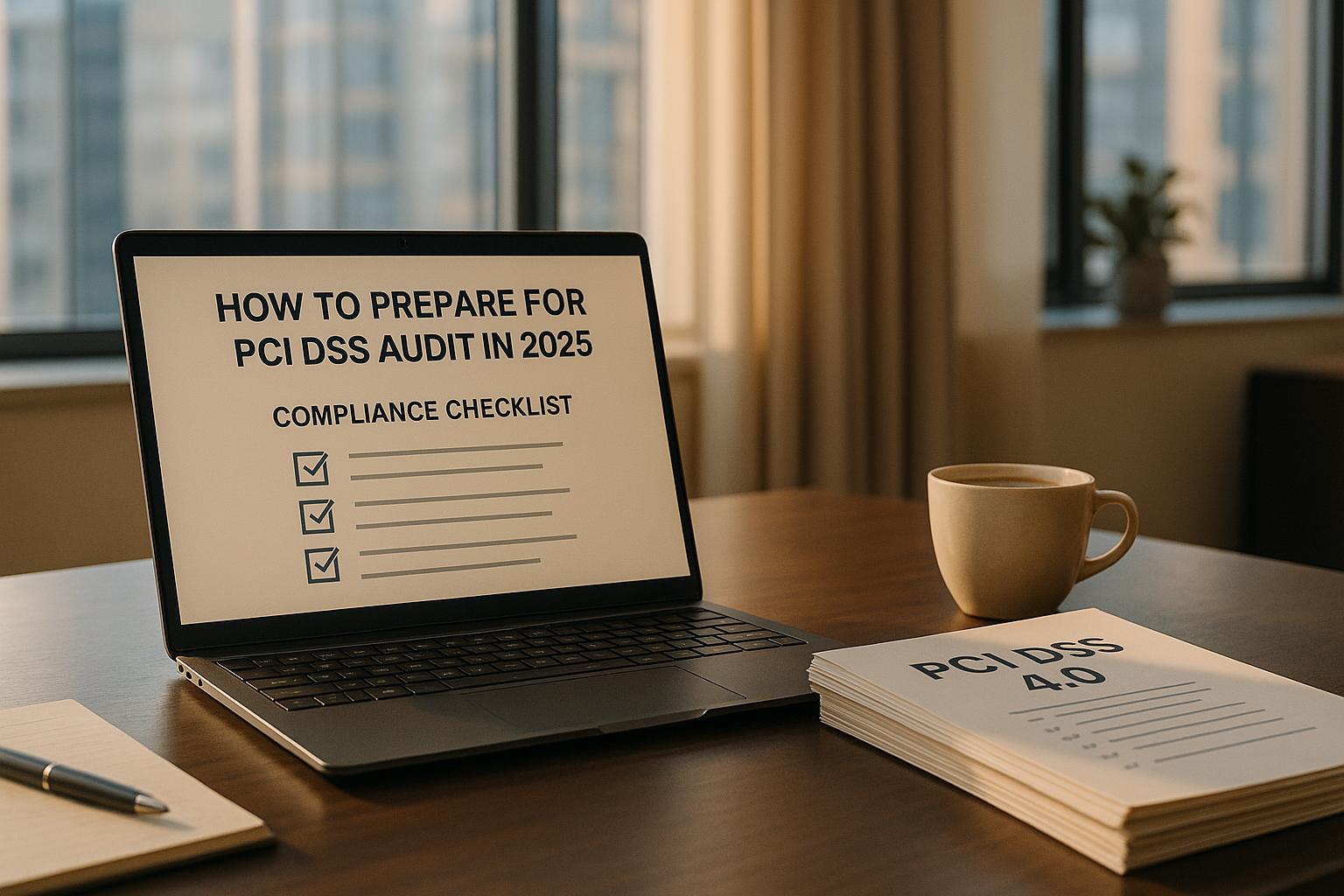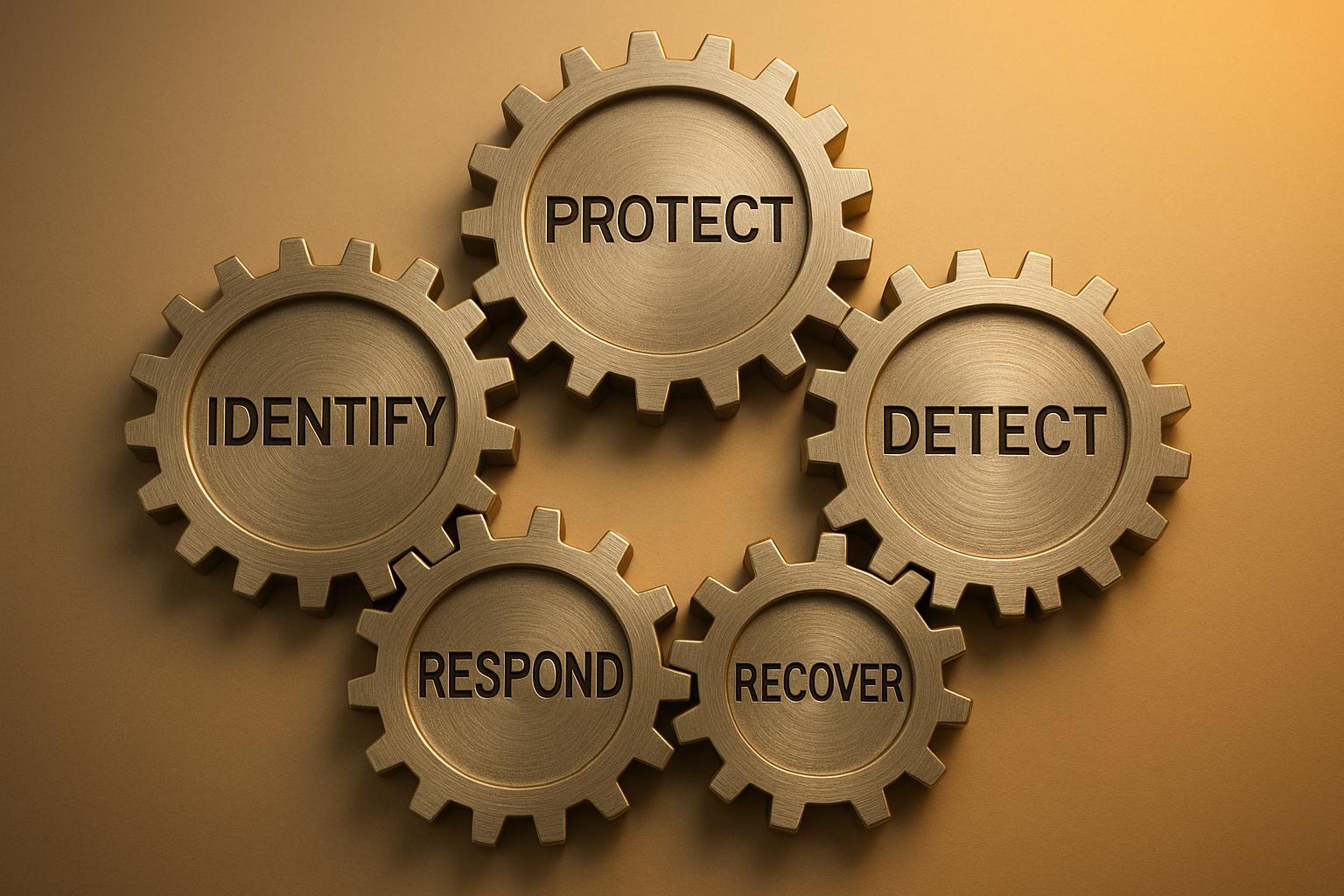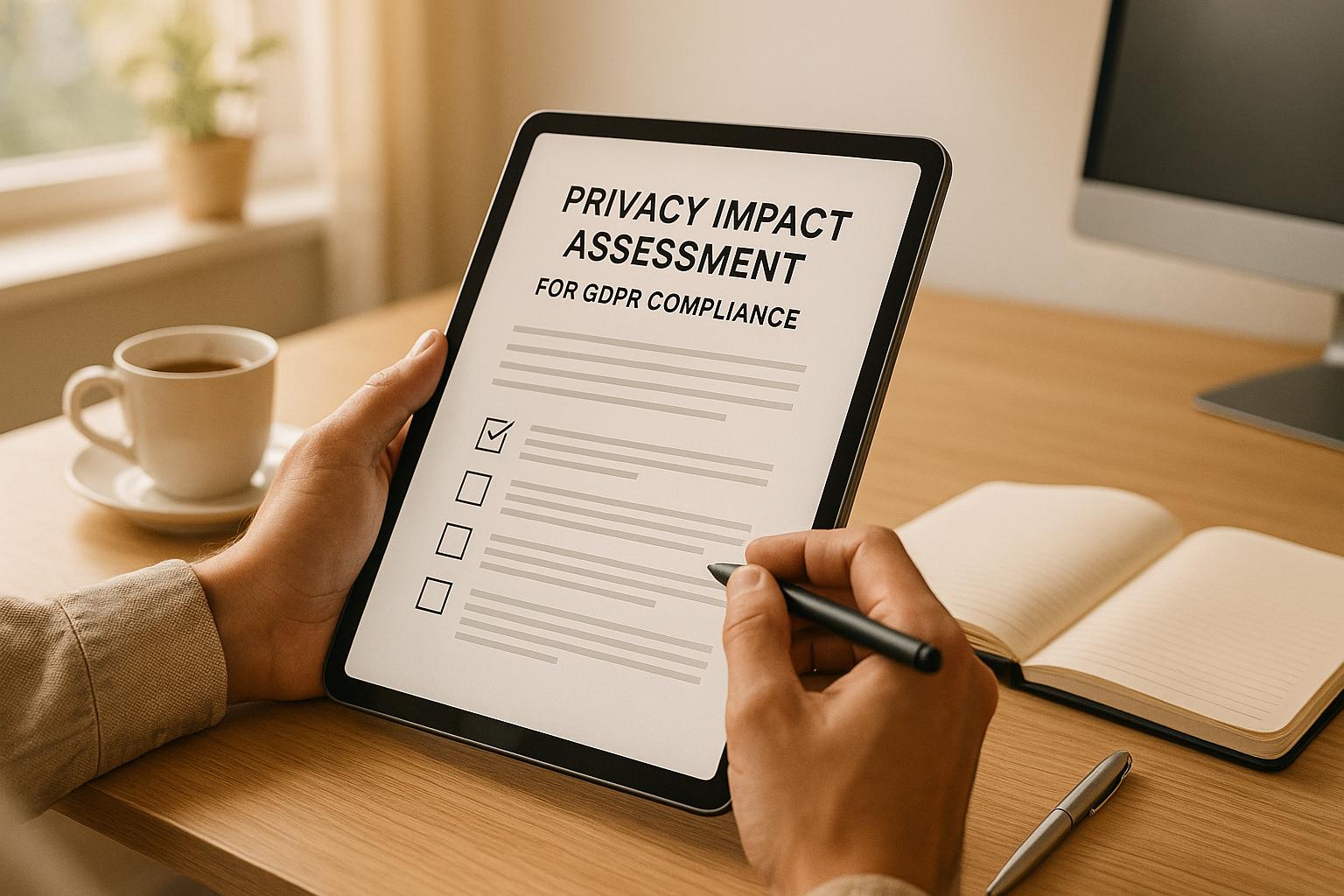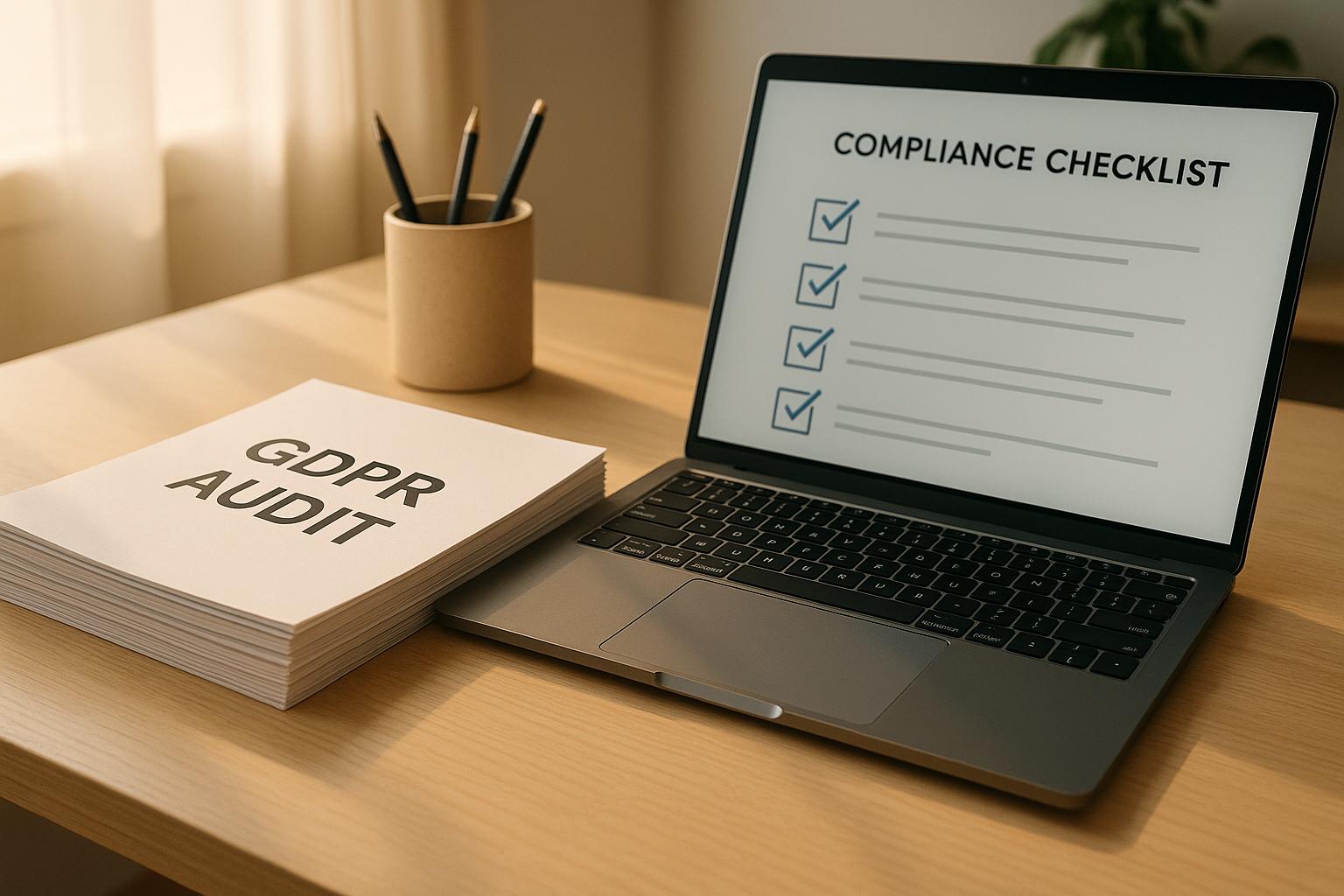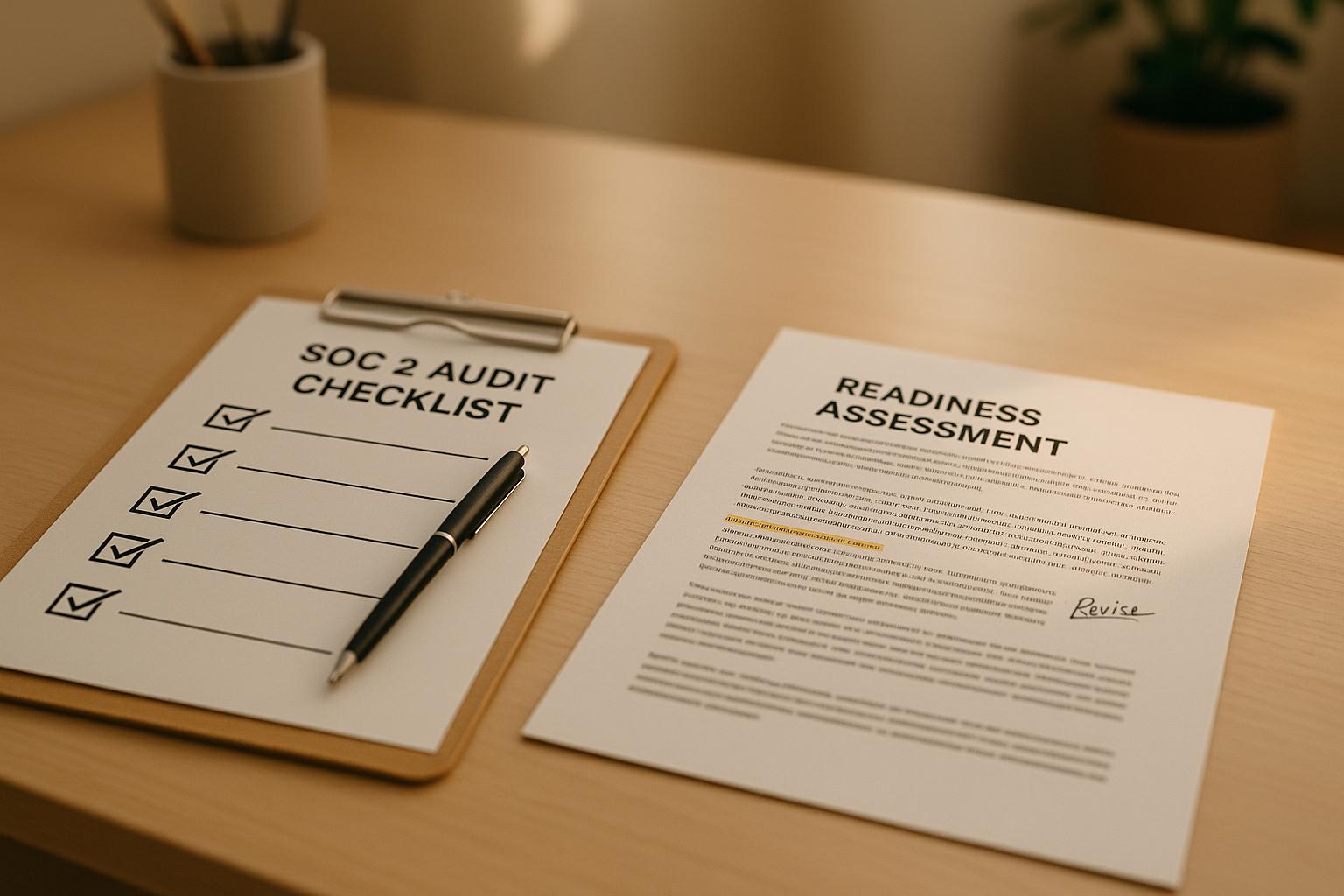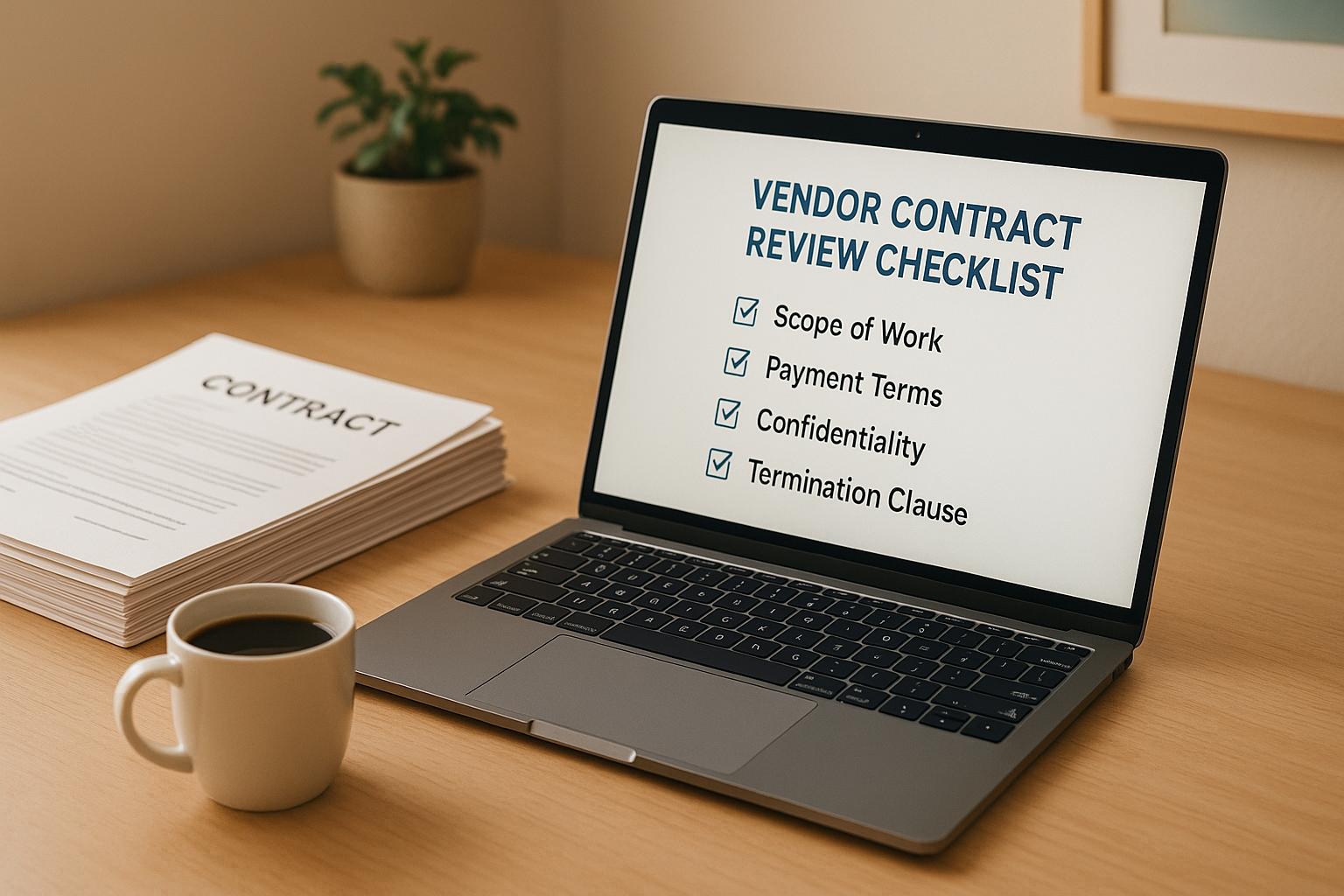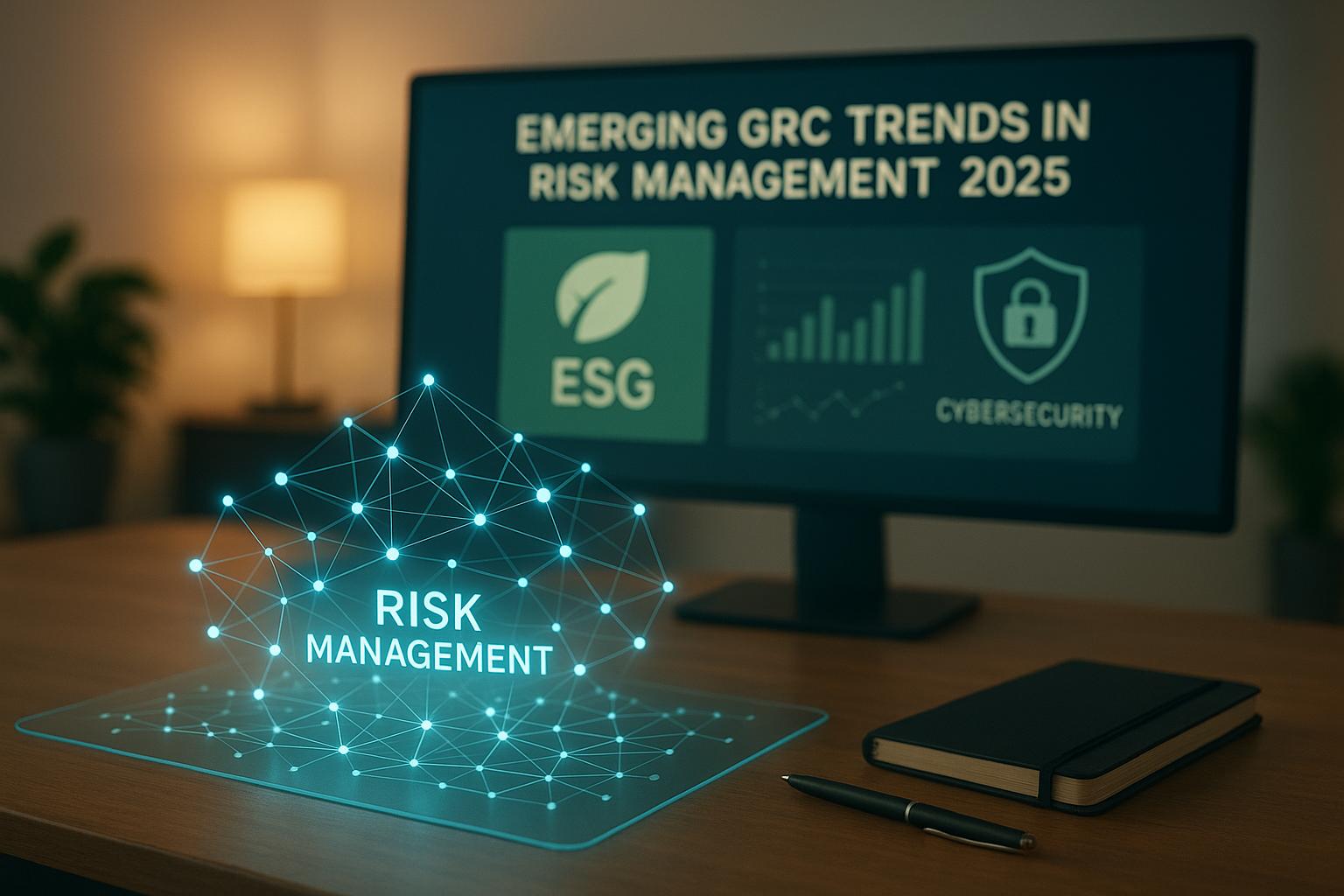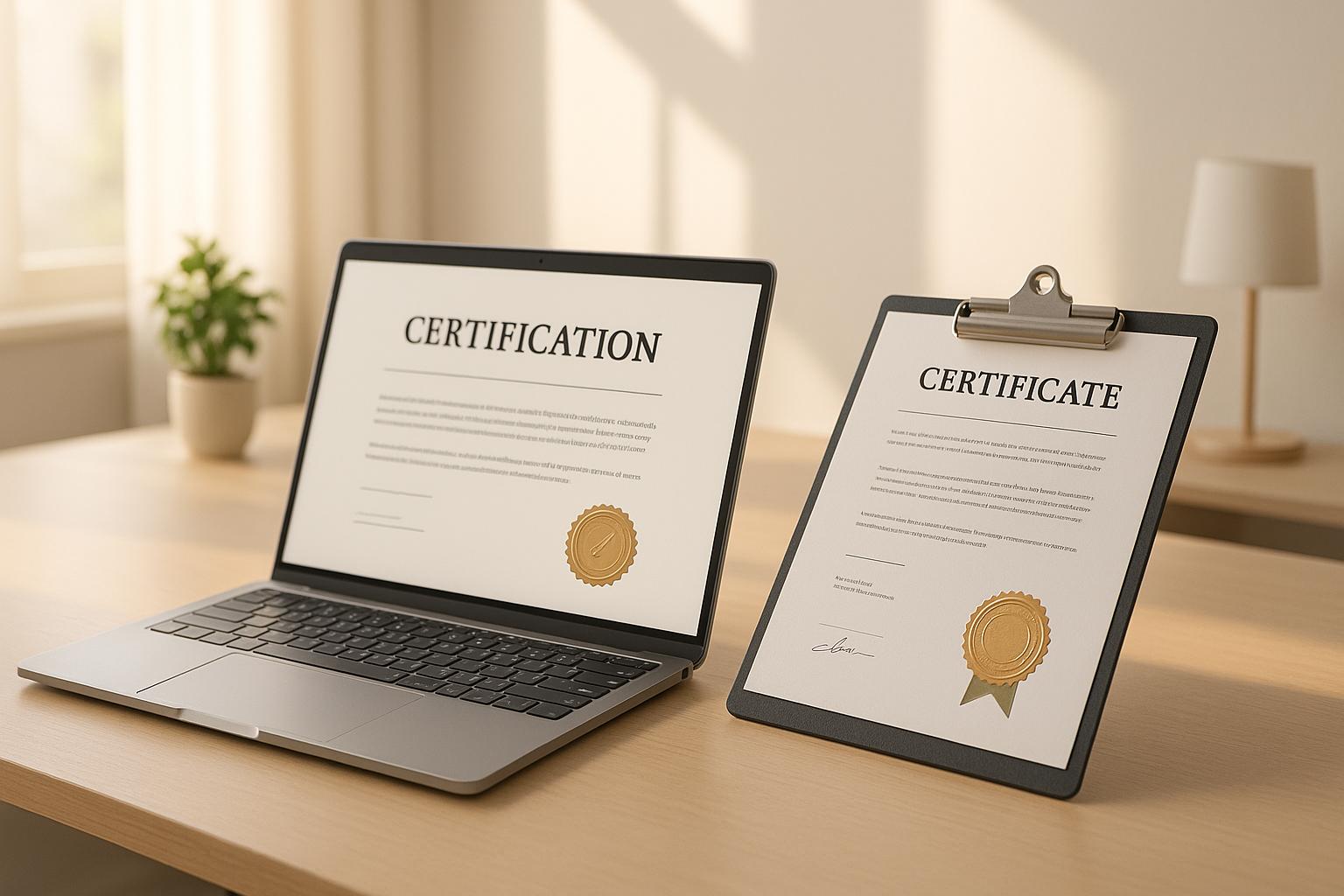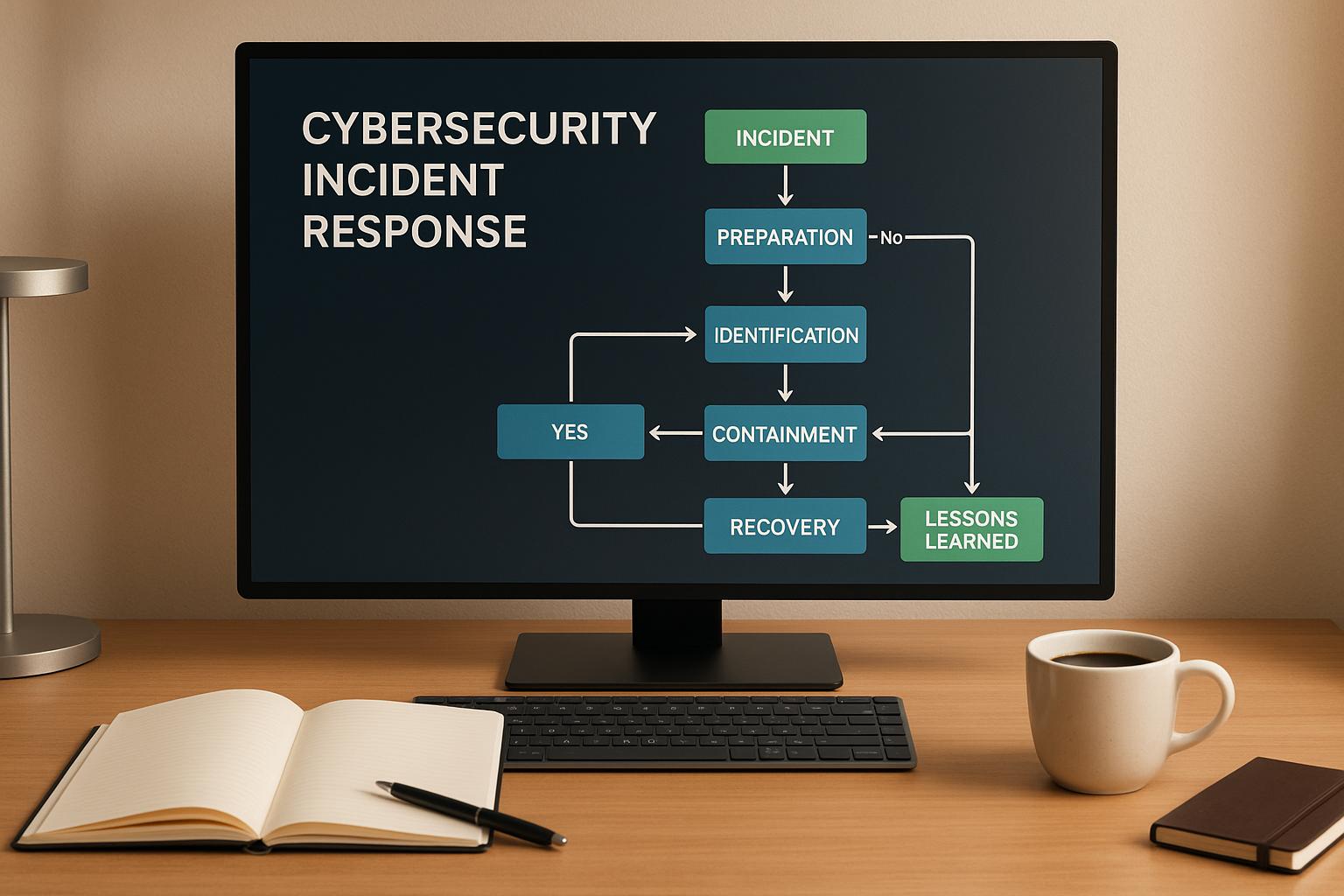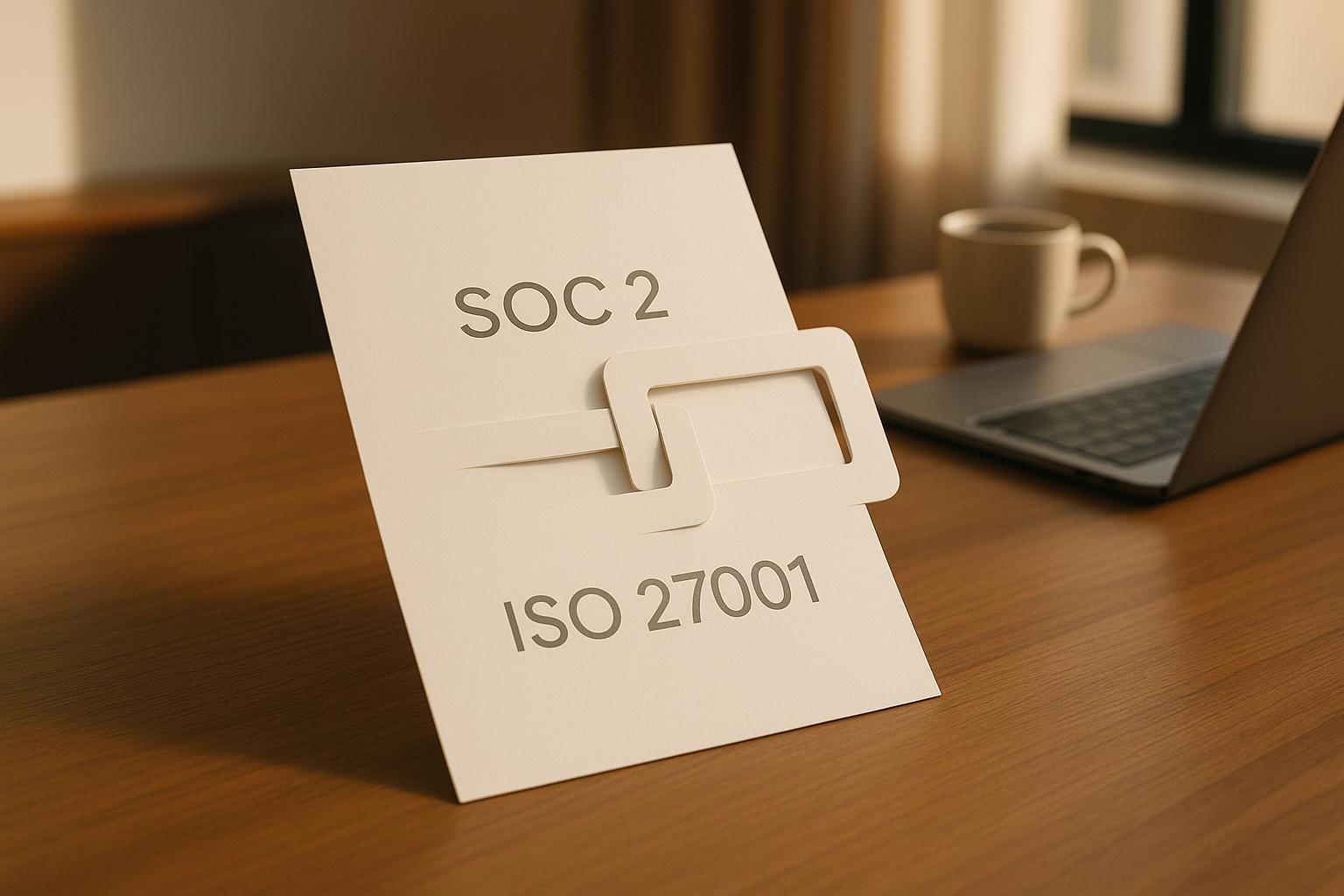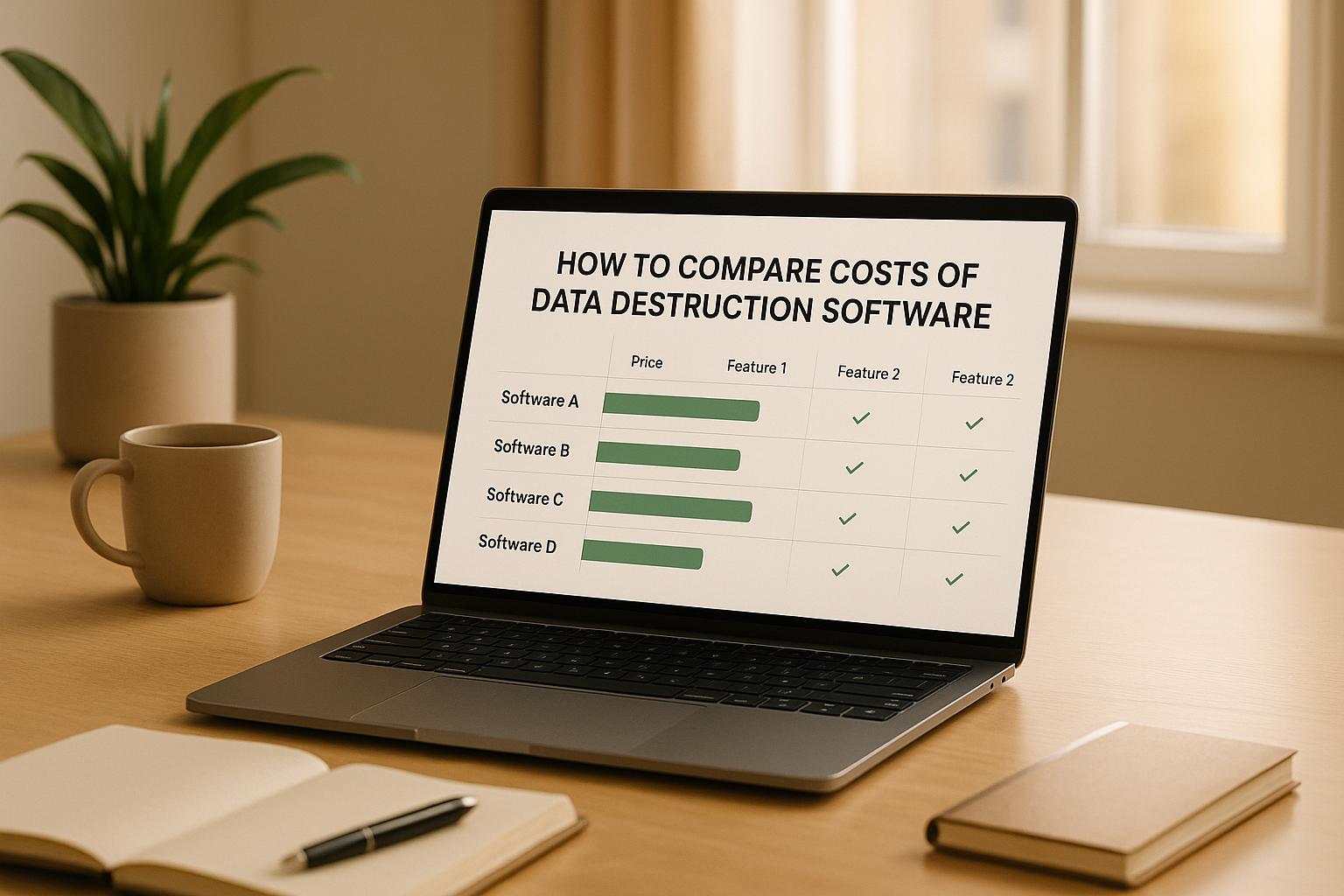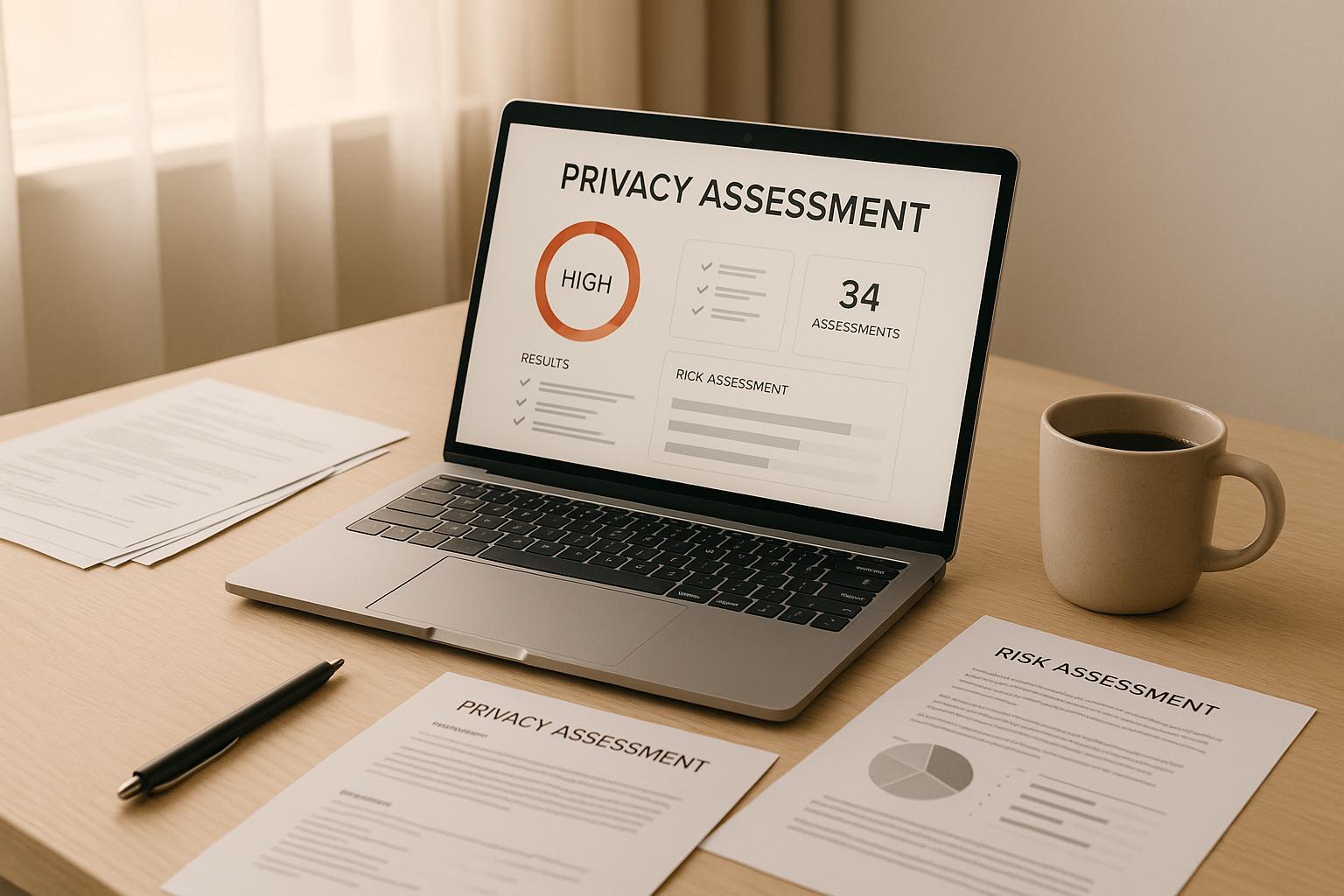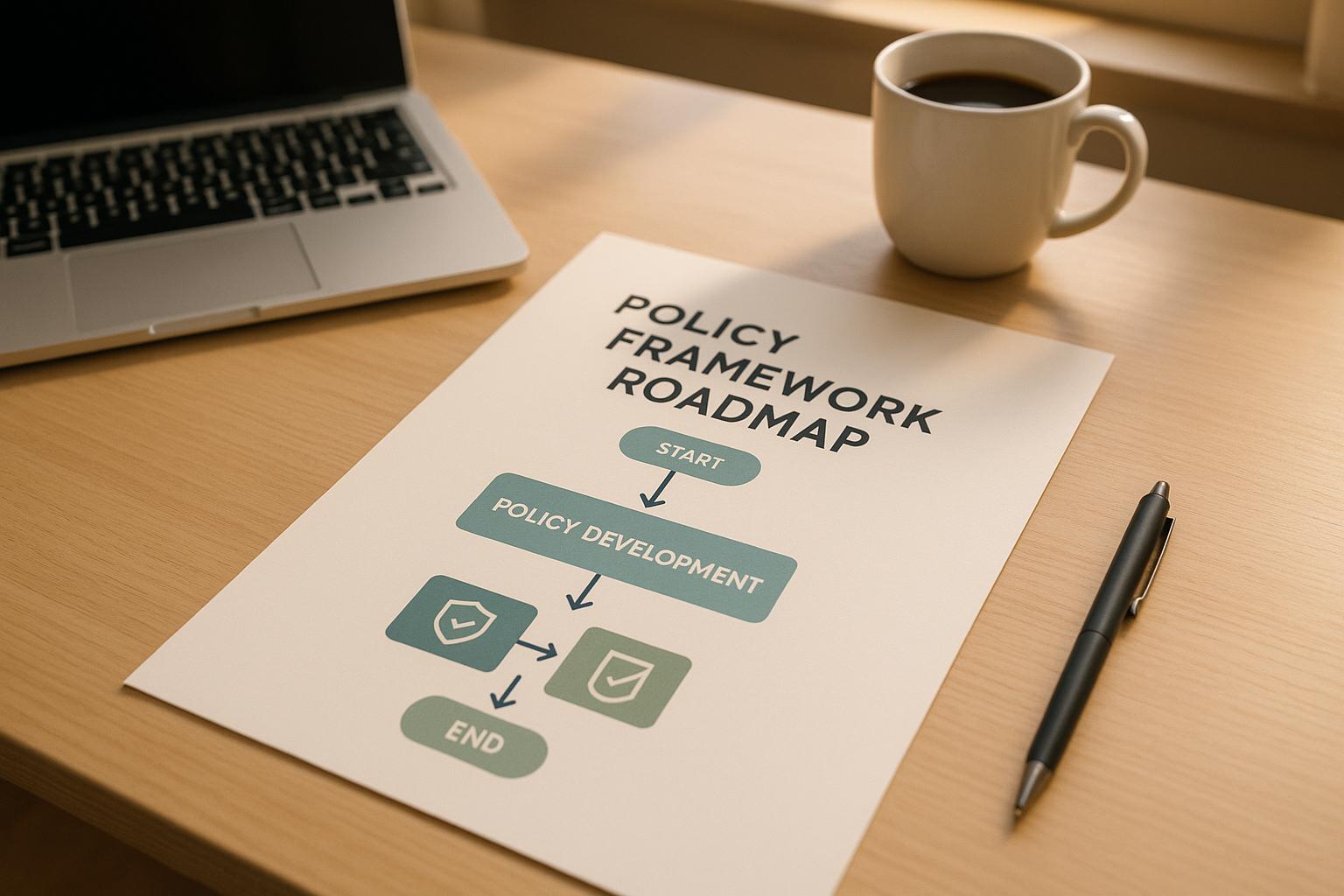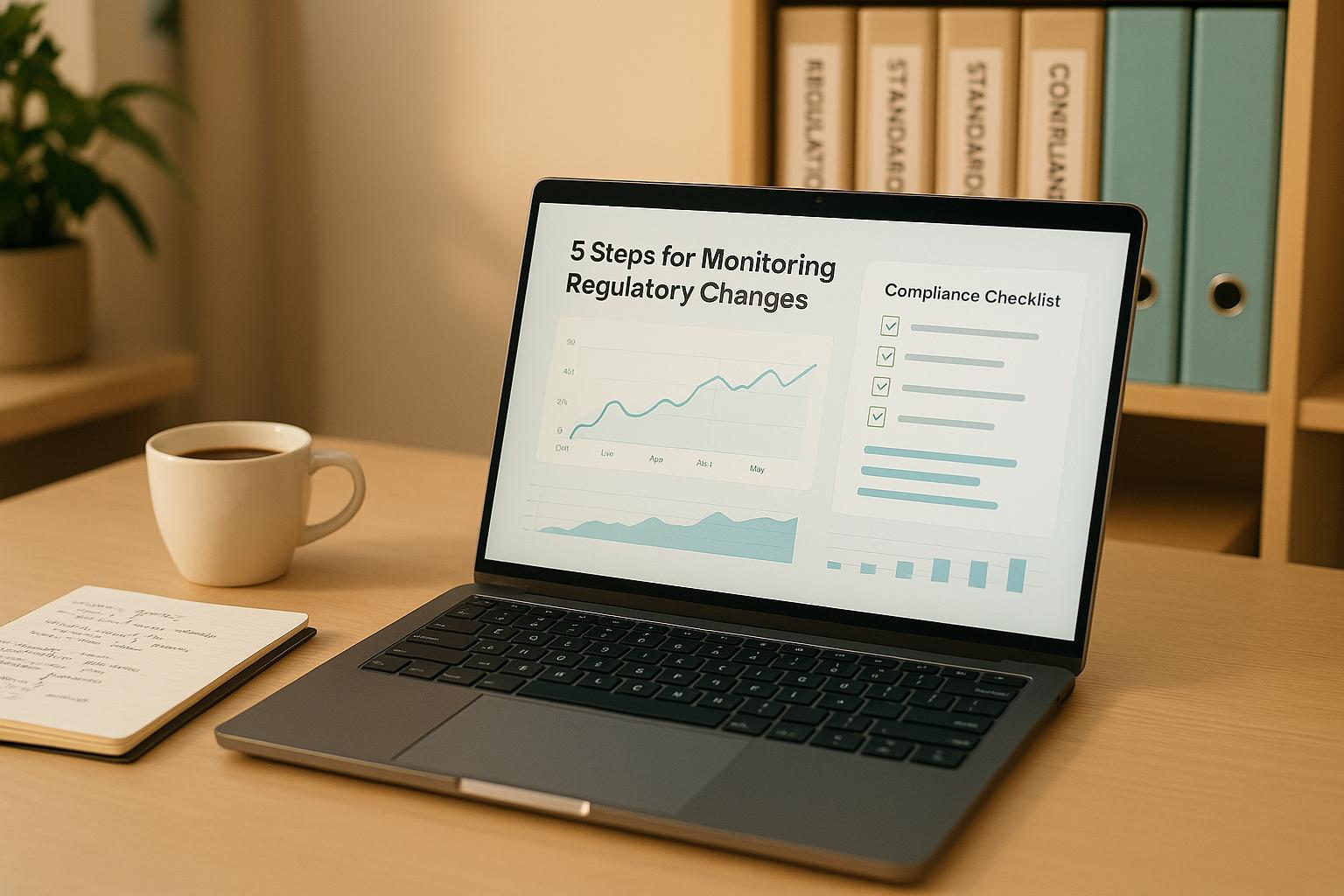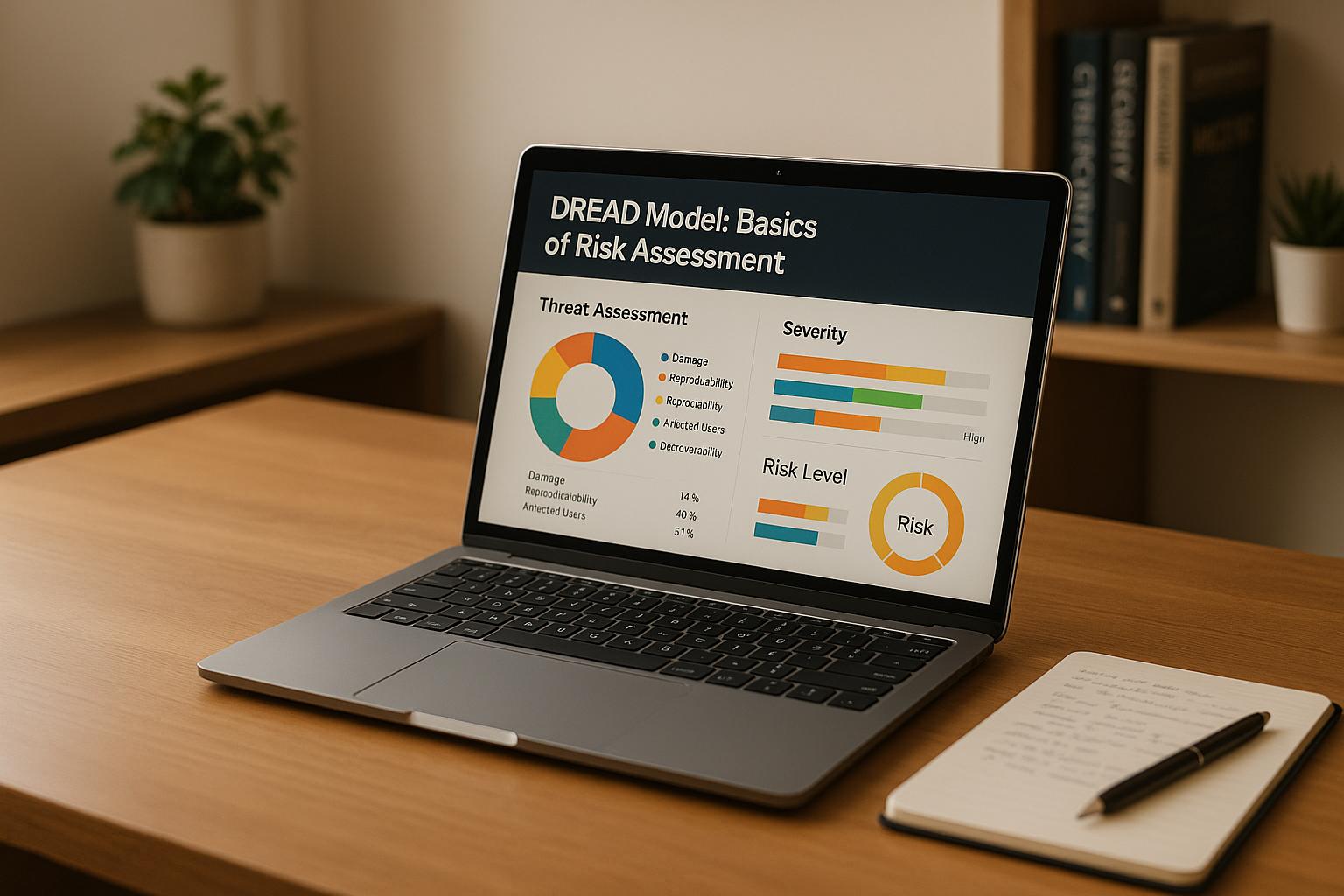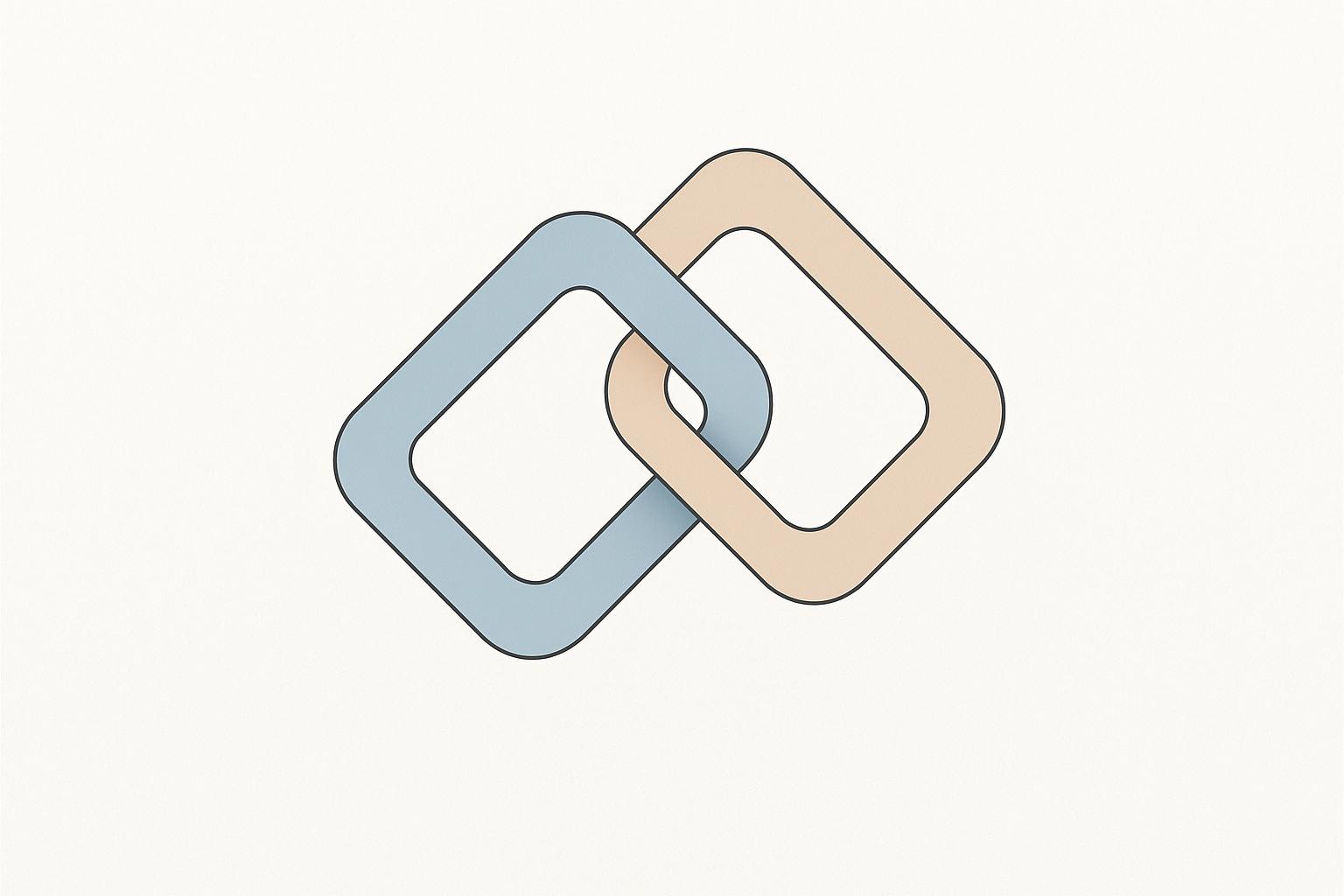
Choosing between Drata and Delve depends on your compliance needs and business stage. Drata is ideal for mid-market and enterprise companies requiring multi-framework support, extensive integrations, and automation. Delve suits startups and small teams prioritizing speed, AI-driven tools, and affordability for achieving SOC 2 or ISO 27001 compliance.
Key Points:
- Drata: Targets growing SaaS, fintech, and healthtech firms with 200+ integrations, covering SOC 2, HIPAA, ISO 27001, and more. Pricing: $15,000–$25,000/year.
- Delve: Focuses on AI-powered compliance for startups and small teams, offering faster SOC 2 readiness and 100 integrations. Pricing: $12,000–$20,000/year.
- Decision Factors: Drata excels in multi-framework coverage and enterprise-grade tools. Delve emphasizes speed and AI-driven workflows for simpler needs.
Quick Comparison:
| Feature | Drata | Delve |
|---|---|---|
| Compliance Frameworks | SOC 2, HIPAA, ISO 27001, more | SOC 2, ISO 27001 only |
| Integrations | 200+ | 100 |
| Automation | Broad coverage | AI-driven workflows |
| Pricing | $15K–$25K/year | $12K–$20K/year |
| Best For | Mid-market & enterprise | Startups & small teams |
Summary: If your business needs comprehensive compliance with robust automation, Drata is the better choice. For simpler, faster compliance driven by AI, Delve is a solid option.
Platform Overview
Both platforms cater to U.S. companies at different stages of growth, offering unique approaches to compliance automation.
What is Drata
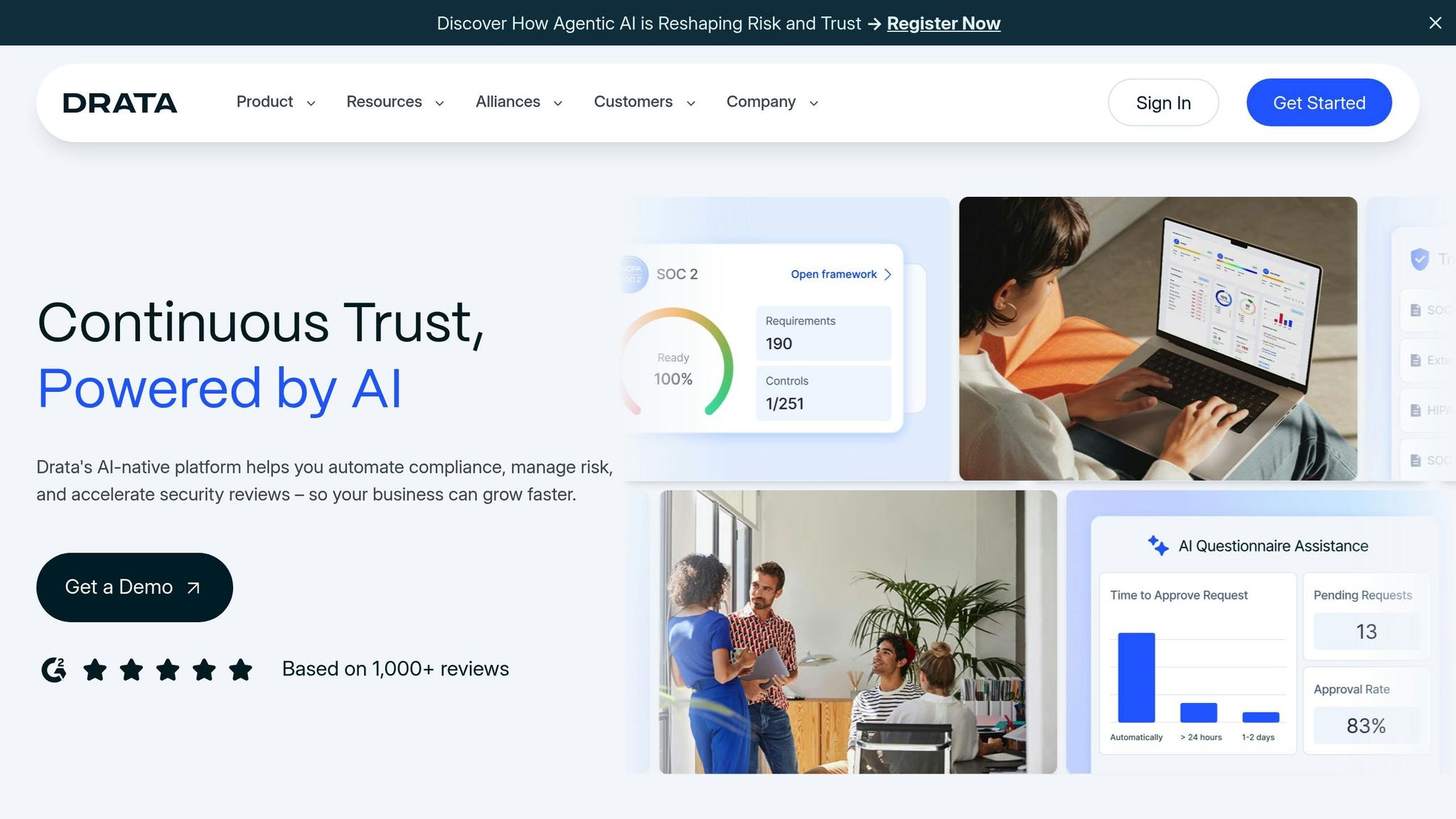
Drata serves as a compliance automation platform tailored for fast-growing SaaS companies and tech organizations navigating complex regulatory requirements. By connecting directly to a company's systems, applications, and infrastructure, Drata automates tasks like control monitoring, evidence collection, and audit preparation. It consolidates controls, policies, risks, and audit-related tasks into a single platform.
Drata’s standout feature is its extensive integration capabilities and enterprise-level reliability. With over 200 integrations and automation covering roughly 70% of compliance controls, the platform is well-suited for organizations that require robust multi-framework support. It’s particularly appealing to venture-backed companies targeting enterprise clients.
Drata primarily serves medium to large startups and established enterprises in industries like SaaS, fintech, healthtech, and edtech. It thrives in DevOps-driven environments where automated controls and real-time risk tracking are essential for compliance.
"Where Drata stands out from competitors is its balance of breadth and brand equity. While it's not the cheapest option, the investment signals maturity and credibility to customers, partners, and investors, making it particularly attractive to companies already operating in or aiming for enterprise markets."
- Bhavyadeep Sinh Rathod, Senior Content Writer, Sprinto
Drata’s approach is ideal for U.S. companies that prioritize comprehensive compliance coverage and enterprise-level credibility. On the other hand, Delve offers a different take on compliance automation, leaning heavily on AI.
What is Delve
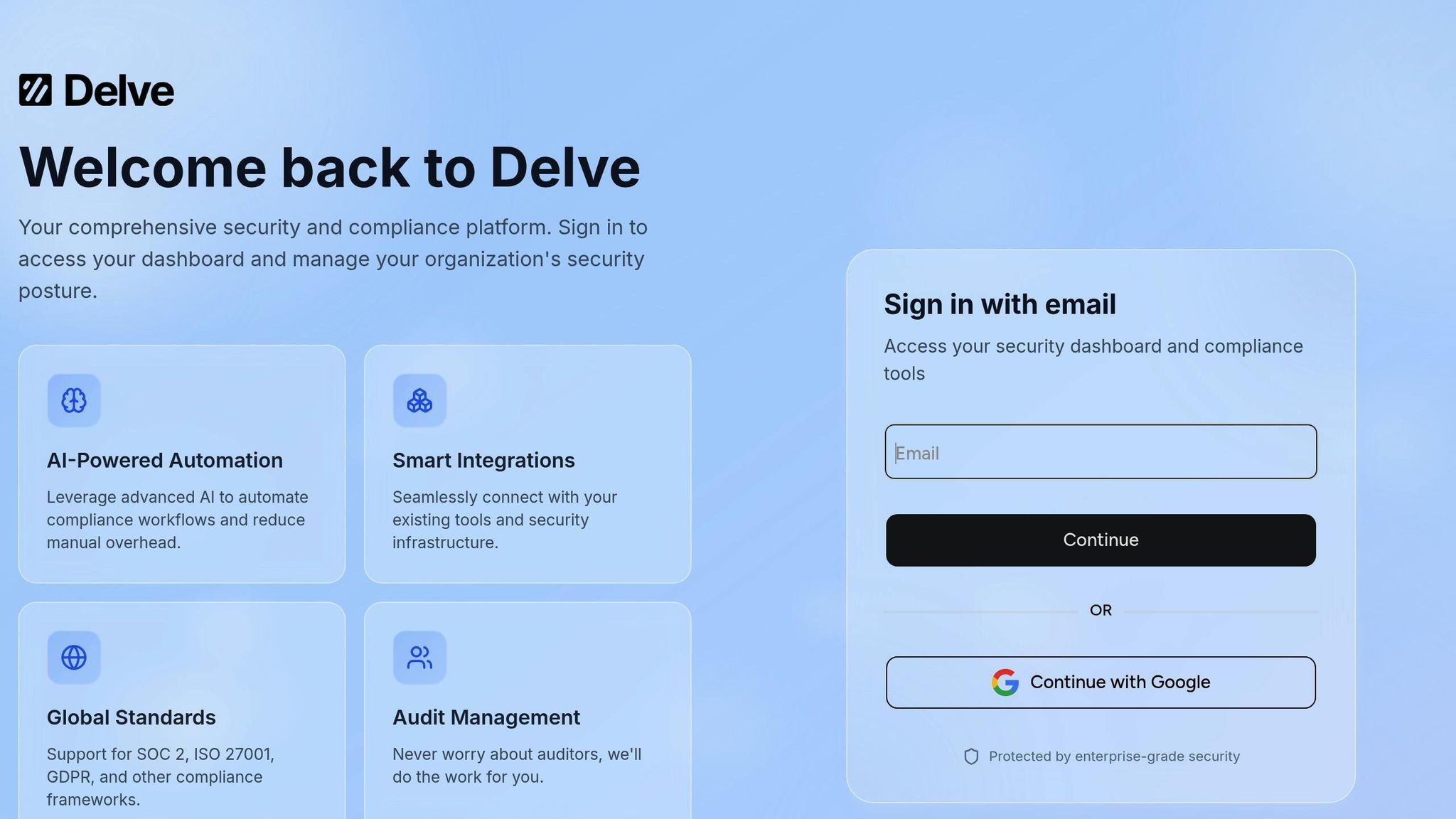
Delve positions itself as an AI-driven compliance platform, focusing on speed and intelligent automation rather than exhaustive coverage. Using AI agents, the platform automates tasks like evidence collection, going beyond the capabilities of traditional APIs. This makes it a strong choice for organizations looking to achieve compliance milestones quickly.
"Delve takes an AI-first approach, targeting companies looking for a fast, intelligent way to achieve compliance milestones, typically SOC 2 or ISO 27001."
- Bhavyadeep Sinh Rathod, Senior Content Writer, Sprinto
Delve’s autonomous AI system is a key differentiator. It handles tasks such as taking audit screenshots, generating reports, autofilling security questionnaires, and performing daily scans of code and cloud infrastructure. This AI-powered system allows Delve to help companies achieve SOC 2 readiness in a matter of days, rather than months.
Initially designed for founder-led compliance projects and small teams seeking quick results, Delve has expanded its focus to include growing companies securing enterprise-level contracts, including with Fortune 500 clients. With around 100 integrations and automation coverage for 50–60% of compliance controls, the platform prioritizes speed and efficiency over breadth. It’s particularly attractive to budget-conscious teams willing to handle some manual tasks in exchange for AI-driven features and personalized support, such as 1:1 Slack guidance.
"Unlike Drata's broad-market, credibility-first approach, Delve presents itself as the cutting-edge, AI-native choice for teams that want to move fast and leverage modern automation."
- Bhavyadeep Sinh Rathod, Senior Content Writer, Sprinto
Delve’s strategy appeals to U.S. companies that value speed and AI-powered efficiency. These contrasting philosophies - Drata’s focus on comprehensive coverage versus Delve’s emphasis on agility and AI - offer a clear framework for determining which platform better suits your compliance needs.
Compliance Framework Support
When choosing a compliance platform, the range and depth of framework support play a crucial role in helping organizations meet regulatory requirements effectively. Drata and Delve take distinct approaches to this, catering to different organizational needs and priorities.
Framework Coverage and Control Mapping
Drata provides broad framework support, covering major standards like SOC 2, ISO 27001, HIPAA, and more. Its control mapping system aligns security controls with specific framework requirements, making the compliance process smoother and more efficient.
Delve, on the other hand, focuses on a narrower set of key frameworks, primarily SOC 2 and ISO 27001. It uses AI-assisted control mapping to address multiple framework requirements simultaneously. This focused approach aims to simplify compliance by concentrating on the most relevant standards. Beyond mapping, the ability to efficiently manage several frameworks is critical for maintaining seamless compliance.
Managing Multiple Frameworks
For organizations juggling multiple regulatory requirements, managing various frameworks is a must. Drata offers a centralized dashboard that allows compliance teams to oversee and track control implementations across different standards. This integrated view provides real-time insights into compliance status, ensuring that any updates to security controls are automatically reflected across all applicable frameworks.
Delve takes a different route, utilizing intelligent automation to identify overlapping requirements between frameworks. This automation streamlines evidence collection and reduces manual effort, speeding up the readiness process.
The decision between these platforms often comes down to whether an organization prioritizes comprehensive, detailed coverage or a more streamlined, AI-driven approach tailored to core compliance needs. Framework support is a critical factor in how each platform fits into an organization’s broader compliance strategy.
Integration Options
When it comes to compliance platforms, integration plays a key role. Drata and Delve both provide extensive integration capabilities, but their strategies for connecting with tools used by modern US businesses show distinct differences.
Available Integrations
Drata supports a wide range of integrations, connecting with major cloud providers like Amazon Web Services (AWS), Microsoft Azure, and Google Cloud Platform. For human resources and identity management, it works seamlessly with tools such as Okta, BambooHR, Workday, and ADP, facilitating workflows for access control. Developer teams can also link up with platforms like GitHub, GitLab, Jira, and Slack, enabling security integration directly within development processes.
Delve, on the other hand, focuses on a more targeted selection of tools essential for compliance automation. It integrates with key cloud providers like AWS and Azure, as well as services like Microsoft 365, Google Workspace, and Salesforce, making it easier for organizations to manage and monitor their data practices.
These integration options highlight the different approaches each platform takes to meet the needs of businesses.
Setup and Configuration
The setup process is another area where these platforms diverge. Drata prioritizes simplicity by offering standardized authentication methods, making connections quick and straightforward. For AWS, it even provides automated configuration processes to minimize setup time.
Delve, in contrast, offers more detailed control, allowing users to tailor data collection and monitoring to their specific needs. A built-in configuration assistant helps guide users through more complex setups. Both platforms also support API-based custom integrations, catering to organizations with unique tool requirements.
These differences in setup and configuration reflect the platforms' distinct approaches to balancing ease of use with customization.
Automation and User Experience
The strength of a compliance platform often lies in how well it reduces manual work and simplifies daily operations. Drata and Delve tackle this challenge from different angles, catering to various organizational preferences.
Automation Coverage
Drata leans heavily on automation to handle evidence collection and continuous monitoring. By linking with connected systems, it automatically gathers evidence, removing the need for manual reviews and saving time for teams.
Delve, on the other hand, places its focus on automating workflows. It streamlines tasks like risk assessments, vendor management, and policy reviews by integrating automated reminders and task routing. This ensures compliance responsibilities are efficiently assigned to the right team members, making process management smoother.
Platform Usability
When it comes to usability and onboarding, the two platforms take distinct approaches. Drata offers a guided setup with intuitive visual dashboards, making integration quick and straightforward. Delve, however, provides a more structured onboarding experience, complete with task lists and workflow tools, which is particularly useful for organizations with more complex internal processes. Both platforms also support mobile access, allowing teams to monitor compliance remotely.
Ultimately, the choice between these platforms may hinge on whether an organization values fast, visually driven automation or a tailored, workflow-oriented approach. This comparison of automation and usability lays the groundwork for examining support and pricing options next.
Support and Pricing
The way a platform handles support and pricing can heavily impact how organizations in the US approach compliance. Drata and Delve each bring unique methods to customer support and pricing, which can shape budgets and operational workflows in different ways.
Customer Support Options
Drata offers a tiered support system. With basic plans, users get access to email support and an extensive knowledge base. Premium plans, however, include additional perks like dedicated customer success managers, real-time assistance, and even a community forum where users can share insights and experiences.
Delve takes a more hands-on approach, focusing on consultative assistance throughout the compliance process. Their model includes dedicated implementation specialists who guide users during the onboarding phase. They also have clear escalation procedures for urgent matters. On top of that, Delve provides compliance advisory services, offering expert advice on interpreting frameworks and implementing controls to help organizations navigate tricky regulatory landscapes.
These differing approaches to support reflect the platforms’ distinct pricing strategies.
Cost and Pricing Models
Drata employs a subscription-based pricing model that adjusts based on factors like company size, the number of users, and integration requirements. Premium features come at an additional cost, but they also offer discounts for annual commitments.
Delve, on the other hand, uses a customized pricing model. Their approach bundles a variety of features and integrations into flexible billing options tailored to the needs of the organization.
When comparing costs, it’s important to consider not just the subscription fees but also factors like implementation time, training, and ongoing maintenance. These elements can significantly affect the overall investment.
sbb-itb-ec1727d
Feature Comparison Table
When looking into compliance platforms, it’s crucial to understand how Drata and Delve stack up against each other. Here’s a detailed breakdown of their features to help organizations make informed decisions.
Side-by-Side Feature Breakdown
| Feature | Drata | Delve |
|---|---|---|
| Compliance Frameworks | Supports key frameworks like SOC 2, ISO 27001, and HIPAA | Focuses on essential frameworks, tailored for highly regulated industries |
| Native Integrations | Offers a wide range of integrations with various tools | Provides targeted integrations designed to enhance its consultative services |
| Cloud Provider Support | Covers major cloud providers with extensive support | Works with major providers, focusing on specialized needs |
| Evidence Collection | Automates evidence collection with options for manual inputs | Combines automation with expert guidance for accuracy |
| Policy Templates | Offers a variety of pre-built templates | Customizable templates to fit specific organizational needs |
| Control Testing | Provides continuous automated testing | Blends automation with periodic manual validation |
| Dashboard Analytics | Delivers real-time compliance insights | Offers in-depth risk and compliance reporting |
| Audit Preparation | Enables self-service readiness for audits | Includes expert consultation to guide audit preparation |
| User Management | Uses straightforward role-based access control | Features advanced permissions for complex structures |
| API Access | Supports API integrations for flexible connectivity | Offers tailored API endpoints for specific use cases |
| Mobile Access | Provides native mobile apps for monitoring | Delivers mobile-optimized web access for flexibility |
| Training Resources | Includes a knowledge base and community support | Offers structured training and resource materials |
| Implementation Time | Known for quick deployment with an easy setup process | Setup may take longer due to its consultative approach |
| Support Channels | Provides support via email, chat, and phone | Offers dedicated support through select channels |
| Pricing Model | Subscription-based with flexible billing options | Custom pricing tailored to organizational needs |
| Contract Terms | Flexible contract terms | Typically works with standardized annual contracts |
| Setup Fees | Standard setup included in the service | Setup fees may apply based on support level needed |
This table highlights the distinct strengths of each platform. Drata excels in automation and self-service, making it ideal for organizations that prefer managing compliance internally. On the other hand, Delve stands out with its consultative, hands-on approach, catering to businesses in highly regulated industries that require expert guidance.
The right choice ultimately depends on your organization’s compliance needs, internal resources, and regulatory requirements - not just the number of features offered.
Which Platform to Choose
Selecting the right compliance platform depends on your company's size and growth trajectory. Based on our analysis of integration options, automation capabilities, and pricing, this section breaks down which platform - Drata or Delve - might be the best fit for your organization. Each caters to distinct market needs, so understanding where your business stands can save both time and money.
For Small Startups
If you're running a founder-led startup, Delve offers a streamlined path to compliance. This platform is designed for startups aiming to achieve SOC 2 or ISO 27001 compliance quickly without navigating the complexities of enterprise-level systems.
Delve's pricing ranges from $12,000 to $20,000 per year, making it a budget-friendly option for early-stage companies. While it requires some manual processes, it balances affordability with functionality.
What sets Delve apart is its AI-first approach combined with 1:1 Slack support, which appeals to tech-savvy teams that value speed and modern workflows. However, it’s best suited for startups with relatively straightforward tech stacks. If your team plans to scale rapidly or take on multiple compliance frameworks, Delve’s limited integration and automation capabilities could become a bottleneck.
For startups with simpler needs and a focus on affordability, Delve may be the right choice. But for companies with growing demands, a more robust solution might be necessary.
For Growing Mid-Market Companies
Mid-market companies face more complex compliance challenges, often requiring support for multiple frameworks and advanced automation. For these organizations, Drata is a better fit. With support for over 20 compliance frameworks, including SOC 2, HIPAA, PCI DSS, and GDPR, Drata provides the flexibility to expand without having to start over.
Drata's pricing for small to mid-sized businesses ranges from $15,000 to $25,000 per year. While the upfront cost is higher, the platform’s extensive automation tools and broad integration options can significantly reduce manual work as your team grows.
One of Drata's standout features is its ability to centralize workflows for multiple stakeholders - whether in engineering, security, or HR - through a unified dashboard. This alignment becomes increasingly important as companies scale. Additionally, Drata’s established market presence and investment backing add credibility, particularly for businesses targeting enterprise clients.
If your organization requires multi-framework compliance and needs to accommodate diverse teams, Drata provides the tools to scale efficiently.
Decision Guidelines
Here are some quick pointers to help you decide:
- Choose Delve if you’re a founder-led startup looking for rapid SOC 2 or ISO 27001 compliance, working with a simple tech stack, and prioritizing affordability combined with AI-driven support.
- Choose Drata if you need multi-framework compliance, robust automation, extensive integrations, and tools to manage multiple internal teams.
It’s worth noting that while Delve’s lower entry price is attractive, its lack of built-in features like mobile device management, security training, or incident tracking may require additional third-party tools, potentially narrowing the cost gap with Drata. On the other hand, Drata’s modular pricing can increase quickly if you add more frameworks, integrations, or user licenses.
The decision ultimately hinges on aligning your current resources and growth plans with each platform’s strengths. Startups focused on speed and cost may find Delve a better match, while companies with more complex compliance needs and scaling ambitions are likely to benefit from Drata.
Cycore's GRC Tool Administration Services
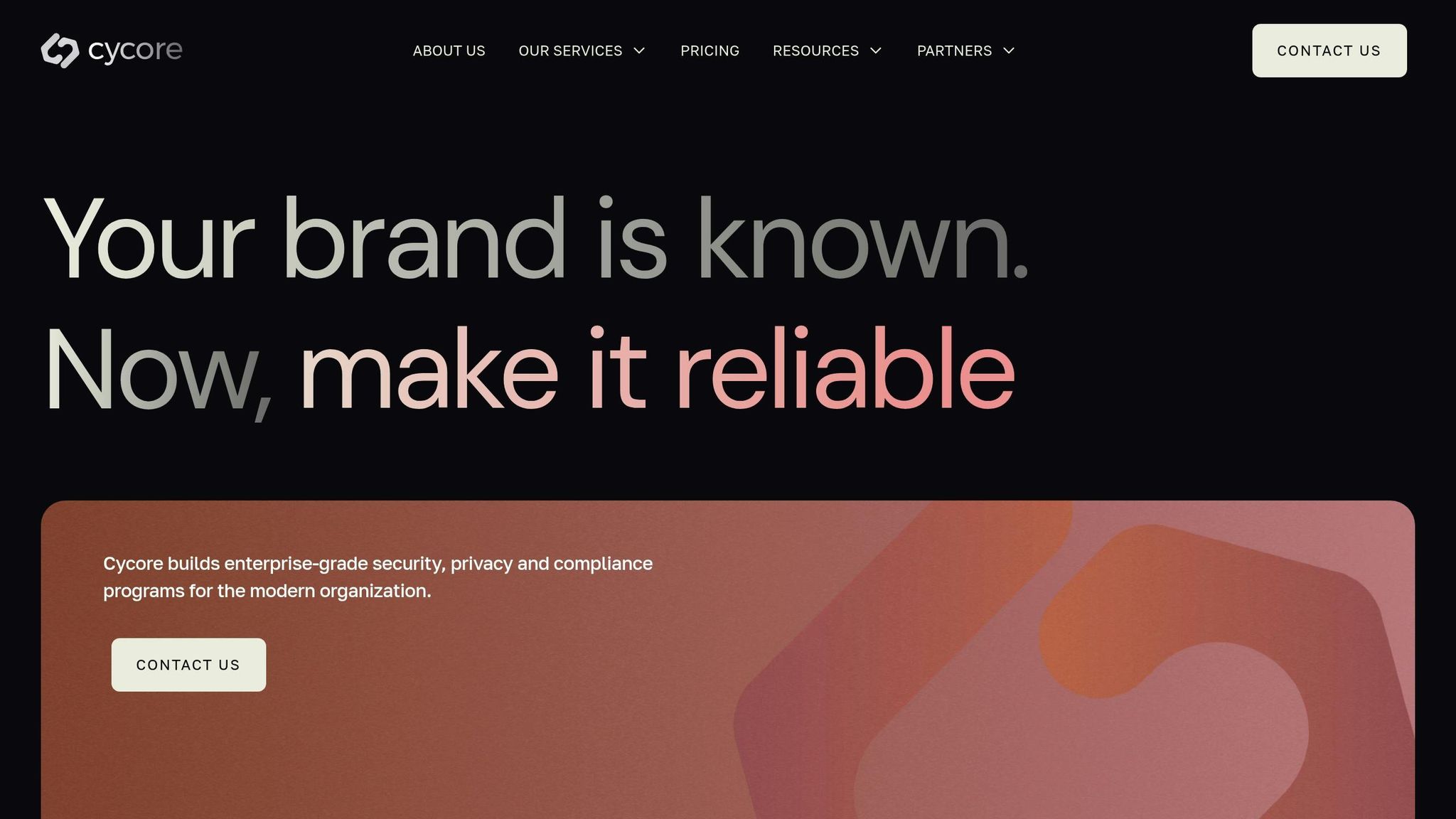
Choosing the right compliance platform is just the beginning. Many organizations find themselves overwhelmed when it comes to managing the day-to-day administration, handling multiple frameworks, and making the most out of their GRC (Governance, Risk, and Compliance) investment. This is where specialized services, like those provided by Cycore, can make all the difference - bridging the gap between platform features and real-world implementation.
Cycore's Compliance Management Services
Cycore Secure delivers tailored GRC tool administration services designed for top compliance automation platforms. Their approach blends Virtual CISO (vCISO) services with hands-on GRC tool management, giving organizations both strategic guidance and practical execution.
Cycore offers service tiers to meet the unique needs of different businesses:
- Start-up Plan: Perfect for companies at the beginning of their compliance journey, this plan includes vCISO support for one compliance framework and basic GRC software management.
- Mid-Market Plan: Designed for growing organizations, this plan supports multiple frameworks and offers advanced GRC administration for up to two tools.
- Enterprise Plan: Built for larger organizations, this plan includes full vCISO and Virtual Data Protection Officer (vDPO) services, custom integrations for up to four platforms, and dedicated vDPO support for GDPR compliance.
Cycore’s services go well beyond simple setup and configuration. They manage critical tasks like vulnerability reporting and audit preparation while also developing custom security roadmaps tailored to your platform's capabilities. This comprehensive approach ensures your compliance tools are not just functional but optimized to support your broader strategy.
Benefits of Working with Cycore
Partnering with Cycore for GRC administration solves many of the common pain points organizations face when managing compliance platforms. One of the biggest advantages? Cost efficiency. Compliance platforms can get expensive quickly as you add frameworks, integrations, or user licenses. Cycore's expertise ensures you’re not paying for features you don’t need while still meeting all critical compliance requirements.
Their deep experience also provides a practical edge. Instead of relying solely on vendor claims, Cycore offers objective guidance rooted in real-world implementation outcomes. This means you get recommendations that work, not just what’s written in the marketing materials.
Another standout benefit is scalability. As your business grows - from a startup to a mid-sized company - your compliance needs will inevitably become more complex. Cycore’s tiered service model ensures your compliance support evolves alongside your business, giving you the flexibility to scale without missing a beat.
For US-based companies, Cycore’s domestic presence is a game-changer. Frameworks like SOC 2 and HIPAA come with specific US regulatory requirements, and having a local team ensures quicker response times and a better understanding of these nuances. Whether it’s answering compliance questions or aligning with American business practices, Cycore’s US-based expertise is a significant advantage.
Most importantly, Cycore helps businesses achieve compliance program maturity faster. Their experience across numerous client implementations allows them to anticipate challenges, recommend best practices, and establish sustainable processes that grow with your organization. This kind of expertise is invaluable in ensuring long-term compliance success while avoiding costly missteps.
Final Thoughts
Choosing between Drata and Delve comes down to your organization’s specific compliance needs, growth stage, and available resources. Both platforms deliver strong automation capabilities but cater to different audiences with unique approaches to compliance management.
When evaluating options, think beyond just the platform itself. The total cost of ownership - including setup, ongoing management, and the expertise required - plays a critical role in determining the success of your compliance program. Simply having the right tool isn’t enough; effective administration and strategic oversight are just as crucial. Let’s break down the key considerations.
Key Takeaways
Match the platform to your business stage. Startups often need tools that emphasize simplicity and quick compliance, while mid-sized companies may benefit from more advanced automation and support for multiple frameworks. Enterprise-level organizations, on the other hand, typically require platforms with extensive customization and integration capabilities to handle complex compliance environments.
Focus on integration, not just features. Even the most advanced platform won’t help if it doesn’t fit into your existing tech stack. Look for solutions that integrate seamlessly with tools you already rely on - whether it’s cloud providers like AWS or Microsoft Azure, or business apps like Slack and Jira. Poor integration can lead to manual workarounds, undermining the efficiency automation promises.
Account for the hidden costs of self-management. While Drata and Delve offer powerful automation, effective use requires expertise. Many organizations underestimate the time and resources needed for setup, ongoing maintenance, and audit preparation. This is especially true for US businesses navigating frameworks like SOC 2 Type II, where staying audit-ready requires year-round effort.
Geographic proximity matters. US-based companies can gain an edge by partnering with platforms that understand American compliance requirements and business practices. Alignment in time zones, familiarity with US regulations, and cultural understanding can enhance support quality and improve outcomes.
The compliance automation space is evolving quickly, with new features and capabilities appearing all the time. Instead of focusing solely on feature comparisons, prioritize finding a platform that aligns with your growth trajectory and ensure you have the right expertise - whether in-house or external - to make the most of your investment and sustain compliance over the long term.
FAQs
What are the key differences between Drata and Delve in addressing compliance automation for startups and enterprise businesses?
Drata and Delve each bring something different to the table, catering to specific business needs. Drata is a great fit for fast-growing SaaS companies and tech organizations that need to tackle enterprise-level compliance. It offers powerful features and the ability to scale, making it a solid choice for businesses dealing with complex regulatory challenges.
Delve, meanwhile, emphasizes speed and automation, leaning heavily on its AI-driven approach. It's especially well-suited for founder-led startups and companies that want a streamlined way to handle compliance. Over time, Delve has grown its capabilities to support businesses aiming to secure large enterprise contracts.
While both platforms aim to simplify compliance management, their strengths align with different stages of growth and operational goals.
What should I consider when choosing between Drata and Delve for SOC 2 or ISO 27001 compliance?
When choosing between Drata and Delve for SOC 2 or ISO 27001 compliance, it's essential to think about your organization's specific needs and the compliance standards you're aiming to meet. SOC 2 emphasizes how service organizations handle customer data securely, while ISO 27001 is a globally recognized standard for managing information security systems, suitable for any type of organization.
Drata offers tools to support multiple compliance frameworks, including SOC 2 and ISO 27001, with strong automation features and a variety of integrations. Delve also focuses on these compliance areas but may cater to more specific needs depending on your organization's goals. Take the time to compare their features, ease of use, and integration options to see which platform best fits your compliance objectives.
How do Drata and Delve's integration features affect their performance in various tech environments?
Drata and Delve differ significantly in how they handle integrations, which can greatly impact their effectiveness in various tech environments. Drata shines with its ability to integrate with around 120 tools, including major players like cloud providers, HR systems, and developer platforms. Even better, it automates roughly 70% of controls, reducing the need for manual work. This makes it a strong contender for businesses juggling compliance across multiple systems.
Delve, meanwhile, connects to over 100 tools but often requires manual uploads or workaround solutions for less commonly used applications. Its automation covers only about 50–60% of controls, which means more manual input as compliance demands grow. This setup might appeal to smaller teams or organizations with a more focused compliance scope.



